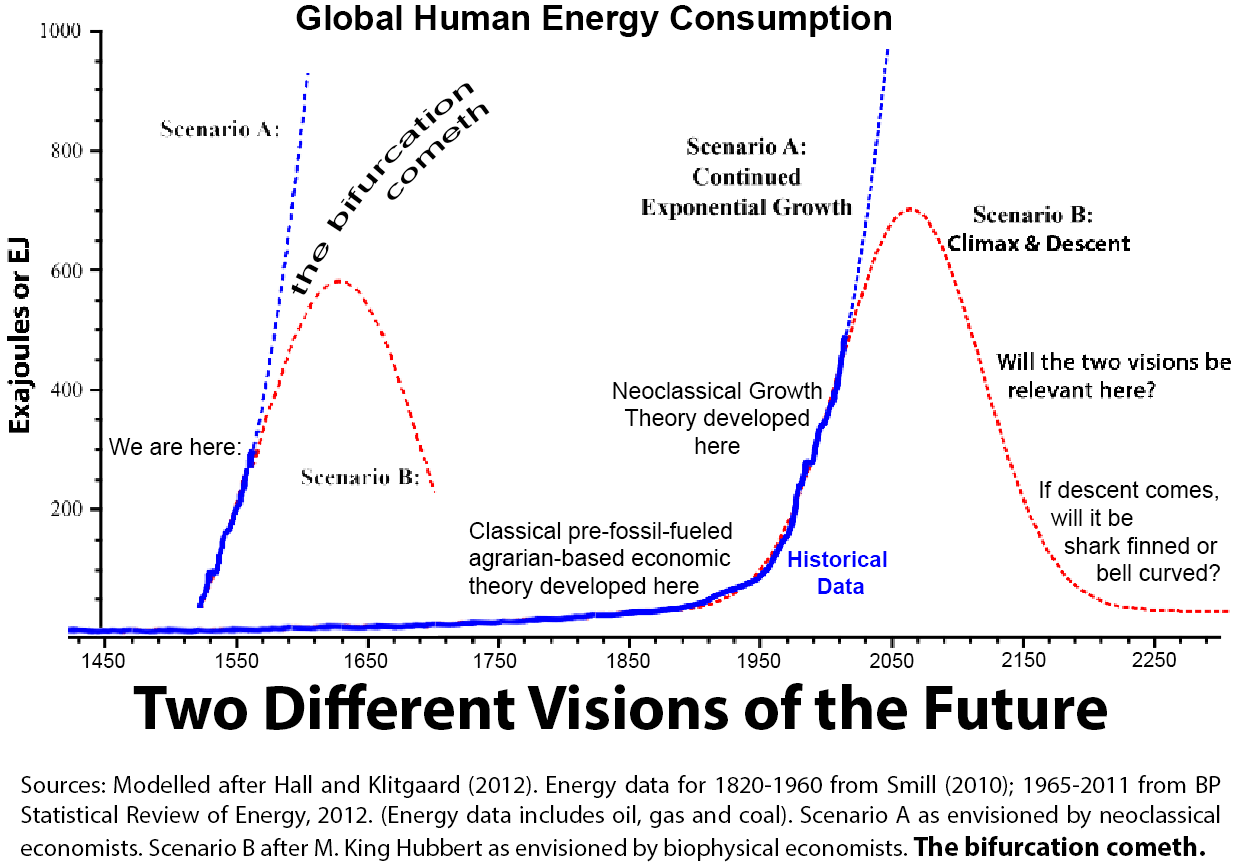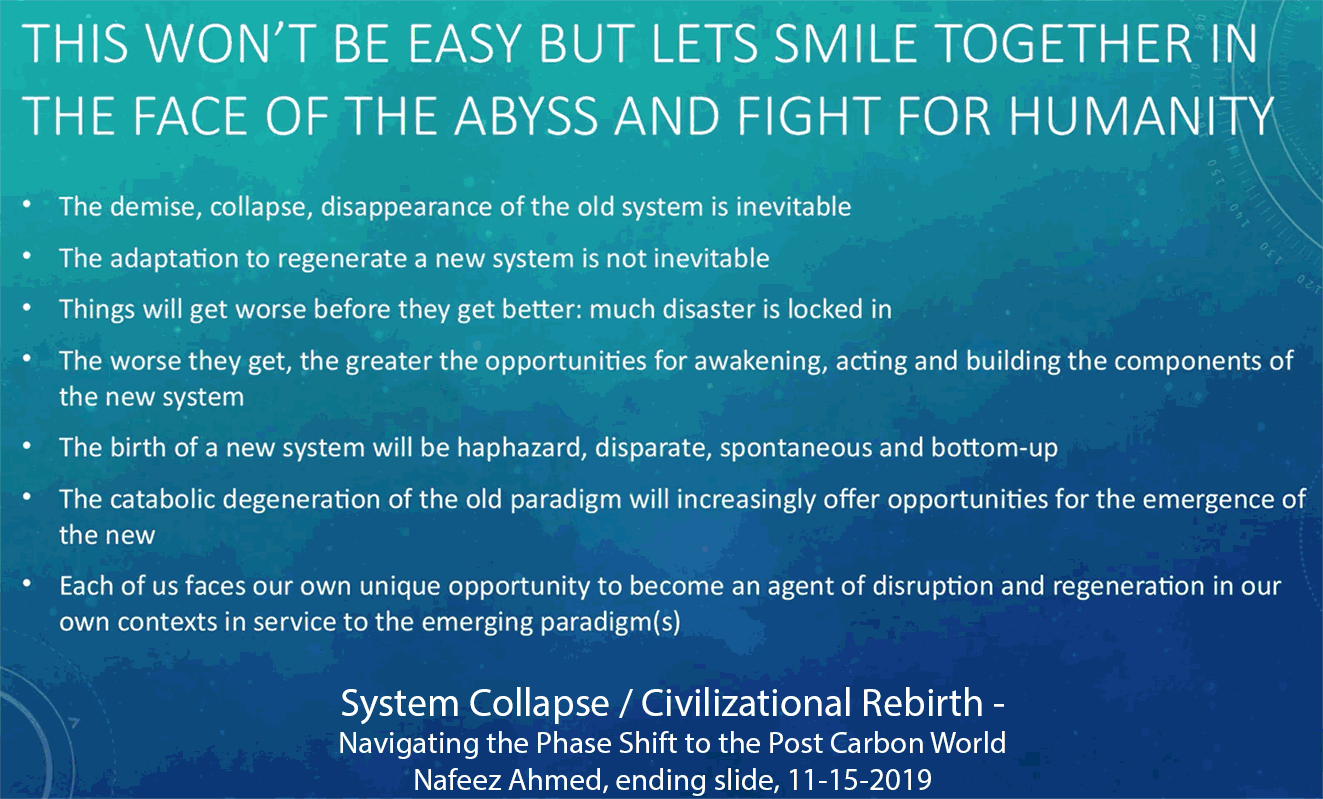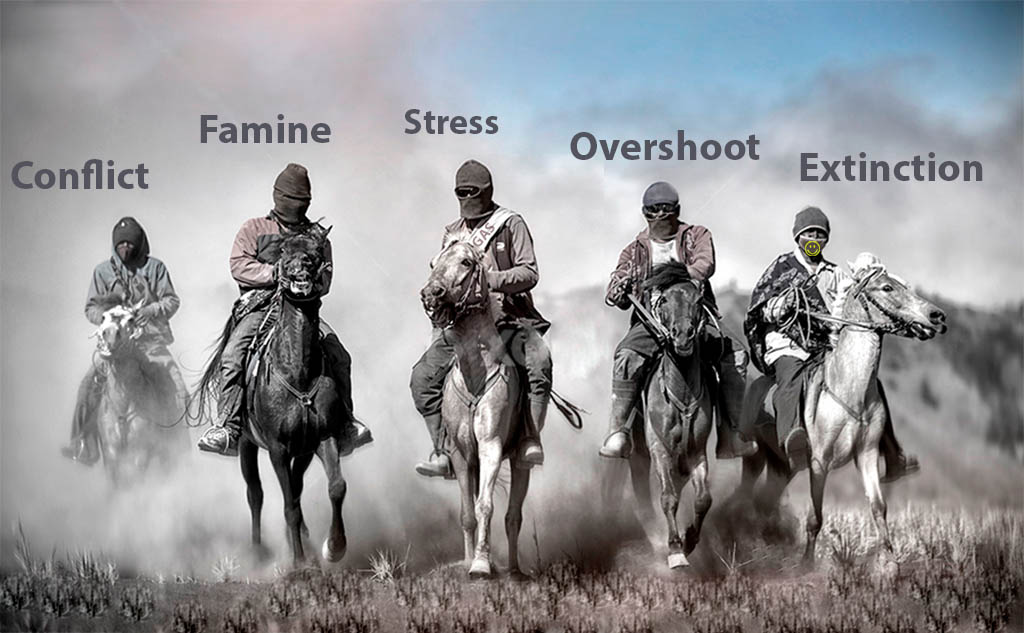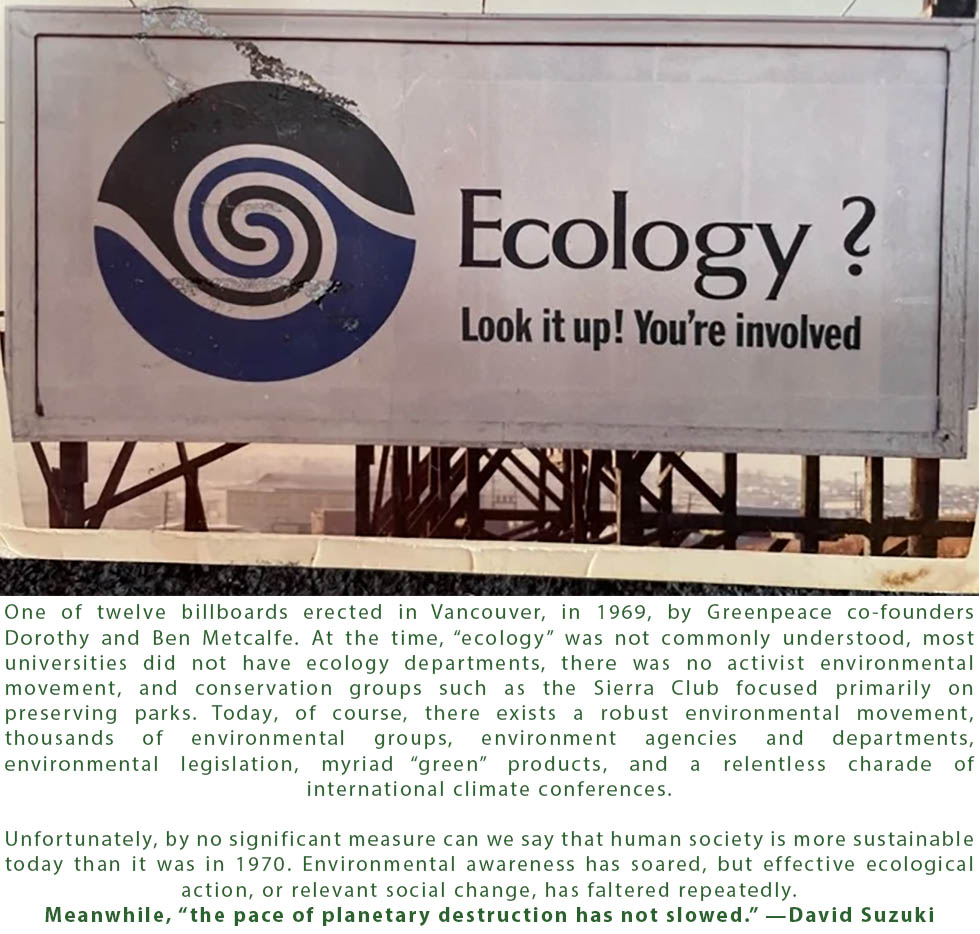
TUESDAY, JAN 7, 2020: NOTE TO FILE
Updated 1/24/20 I-3-G-3-iii; 1/31/20 V-3-C-2; 2/1/20 added Nafeez Ahmed slide; 2/10/20 X; 2/18/20 IV-3-A-3-ii; 2/19/20 IV-3-A-1; IV-2-C-4-iv; 2/21/20 Boiling it down; 2/22/20 II-2-A; 2/26/20 II-4-B-1 & 2, 2/27/20: II-4-D-1-i-7; 2/28/20: Epilogue; 3/4/20: abstract, Lovelock quote; 3/5/20: Rees quote; 3/10/20: I-3-B; 3/12/20 Great Acceleration note; 3/16/20 Hagens quote; 3/20/20: I-2; 4/9/20 II-4-D-5; II-4-E-1,2; 4/10/20
II-4-D-1-i-7-e; 4/17/20
II-4-F-1; 4/20/20 note added; 4/21/20 Listen to Mother graphic; 5/5/20
VIII-10-D; Know then the Monetary Culture; 5/10/20 Costanza quote; 6/20/20 Milton Friedman quote; 8/4/20 Saint-Simon quote; Huzar quote; 8/11/20 Subnote; 8/24/20 Ingo Piepers quote; 8/30/20 Rex Weyler quote; 9/9/20 magic number seven note; 9/15/20: birth-off link; 9/29/20 Rob Mielcarski rewrite; 10/1/20 Subnote; 10/3/20 City/Town size defined; 10/7/20 Reality Be-In option; 10/16/20 Viable farm design; 12/10/20 Rees quote;
12/30/20 I-1-A;
1/1/21 I-1-A;
1/5/21 I-3-I;
1/10/21 Alternative mind map;
1/23/21 IV-1-A-5-ii;
1/31/21 Our Predicament;
2/19/21 The Human Predicament in Short;
2/28/21 Spinoza quote;
4/20/21 Clear-cut animation;
5/11/21 22nd century note;
5/20/21 Modern mythology note; 7/30/21 Rees quote; 8/23/21 On revolution; 9/18/21 Revolutionaries; 12/25/21 Rex Weyler quote; 2/4/22 Preface; 4/15/22 Rees quote; 8//24/22 Rees quote; 10/3/22 renormalization video to view; 12/4/22 venerate all life; 2/27/23 renormalize rules; 4/8/23 If childhood mortality minimized; 6/8/23 Optimum human population; 10/4/23 the New World Order;

“Systems can’t be controlled, but they can be designed and redesigned.”
— Donella Meadows, Thinking in Systems: A Primer
Preface: The Eightfold Insight
(a concept poem for humanity)
WICKED PROBLEMS (problematiques) exist.
The WICKED PROBLEM (carrying capacity overshoot) MAY REQUIRE a seemingly WICKED SOLUTION.
Multiple WICKED SOLUTIONATIQUES exist (contraction, HUMILITAS, renormalization...).
But MODERN humans SEEM TO FIND REAL SOLUTIONS UNTHINKABLE.
To LOVE and UNDERSTAND is to PERSIST.
To THINK (with the heart-mind) is to LISTEN.
LISTEN (become tone-deaf to human prattle).
LISTEN! (To Nature who has all the answers.)

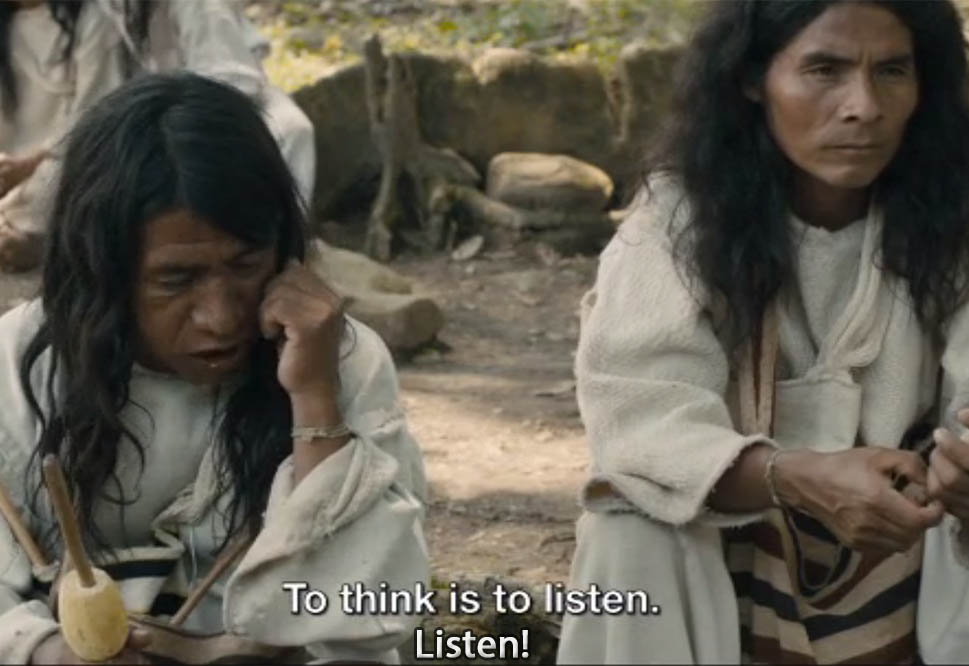

Short Intro Outline:
- Modern Techno-Industrial (MTI) society, now global, is a draw-down growth dynamic empowered by ancient sunlight (fossil fuels).
- Modern techno-industrialized humans are committed to living globally as draw-down hunters and gatherers of energy and matter/minerals/resources (as energy enables) which nature can provide in limited quantity on a geological time scale.
- We are using peat from bogs (formed over last 12k years) far faster than peat is forming.
- We are mining/eroding soils far faster than soil forms from parent material.
- We are drawing down some aquifers far faster than they refill.
- We are using fossil fuels far faster than they are being deposited/stored in Earth's crust.
- We are using/dissipating minerals far faster than geological processes concentrate them.
- We are using more finite resources in one lifetime faster than are formed in hundreds to millions of human lifetimes.
- We are producing waste products (e.g. N, P, CO2, toxins, plastic) far faster than they can be assimilated.
- Modern techno-industrial monetary culture is not remotely sustainable.
- Some energy production apart from food is sustainable:
- Hydropower (some hydroelectric power may be producible for centuries or millennia, but only if some large-scale industrial production and knowhow persists).
- Wind can grind grain and drive stationary machinery (and sailing ships).
- Solar can cook food and provide some heating (solar PV may be too high tech to maintain).
- Geothermal, in some regions.
- Biomass, e.g. wood, within limits.
- Some industrial production is sustainable.
- Salt used to flavor or preserve food eventually is washed to the sea.
- There are flat areas just below king tides that can be bermed and seawater let in during king tide, then closed off and the seawater allowed to solar evaporate.
- The encrusted salt can be gathered using human power and transported by sailing vessel to ports from which it can be transported overland as a trade item to inland settlements, perhaps where cotton blooms and bolls.
- The salt consumed would be excreted and soon (in geological time) would be transported in run-off back to the sea.
- Salt production in an amount humans are likely to need/want is sustainable.
- Scavenging ruins is not sustainable.
- Salt used to flavor or preserve food eventually is washed to the sea.
- Pretty much everything else being extracted/produced by industrial society, in quantities even remotely close to what is being consumed today (including food, wood, water) is not viable.
- Someday there will be landfill mines, but landfill mining will not be sustainable, therefore we should consider seeking out the condition now that will come anyway.
- Some energy production apart from food is sustainable:
- To continue, to persist as the millennia pass, humans need to understand that MTI civilization is finished, but that its being finished has nothing to do with climate change (a symptom of overshoot) that will intensify the Anthropocene mass extinction event, but is not the cause of it.
- Non-MTI humans alone can transition (likely this century if ever) to living on current sunlight and long term sustainable energy/matter flows.
- Living within complex yet ecolate societies would not violate any known laws of the universe.
- The adaptations needed (e.g. foresight intelligence, atribal abelief) would involve guessing what might actually be sustainable (by design), and then testing thousands of guesses (instead of one global MTI guess) on a smaller than global scale (e.g. tens of thousands of watershed management unit designs) to find out what works by listening to Nature who has all the answers.
- Our experiment in complex society isn't working for us. We need an apolitical, non-tribal global governance system to manage human demands on Nature's resources, i.e. to limit human population, consumption, and use of technology to what works, which must include prevention of empire building and unsustainable extraction of (trade in) environmental resources.
- We need to degrow our population to something in the 7 to 35 million range globally, normally live in band-sized communities (20-50 members) in a region of other communities (a district of less than 13 communities) within a watershed management unit (WMU, 20+k globally of less than 20 districts) with whom genes and memes are exchanged. Per capita consumption would depend on local environmental productivity and trade items, if any, which could include sea salt from coastal WMUs for fiber from inland WMUs, to perhaps up to 50Wh/person/day of electrical services, e.g. LED light, having perhaps a lower emergy yield ratio than candles or oil lighting, if some WMUs with high energy sources (e.g. hydroelectric) can continue to manufacture such technology in exchange for imported items such as food, fiber, and wood. We should plan on it taking 8-20 generations to renormalize, to relearn how to be functional humans, to recover from our behavioral sink condition, if possible.
- Our ancestors, who lived sustainably (unlike us, as evidenced by their persisting as tens and hundreds of millennia passed), were normal animals, adaptive K-strategists, observational ecologists, and agents of the Earth, who did not fail to live properly with the planet (thereby becoming ancestors).
- We moderns are 3 (very few have grandparents who were nomadic foragers) to 300 generations (e.g. Indo-Europeans) removed from them, and cannot know what a normal human is.
- We can consider what those who have met them can tell us, e.g. a recent video talk by an anthropologist is as close as most moderns will come to knowing what we do not know, and by viewing it we may become less cluelessly unaware of the past lives of humans.
- In the last 375k years, over 100 billion humans have lived evolvable lives, and we cannot know or grok them as we humancentric ones know not the nature of things.
- Our descendents, in another 8 to 20 generations of endeavor to renormalize, may be able to again know themselves to be normal, to again live properly with the planet as evidenced by their ability to persist (evolve genetically and memetically).
- Our failure to foresee the difficulty of renormalizing will be the death of us.
- No mass movement, no deep transformation (but maybe a minority movement of a few voting with their feet), can be instigated to bring about the end of humanity's non-viable overdenisty/overconsumption overshoot condition.
Those who would renormalize to persist will need to:
- Live in groups of no more than 50 others so repeat interactions can select for renormalizing as copykittens living in normal sized groups (mean size of ancestoral groups of foragers was about 28 per community/camp/band with a similar number of interacting, interrelated bands in a region, e.g. WMU).
- Members of a community may ask to join another group by mutual agreement provided the number of 50 is not exceeded.
- Communities may rendezvous by prior agreement to exchange genes (by exogamous mate selection) and memes (information).
- The number of interacting groups in an area (defined by watershed boundaries) can be no more than 50 groups.
- Two, three, to all bands may periodically, by mutual agreement, rendezvous at a central site for a time limited by food brought to the site.
- Rendezvous sites may also be settlements for mobility impaired elders whose families see to provisioning them with food and such care as the community of elders may require between rendezvous.
- The up to 50 bands inhabit an area such that the environmental productivity of 20 percent or less is enough to support them.
- During the birth-off transition period, more than can be supported will require long-term stored food.
- By the end of the 50 year birth-off, watershed management units with less than 25 communities will join to form a larger watershed management unit.
- During the first 200 years of the renormalization phase, no one will trespass on Nature's 80 percent, nor outside their watershed management's 20 percent.
- Following the initial 500 year renormalization phase, interwatershed trade and travel will be experimentally phased in.
- If the occupants of any watershed management unit (WMU) are attacked or violate rules I or II, expand into Nature's 80 percent or into a neighboring human habitat area (WMU), all other humans living in other WMUs, beginning with those closest, must cooperatively project forces to force compliance or defeat attackers.
- The maximum population of a failed WMU is 2,500 (50x50), of which 1,500 adults might be potential combatants determined to fight to the death, so forced intervention will not require more than 100 WMU militia platoons of 50 members in three to four squads (5,000 armed combatants) located some days travel away.
- If (when) a WMU attacks another WMU and there is a payoff, a remnant population would join them and they would repeat the pattern, so rule IV is civilization's immune system needed to combat pathological forms (e.g. modern techno-industrial expansionist form of civilization) that will arise.
- To change the form of a civilization (to a viable one) is assumed to be non-trivial, likely to take 8 to 20 generations, and the difficulty may be impossible to overestimate, so if rules I-IV seem extreme, they may not be exreme enough.
- Additional restrictions may be needed, may have to be self-imposed.
- Such rules as I-IV need to be inforced as failure will have the continence of the Anthropocene mass extinction event as outcome (and likely human extinction within 5000 years) unless modern humans renormalize as evolvable K-strategists (as their ancestors who persisted were for about 500 million years).
- All humans do not need to renormalize, but only enough need to, by self-organizing based on shared foresight intelligence (which is not belief based).
- Per Nature's rules of the game, extinction is allowed.
- If there are 25k WMUs globally that average 28 communities each (with 28 residents each), then the planetary population would be 19.6 million, within the 7-35 million estimate if humans cease to cause species extinction or prevent new species from evolving.
- Humans don't get to decide/choose our maximum population.
- When Mother says we are causing no further extinctions nor preventing respeciesation, then our population will be compatible with our living properly with the planet as the millennia pass.
- Crazy ideas are outside of consensus thinking (what is thinkable).
- For example, the above and below, with occasional claims that are thinkable.
- The Gandhian Constitution, written in 1945 to 1946 by a Gandhian economist based on the writtings of M.K. Gandhi as interpreted as alternative to the Indian Industrial Civilization (IC) one that currently is the foundation for elites ruling India to serve the monetary culture.
- As IC fails, the Gandhian Constitution is becoming thinkable again (in India).
- Crazy ideas may become thinkable elsewhere as modern humans come to recognized their denormalized (humans of NIMH) state.
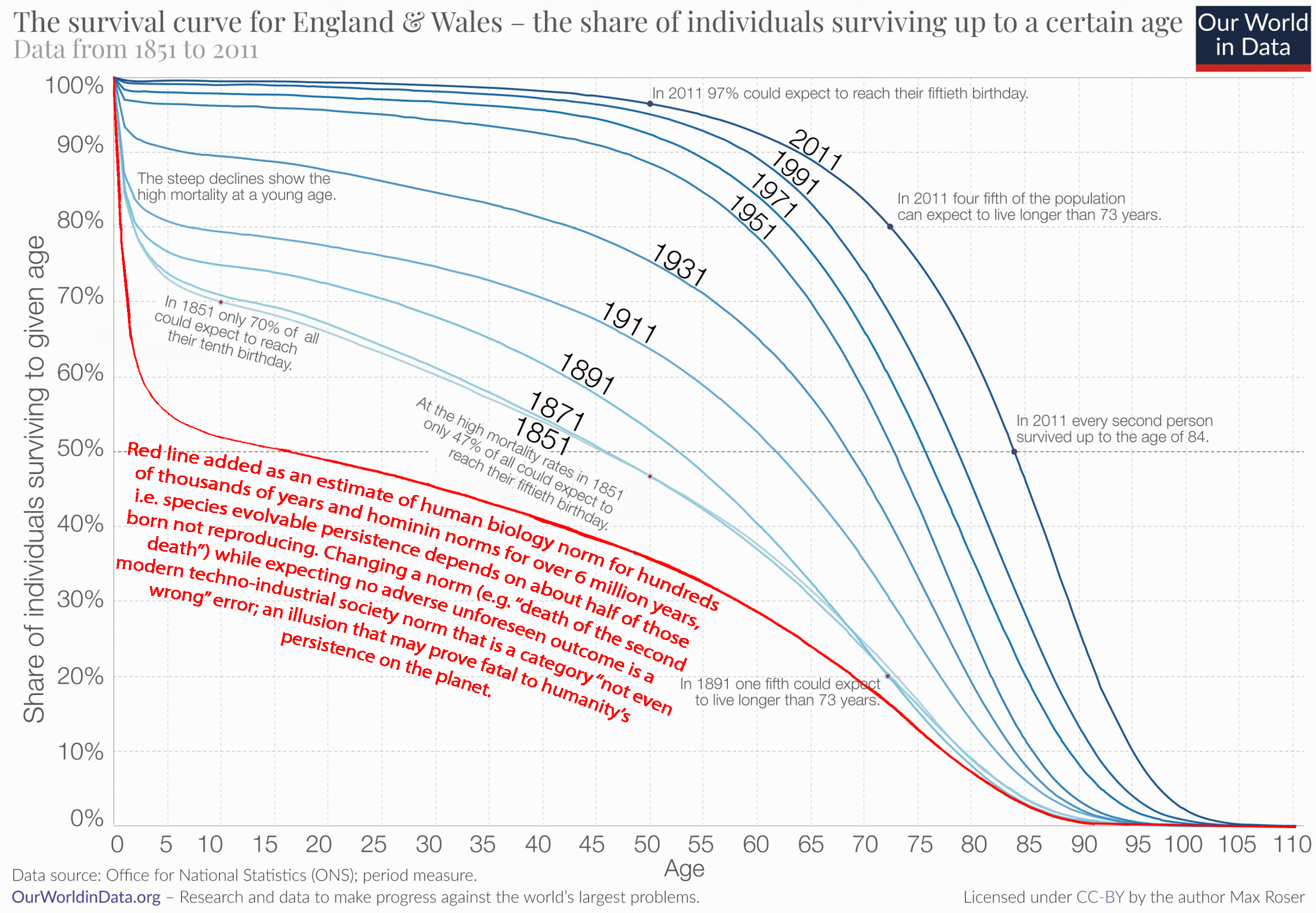
I II III IV V VI VII VIII IX X

Design for a Viable Civilization
To Respeciate the Biosphere in Less Than 10 Million Years
'For the first time in history a conviction has developed among those who can actually think more than a decade ahead that we are playing a global endgame. Humanity's grasp on the planet is not strong. It is growing weaker. Our population is too large....' — Edward O. Wilson, Half Earth: Our Planet's Fight for Life 2016
'If the habitability of Earth is to be preserved for all our descendants, we have no choice but to end and reverse population growth, limit our consumption of resources, replace damaging technologies with gentler ones, and attempt to design a better, more sustainable civilization.' —Anne H. Ehrlich, Paul R. Ehrlich, Too Many Rich Folks 1989
The basic proposition is 'that continued industrialization and population growth will only lead to increased stresses... A growing inclination to face the problems of growth has appeared among engineers, businessmen, social scientists, and politicians. Seminars, panel discussions, and debates have proliferated on the future of economic growth. But questioning the present trends of economic growth is much easier than finding answers to the questions of when, how, and for whom economic growth should stop'. —Jay Forrester 1973. [Therefore by the 1990s most academics and intelligentsia pundits came to believe that The Limits to Growth/World Dynamics studies made predictions that had failed to materialize and so the concerns raised could be dismissed, ignored, marginalized, obfuscated, denied, and those who still have them could be vilified, demonized, and ridiculed as chicken littles with computers.]
Alternatives to continued business-as-usual (BAU, a myopic and unchanging worldview) 'will involve fundamental changes in laws, values, religious attitudes, and expectations. Years of debate lie ahead in synthesizing a new political rationale that is compatible with a finite world in which human problems can not much longer be solved by expansion. The challenge is to design a path for both industrial and underdeveloped nations through the transition from growth to a viable equilibrium. Time is short. We must move quickly if we are to keep future options open'. —Jay Forrester, World Dynamics, 2nd ed. 1973, from preface to 2nd edition.
Albert Schweitzer's personal paradigm shift from human to Nature centric occurred in 1915 when the words Ehrfurcht vor dem Leben [Venerate all Life] came to him as the solution to the question of on what principle would a viable civilization have to be underpinned by? 'Man has lost the capacity to foresee and to forestall. He will end by destroying the earth' were thoughts occasioned by the destruction of beehives due to pesticide (technology) misuse. 'Good consists in maintaining, assisting and enhancing life, and to destroy, to harm or to hinder life is evil' is a life-affirming view, an algorithm for living properly with the Earth (world system). 'Thought cannot avoid the ethical or reverence and love for all life', or thought can deny, deny, deny as it does now, and humans can go extinct. 'I am life that wills to live in the midst of life that wills to live' is the hominin condition (there being only one hominin, the displacer, left). Descartes reasoned that the only thing he knew, could be sure of, was that he could think and therefore existed, a tale told by an idiot (i.e. hu-man). An alternative story is that all organisms live and behave in such a way as to go on living. All life is Gaia, whose body those who would persist must live properly in. To live is to maxmize empower (MEP/MPP/MePP) of the system (ecological unit to biosphere) that one is a product of and depends on (and therefore serves to persist). A cancer cell is a pathological form of life not to be venerated, and death is essential for life (evolution), so venerating all life includes, at times, death. As a civilization, we idiots need to shift from human centric short-term self interest to venerating the evolving life/death system we would be part of (Nature) were we to persist.
'Here’s the essence of our planning failure: we have built up civilization to a scale that can temporarily be supported by finite and polluting energy sources, and we have simply assumed that this scale of activity can continue to be supported by other energy sources that haven’t yet been developed or substantially deployed. Further, we have incorporated limitless growth into the requirements for civilization’s success and maintenance—despite the overwhelming likelihood that growth can occur for only a historically brief interval. Failing to plan is often the equivalent of planning to fail..., we have collectively bet our fate on the vague hope that “somebody will come up with something.”..., we’ll fail to produce enough renewable energy to power society at the level at which we want it to operate. So, we’ll continue to get most of our energy from fossil fuels—until we can’t, due to depletion. Then, as the economy crashes and the planet heats, the full impacts of our planning failure will finally hit home.' —Richard Heinberg, 2021
'Are intensive agriculture, ecocide, genocide, large-scale warfare, poverty, self-justifying elites, what happens when humans blunder into an ecological black hole?' —Helga Vierich 2017
'To achieve sustainability and salvage civilization, society must embark on a planned, cooperative descent from an extreme state of overshoot in just a decade or two.... We need an entirely new narrative for a successful energy transition. Only by abandoning the flawed paradigmatic source of our ecological dilemma can we formulate realistic pathways for averting social–ecological collapse.... the quest for a magical source of free energy ignores the overriding overshoot crisis—which, paradoxically, was enabled by abundant, cheap fossil energy. We argue that the only viable response to overshoot is a managed contraction of the human enterprise until we arrive within the safely stable territory defined by ecological limits. This will entail many fewer people consuming far less energy and material resources than at present.... Not only is the GND technically flawed, but it fails to situate climate disruption within the broader context of ecological overshoot. Anthropogenic climate change is merely one symptom of overshoot and cannot be treated in isolation from the greater disease. The GND offers little more than a green-washed version of the unsustainable growth-based status quo. Even if feasible, its operationalization would only exacerbate human ecological dysfunction.' —Megan K. Seibert and William E. Rees, 2021, Through the Eye of a Needle: An Eco-Heterodox Perspective on the Renewable Energy Transition
'So, here’s the conundrum: modern techno-industrial society is addicted to abundant cheap energy, primarily fossil fuels, and is sleep-walking into eco-disaster. To avoid climate catastrophe, we must abandon fossil fuels but there are no quantitative substitutes. (Get used to a low-energy future.) To complicate matters, global warming is not even the primary threat, ecological overshoot is. There are too many people—particularly wealthy people—consuming and polluting too much; humans are destroying the biophysical basis of their own existence. Climate change, plunging biodiversity, tropical deforestation, soil/land degradation, pollution of everything, etc., etc., are all co-symptoms of overshoot and none can be solved in isolation from the others. William E. Rees, 2022, War and sustainability: Dispelling the renewable energy illusion.
'What is the general answer? Eject economic expansionism, stop growth, use available energies for cultural conversion to steady state, seek out the condition now that will come anyway, but by our service be our biosphere's handmaiden anew.' —Howard T. Odum, Energy, Ecology, & Economics, 1973
The Planetary Predicament in Short (1400 words)
- Exceeding carrying capacity is most clearly (least disputably) indicated by causing an increase in the rate of species (or local population) extinction, permanently damaging ecosystems resulting in measurable environmental degradation of the biosphere/biomes upon which human long-term persistence is dependent.
- Modern techno-industrial humans have two stories about the last 570 years of growth.
- Growth and consumption will continue.
- Our exponential growth will climax and descend.
- Both narratives cannot be right.
- The historical data supports both views at present.
- What some foresee is a pending bifurcation of which few individuals may be aware.
- The data will likely only support one narrative by the end of the 21st century.
- The 99% could be wrong as they have been in all prior complex societies/empires.
- Humans are 99.9965% blind; i.e. we can see about 0.0035 percent of the entire electromagnetic spectrum—our grasp of biophysical reality is fragile.
- If descent cometh, belief in growth will falter and 'civilizational escape velocity' will follow, allowing a fundamentally new form of civilization to self-organize (or one more species goes extinct, or worse, we keep on repeating the pattern).
- Modern techno-industrial humans are currently causing over a 1,000 fold increase in the rate of species/local-population extinctions on a pathway towards causing a 10,000 fold increase by the end of the 21st century.
- The current anthropogenic mass extinction event could exceed that of the Permian, therefore humans exceeded carrying capacity regionally, began causing species extinctions, long before modern times (1450-present).
- Homo erectus' use of fire technology may have regionally caused species extinction as technology enables impact, as does population x consumption that technology also increases. I=PAT.
- Homo sapiens, while taking their technology out of Africa, are associated with megafauna extinctions on five continents, not including Madagascar or Zealandia.
- Homo sapiens sapiens became the last bipedal hominin standing.
- Denisovans, extinct 30k BP.
- Neanderthals, extinct 42k BP.
- Homo floresiensis, extinct 50k BP.
- Homo luzoniensis, extinct 50k BP.
- Unnamed West African hominin which split from the ancestor of humans and Neanderthals between 360 kya to 1.02 mya that humans moving into West Africa interbred with before they went extinct.
- Homo rhodesiensis, extinct 0.125 mya.
- Homo sapiens idaltu, extinct 0.15 mya.
- Homo naledi, extinct 0.236 mya.
- Humans regionally clearly exceeded carrying capacity (began causing species extinction) when technology+agriculture enabled widespread regional overshoot, when global population was about 5 million at the end of the Epipaleolithic.
- Maximum sustainable global population compatible with not causing species extinction or not preventing speciation to replace anthropogenic biodiversity loss, may well be in the 7-35 million range, well under (i.e. orders of magnitude under) the 2 billion to 1 trillion experts imagine.
- The Scenario A view is that human population may peak for a time, but per capita consumption will continue to grow such that population x consumption growth will continue to accelerate and with the right policies population will continue to grow.
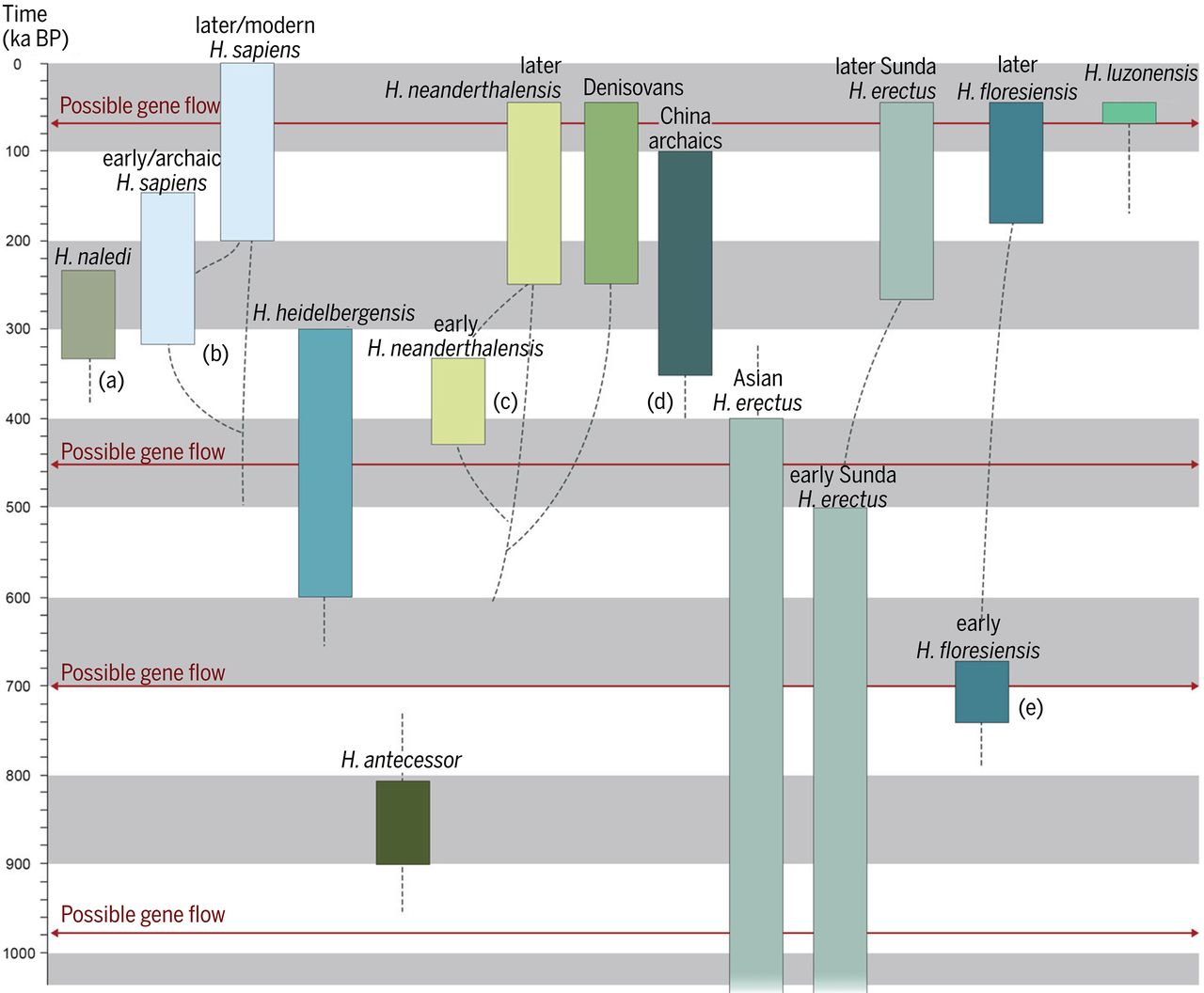
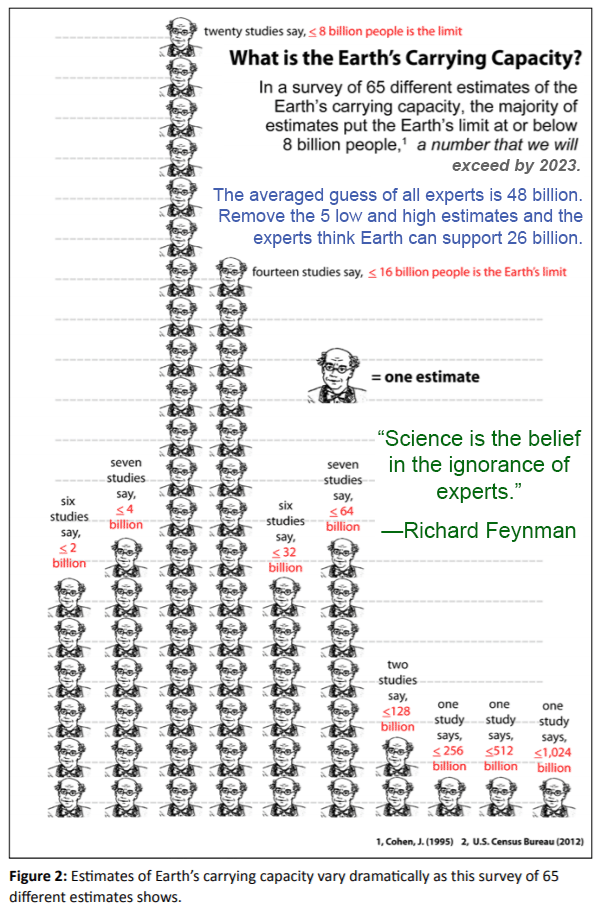
Cited by authoritative BBC article in 2016.
- Exceeding overcarry limits unto plague-phase overshoot is regionally associated with technology and agriculture enabled regional overpulsing of overdensity, overcomplex societies/empires.
- Overdensity populations may be enabled by technology alone (e.g. red cedar canoes in Pacific Northwest 3-4k BP, grain harvesting/storage, Göbekli Tepe 14k BP), and agriculture, plant and animal domestication (12-13k BP).
- Human biology selects for living in bands, groups of 20-50 well under Dunbar's number (max 150) though cultural innovation may allow groups of up to 250 to work long-term (e.g. the indigenous Siane of New Guinea).
- Overlarge group size selects for hierarchy, complexity, and pathologies such that living in them for more than 8-12 generations becomes non-viable due to overstress and behavioral sink issues.
- Sustainable complex societies may be possible if long-term overdensity gatherings are not normalized, e.g. Kogi.
- Regional technology/agriculture enabled overpulsing selects for empire building from chiefdom to state level unsustainable complex societies based on over-exploitation of human and environmental resources, expansion and conquest (e.g. modern techno-industrial society aka civilization).
- Fossil-fueled technology has enabled the first global empire (Civ 3.x) to arise and overpulse.
- The economic system selects for growth.
- Alternative economics are to consider.
- The economy is an energy system, because literally everything which constitutes economic output is a product of the use of energy.
- Whenever energy is accessed for our use, some of that energy is always consumed in the access process.
- Money has no intrinsic worth (i.e. is counterfeit per 7th law), but commands value only as a ‘claim’ on the products of the energy economy.
- Political systems also select for short-term self interest, i.e. growth, and long-term failure of complex societies.
- Viable solutions require ending (destroying) all existing political systems (e.g. monarchy, autocracy, anarchy, democracy, communism, socialism, theocracy, ideocracy).
- As existing political systems cannot be reformed, i.e. political activism serves to perpetuate the system (e.g. environmentalism).
- Those who seek to end one political system (to replace it with another that doesn't work) are known as revolutionaries and counter revolutionaries.
- Those who fail to serve any existing political system or type of political system are few, but could be viewed as de facto (non-ideological) revolutionaries, e.g.
- H.G. Wells, The Shape of Things to Come is 'a theory of world revolution.'
- William R. Catton, Jr., Overshoot: The Ecological Basis of Revolutionary Change. 'Today [1980] mankind is locked into stealing ravenously from the future. That is what this book [Overshoot] is about. It is not just a book about famine or hunger. Famine in the modern world must be read as one of several symptoms [e.g. biodiversty loss, climate change] reflecting a deeper malady in the human condition—namely, diachronic competition, a relationship whereby contemporary well-being is achieved at the expense of our descendants [and 'our' environment]. By our sheer numbers, by the state of our technological development, and by being oblivious to differences between a method that achieved lasting increments of human carrying capacity and one that achieves only temporary supplements, we have made satisfaction of today's human aspirations dependent [unsustainably] upon massive deprivation for posterity.... Even the "alarmists" who have been warning of grave perils besetting mankind [e.g. environmentalists, XR...] have not fathomed our present predicament.'
The human predicament 'and its background can be outlined as follows: Human beings, in two million years of cultural evolution, have several times succeeded in taking over additional portions of the earth's total life-supporting capacity, at the expense of other creatures [e.g. megafauna extinctions on five continents]. Each time, human population has increased [to reach maybe 5 million by the end of the epipaleolithic]. But man has now [over the last 10k years] learned to rely on a technology that augments human carrying capacity in a necessarily temporary way—as temporary as the extension of life [during a famine] by eating the seeds needed to grow next year's food. Human population, organized into industrial [MTI] societies and blind to the temporariness of carrying capacity supplements based on exhaustible resource dependence, responded by increasing more exuberantly than ever, even though this meant overshooting the number our planet could permanently support [as the millennia pass].... We and our immediate ancestors lived through an age of exuberant growth [for the past four centuries], overshooting permanent carrying capacity without knowing what we were doing.' - John B. Calhoun's compassionate rxevolution, his prescription for our continued evolution.
- M. King Hubbert, replace the monetary culture (MTI) with a matter-energy systems worldview/culture and social control system.
- Ruben Nelson, The future cannot be like the past as we are at a time of fundamental change and transformation that is not an extension, refinement and intensification of the attitudes, understandings and habits which presently dominate our head, hands and heart, i.e. change that involves a fundamental transformation, not only of social structures, but of our very sense of life, including ourselves and culture, i.e. the whole shebang of modern techno-industrial society.
- Jack Alpert, only radical changes in human behavior resulting from a change in social organization can reduce overshoot to zero, avoid the tragedy, and implement an ever improving civilization able to change enough beliefs to change enough behavior to obtain a sustainable, viable civilization.
- Barbara Williams: We must push for a paradigm shift of the greatest magnitude.
- Paul Ehrlich, 2021, calls for a 'survival revolution'.
- Theodore Kaczynski, would-be revolutionary leader, Industrial Society and Its Future: A Manifesto.
- Kogi mámas, post-revolutionary elder brothers who manage human demands on Nature's resources.
- XR enthusiasts, nice try, but, sorry about that—street theater is not revolutionary.
- Revolution begins with: I have met the enemy and s/he is I. Full stop.
- Meanwhile, 'the pace of planetary destruction has not slowed'.
- Alternative political/religious control systems are to be considered.
- Climax and descent will occur, most likely in the 21st century.
- There are two non-viable outcomes (for humans):
- Collapse to extinction, e.g. reindeer on St. Matthew Island.
- A remnant population passes through the bottleneck to regionally repeat the pattern after maybe 500 years of environmental restoration until an increasingly dysfunctional posterity can't.
- Collectively, MTIed humans are no better able to understand the dissipative, adaptive, yet non-evolvable (pathological) overshoot dynamic they are, are a product of and serve, than a dog has of understanding calculus.
- If some understanding of the remoresless dynamic were to emerge and some fraction of a percent of humans were to 'vote with their feet' to maybe make an alternative system dynamic work, then enough humans may be able to pass through the bottleneck with enough information to recover functional behaviors and instigate an evolvable, viable civilization.
- MTI society is foundationally toxic to life on Earth and to individual humans who would stand down, know humilitas, and learn to live in a state of nature.
- The foundational toxicity is our belief in belief.
- Humans, the storytelling animal, are subject to belief, to suffer error, Ignorance, and Illusion.
- Suffering is caused by our attachment to belief-based stories, narratives of self and other, of us and them that dislocate our life/mind.
- Desire, craving for certitude, and attachment (having and thereby being had by beliefs) can be overcome; the believing mind can end.
- The way to overcome belief is to listen, via the heart-mind, to Nature who has all the answers.
- There is one viable option for a species possessing energy stores (e.g. wood, grain) & technology to tap into energy flows (e.g. wind and water): design new 'rules of the game' that select for a viable outcome ('to seek out the conditions now that will come anyway'), then normalize the rules to live within limits because those who endeavor to listen to Nature are choicelessly aware that we (all humans) have no long term 'choice' but to do what Nature selects for (as alternative from being selected against and rendered non-viable).
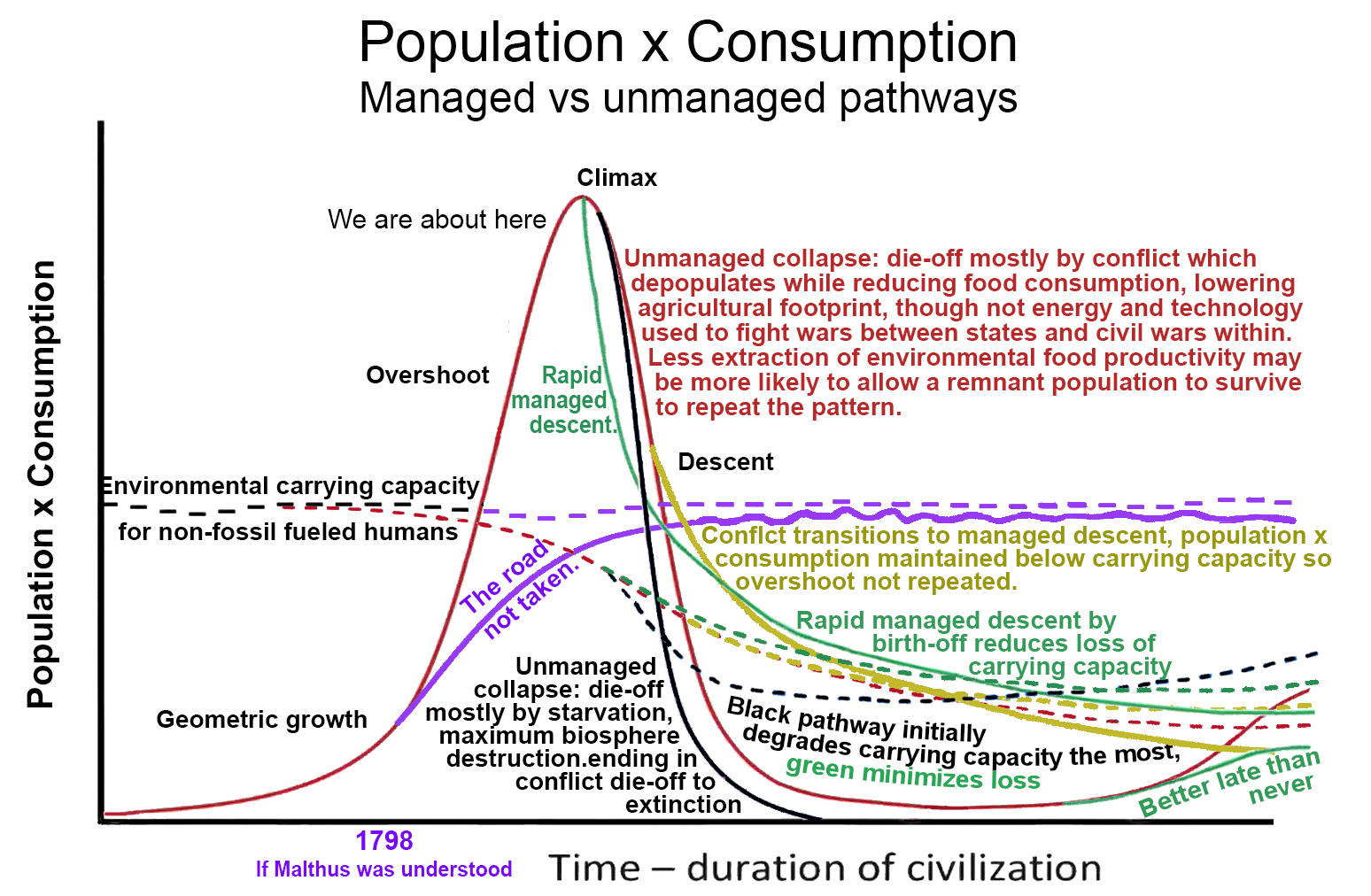
So Iterate Towards the Viable... (away from the non-viable)
Eric Lee, A-SOCIATED PRESS
TOPICS: ECOLOGICAL CIVILIZATION, FROM THE WIRES, WORLD SYSTEM DESIGN, SAPERE AUDE
Abstract: Jack Alpert is interested in designing a viable civilization that is actually sustainable, one within which posterity may live and prosper as the millennia pass. He offers his Design for a Viable Civilization and more recently (Feb. 6, 2020) he published a helpful overview of his work towards saving humanity and the biosphere on the MAHB site, Population, Energy, and Viability: Connecting the Dots. However, for the straight dope and details, watch his 2/16/22 presentation to the Canadian Club of Rome. As I have similar interests and concerns, what would my best-guess design for a viable civilization look like? How would it compare to his? Well, I considered his proposed design first, then modeled my outline on his to better allow for comparison. The main difference is that instead of providing for three hydro-powered megacities (currently there are 37 fossil-fueled ones) that include management of individual behavior, I propose global management of perhaps 25 thousand watershed management units (WMUs) and no global governance of individuals. Only WMU behavior would be managed globally which may work only if WMUs are allowed to fail. To avoid failure, WMUs will have to self-organize (auto-organize) in a manner that works, as Nature determines, within limits that apply to all WMU members of the proposed United Federation of Watersheds. Accepting limits brings long-term gains (sustainability), which selects for Federation member persistence. Support for 'a prosperous way down' or 'a prosperity of enough during rapid degrowth' is currently insignificant. My design seeks a rapid non-genocide transition of humanity to an ecolate civilization of enough (from a business-as-usual (BAU) civilization of everMORE!) without incurring Malthusian deaths while selecting for functional behaviors (reversing Calhoun's behavioral sink), which is one way we could play our high-stakes global endgame. Some who can follow the breadcrumbs of evidence and listen to the still small voice of reason (e.g. sci-fi short story) can self-organize to form enough WMUs to persist as candles in the dark. Or not, as Nature allows for failure to persist. Assumed is that what happened to the Indus Valley Civilization within a geographically isolated region could happen globally within the isolated biosphere of spaceship Earth. There is evidence that interest in a 'design for a viable civilization' is lacking at all levels perhaps because to have such a sustained interest implies the current global civilization is not viable, which is too painful an idea for 'right thinking people' to contemplate (form a shared domain of discourse about). A global endgame is a topic outside pretty much everyone's Overton window, but that is not proof that such existential concerns are in error. This 'missive' is too long, violates the magic number seven plus or minus two rule in an attempt to connect multiple dots covered in over two hundred of my other missives. Read piecemeal over perhaps a three to six month period.
COOS BAY (A-P) — Global complex society (Hubbert's 'monetary culture' or Euro-Sino Empire) is on course this century to kill through starvation and conflict up to 20-95% (or more) of global population by 2100 and destroy much of the planetary life-support system resulting in the ongoing mass extinction event that could rival that of the Permian. And the future... is unknown, but it could involve degrowth.
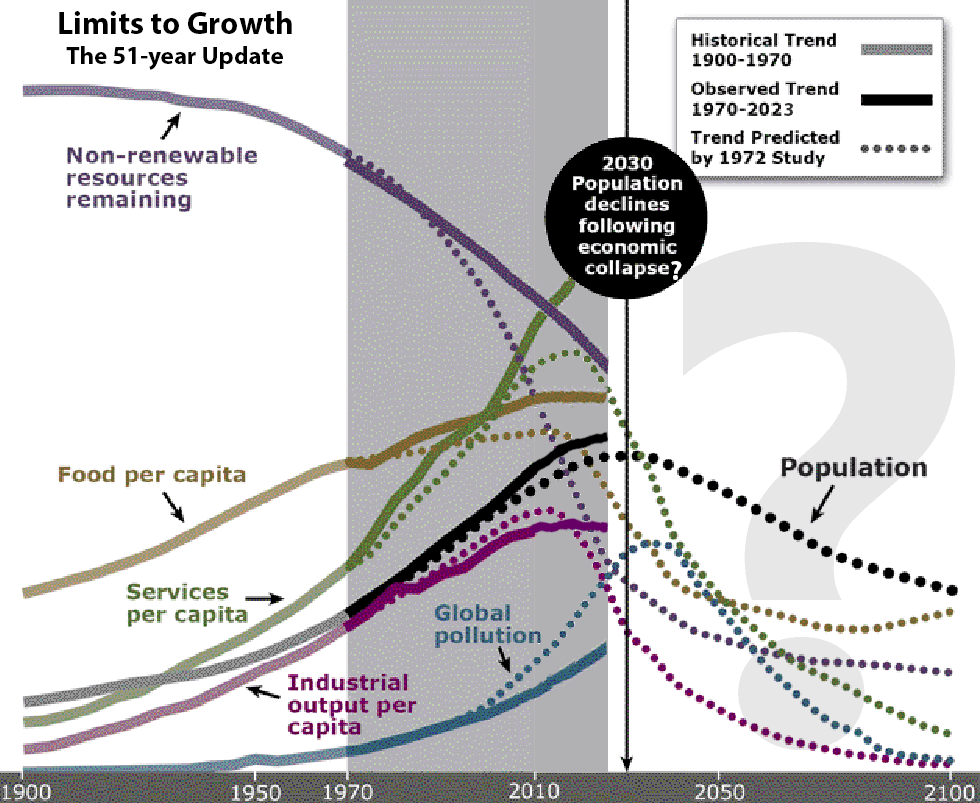
Conversion of fossil fuel into food was greater than modeled in this scenario from 1972 using 1970 data and pollution other than CO2 less, so climax could be delayed a decade or few, but don't count on it. Don't assume that demographers, economists, or journalists have a better grasp of the what-is (or may be) than systems ecologists. Climax could be in the 2030-2070 range and descent could be steeper. A WWIII would change the lines, but the system will climax. No one knows in what year or decade (or even century if energy 'too cheap to meter' were pulled from a techno-magic hat to increase the destruction of Earth's life-support system for life other than humans, their pets, livestock, crops and zoo animals). And after the fact it could take ten years for most people to acknowledge that the system is post-climax, and ask 'and then what?'
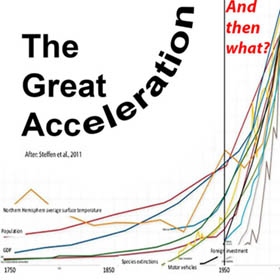 For those not paying attention, the most significant event in the history of humankind occurred about 1950 when the slope of the curves plotting global growth exceeded, on average, 45 degrees. A small fraction of 1 percent of humans (who would rather know than believe), by the end of the 1950s when the trend was obvious to the few, asked 'and then what?'. In the short term, in terms of everyone's self interest, growth was the best thing imaginable, and to those still getting richer in the 21st century, growth is still unquestionably good.
For those not paying attention, the most significant event in the history of humankind occurred about 1950 when the slope of the curves plotting global growth exceeded, on average, 45 degrees. A small fraction of 1 percent of humans (who would rather know than believe), by the end of the 1950s when the trend was obvious to the few, asked 'and then what?'. In the short term, in terms of everyone's self interest, growth was the best thing imaginable, and to those still getting richer in the 21st century, growth is still unquestionably good.
The question of 'and then what?' entails foresight intelligence. Humans who 'can actually think more than a decade ahead' could foresee limits, overshoot, and descent. They wrote a number of books and millions read them. They gave lectures, but there were no solutions acceptable to political animals, so each Anthropocene enthusiast, to continue to serve the 'monetary culture' and prosper, came to not think ecolate thoughts. Individuals who have foresight intelligence and ask 'and then what?', are few, are unable to serve the SYSTEM with enthusiasm and self-select out of working to grow industrial society empowered by the fossil-fueled economy (for a time) to unintentionally create humans of NIMH.
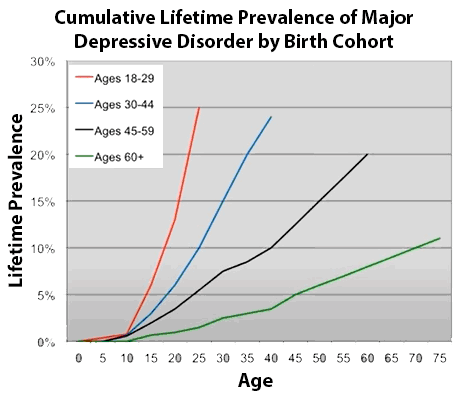 Living in stress is not viable. As a Calhounian would predict, major depressive disorder has been on the increase generation after generation. A quarter of Americans are debilitated by it at times, and the times they are increasing. In fifty years (or less) the rate will be 50 percent at present trends. WHO estimates one-third of the over-densitied worldwide now suffer this or other mental health disorders. Mental health problems have reached epidemic proportions. A 2021 American Opportunity Survey polled 5,000 Americans and found that 37% of them had been diagnosed with mental health issues, or sought treatment for their mental health.
Living in stress is not viable. As a Calhounian would predict, major depressive disorder has been on the increase generation after generation. A quarter of Americans are debilitated by it at times, and the times they are increasing. In fifty years (or less) the rate will be 50 percent at present trends. WHO estimates one-third of the over-densitied worldwide now suffer this or other mental health disorders. Mental health problems have reached epidemic proportions. A 2021 American Opportunity Survey polled 5,000 Americans and found that 37% of them had been diagnosed with mental health issues, or sought treatment for their mental health.
Add ideological pathologies and figure 90+ percent. Overdensity living is cause enough, stressor enough, but add increasing scarcity and conflict to the pot. One in nine Americans are on antidepressant drugs and far more self-medicate (on various legal and illegal drugs). Usage is increasing as is the rate of mental disorders (as are other non-drug addictive behaviors not to mention suicides). 'It is a disease of lifestyle'. Actually it is a disease of living as a rat in a Skinner box serving the economy, the monetary culture, and of our stress response, which includes the storytelling media (mainstream and social) all of us swim in.
Do the opposite of what Timothy Leary suggested: tune out, turn off, and drop in. 'Groove to the music of [Nature's] great song'. In 1967, Leary spoke at the Human Be-In, a gathering of 30,000 of the hip in Golden Gate Park and promulgated the phrase 'tune in, turn on, drop out'. How's that been working for us? Try a Reality Be-In. We are all humans of NIMH. That is what Leary should have said in 1067, but maybe 3 in 30,000 would have listened then (or now). But to understand something is to be delivered from the things we can change. Scarcity will not be one, but facing our planetary predicament gives us a life-driven purpose that will be our deliverance if there be one. Trade 'screen-time for face-time'. Death to the fascist screens that prey upon the blood of the people [to paraphrase SLA rhetoric from '70s].
I'm guessing the global socio-politico-economic system will climax this century, 2030 to 2070 to be somewhat more specific, and that there will be degrowth of the global economy, per capita consumption, and the population of livestock, crops, pets, and humans. But I'm a know-nothing from the hood who just doesn't get it, so believe whatever you want. If 2070 comes and the global economy is still growing, all you transhumans can dance on my grave for a time as I'll have gotten the time of climax off. If humans build a Dyson sphere, the climax may be put off for 2K years, but then what?
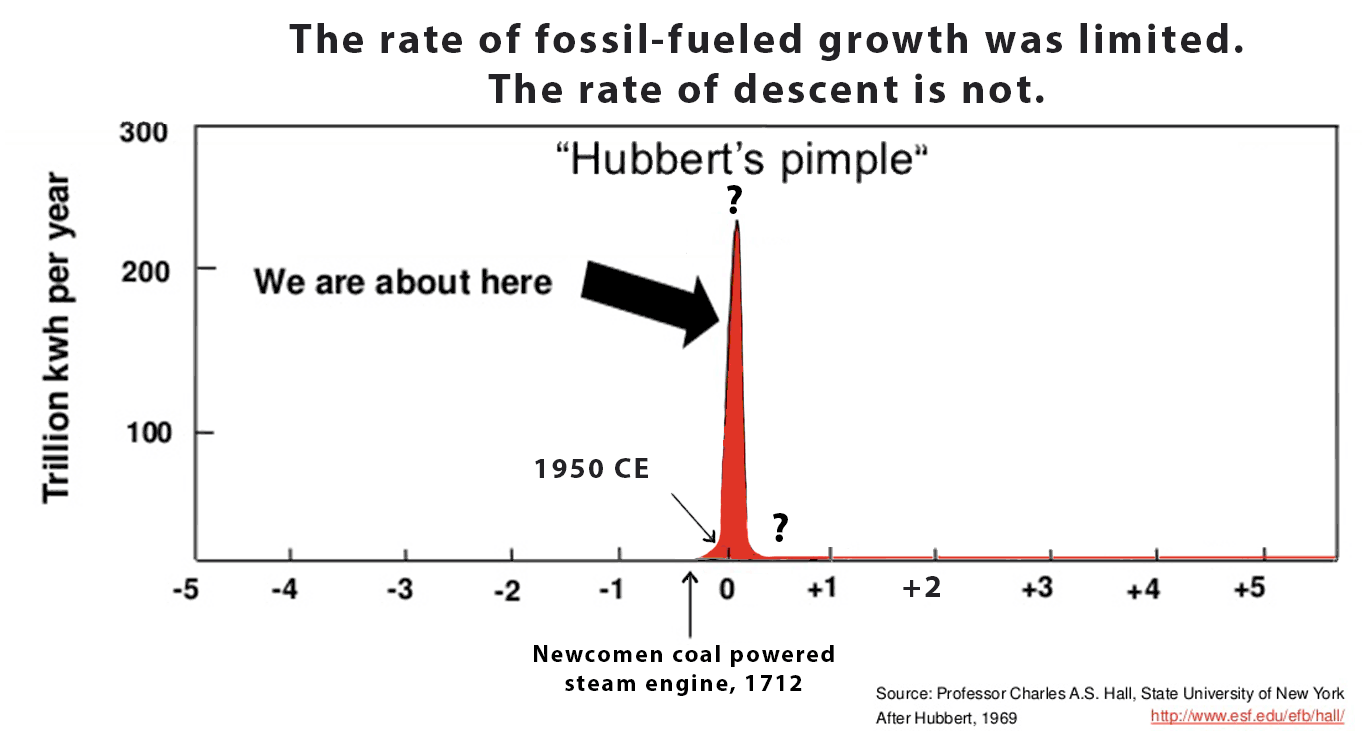
There are biophysical constraints on growth.
Limits have already been transgressed.
The current trajectory implies systemic collapse.
For survival, a new economic system would provide the basis for material exchange
within a much smaller human community living more cooperatively and equitably well
within the biophysical capacity of its supportive ecosystems,
'.., only the most recent 10 or so [of the prior 15,000 generations of humans] have experienced sufficient population/economic growth (and technological change) in their lifetimes to notice. For 99.9% of human evolutionary history, human numbers everywhere fluctuated in the vicinity of local carrying capacities as the latter varied with shifting climate and other ecological variables... in just a few years). In short, while the present generation and other recent cohorts of H. sapiens take continuous growth to be the norm – most economists get nervous if growth falls much below a “healthy” 2-3%/year which means GDP doubles every 23 to 35 years – the past few decades of explosive growth comprise the single most anomalous period in human history.' —William Rees, Growth through contraction: Conceiving an eco-economy , 2021.
'...our species is nearing the peak of a fossil-fueled ~200 year plague-like population outbreak that is beginning to trigger serious manifestations of negative feedback... half the fossil fuels ever used were burned in just the past 30 years (90% has been consumed since 1943)... the time has come to face biophysical reality.... the human population will decline dramatically; theoretically, we can choose between a chaotic collapse imposed by nature or international cooperation to plan a managed, equitable contraction [by design, emph added] of the human [BAU] enterprise.... The question is: how can the self-proclaimed most-intelligent-species-on-Earth organize socially, politically, and economically to implement a process to ensure an orderly and equitable contraction? Could there be a more riveting intellectual and practical challenge?' —William Rees, The fractal biology of plague and the future of civilization, 2020.
Despite decades of hardening evidence, mainstream global society nevertheless remains in policy paralysis, stymied by cognitive and behavioural barriers to change that have deep roots in both human nature and global society’s culturally constructed economic growth fetish.
But what if mounting public pressure... or a series of miniclimate catastrophes finally overwhelms these barriers? Assume the world community becomes fully motivated to deal effectively with biophysical reality. Now the question becomes, What would truly intelligent, forward-thinking, morally compassionate individuals do in response to available data, the historical record, and ongoing trends?
... In effect, the metagoal of Survival 2100 would be to rewrite global society’s cultural narrative to achieve greater social equity and economic security in ways that reflect biophysical reality. —William Rees, The Way Forward: Survival 2100, 2012.
Modern society is ecologically dysfunctional: When cultural norms are radically anomalous, ‘normal’ is pathology and its solutions merely reproduce the problem.... We are mostly concerned about whatever affects us right here and right now.... Moreover, as social animals, we ‘socially construct’ what we take to be real. Our cultural norms and narratives, religious doctrines, political ideologies, scientific paradigms, economic theories, etc., however deeply entrenched by social convention, are all essentially ‘made up’. Regrettably, many complex constructs do not faithfully represent important dimensions of the biophysical world.... When will the media call on systems ecologists to explain what’s really going on?... There are no exceptions to the 1st law of plague dynamics: the unconstrained expansion of any species’ population invariably destroys the conditions that enabled the expansion, thus triggering collapse.... If we don’t manage a controlled contraction, chaotic collapse is inevitable.
Discussion in the mainstream focusses doggedly on defeating CoViD-19, facilitating recovery, restoring growth and otherwise getting back to normal. After all, “That is the paradigm: Treat the symptom to make the world safe for the pathology.”... Humanity’s recent 200-year growth spurt – the period we take to be the norm – is arguably the most abnormal period in human history. The ecosphere is reeling from the human onslaught. There is no reasonable possibility of supporting even today’s 7.8 billion people indefinitely on the productivity of the only planet we have; current average levels of consumption are excessive, yet half the human family are still impoverished and three quarters of a billion live in extreme poverty (<$US 1.90/day). The socially-constructed notion that we can sustainably accommodate two or three billion more while maintaining ecosphere integrity is mass delusion. —William Rees, Coping With CoViD-19, Acknowledging The Real Plague, 2020.
'International cooperation' as in to grow the economy? Or are nation-states/complex societies the epicenter of our problematique? Maybe, when we have no choice, a form a global governance (e.g. a United Federation of Watersheds) will self-organize based on Nature's laws, which may be possible when we and our hubris ways stand down (when human supremacy can no longer be believed in). No political leader/planner/decision-maker/CEO, or wannabe leader of today would/could think to suggest we 'stand down' or manage an equitable contraction, i.e. rapid degrowth of our population and per capita consumption, ASAP. The Pope will sooner declare himself to be the Antichrist.
We are the profligate consumer society that normalizes profligacy. Limiting our speed to less than feels good is a tough sell (on the autobahn average speed is 88 mph, 30x faster on flat land than an unsustainable fast walking speed requiring 30k watts or 600x more energy than needed to walk, and ebike enthusiasts consider 26 mph maybe fast enough using 1200 watts to climb most hills at that speed, compared to a sustainable human power norm of 50 watts to bicycle 9 mph on flat land or 2 mph uphill on a trike, hence a mere 250W ebike is passionately resisted because grandpa has the right to blow past the spandexed without pedaling while laughing maniacally).
Limiting our personal indoor space to 20-25 sq ft, the norm our ancestors found to be enough (current US norm is 656 sq ft per person, 30x more) as the millennia went by is unthinkable (they could have built bigger wickiups for the price of an effort, e.g. 30 sq ft per person, but didn't because energy expenditure selects for big enough), as is not maintaining an indoor temperature between 68 to 78 degrees Fahrenheit.
Living in a world where a hot meal is not available 24/7 within minutes from a nearby fast food outlet (or microwave) is also a world many consider not worth living in. We are blind to the long-term consequences of our profligate pursuit of short-term self interest that the monetary culture normalizes.
There will come a time (perhaps soon) when our belief in consumer entitlement falters, at which point change will be thinkable to the adaptable. Today, however, even those with foresight intelligence seem unable to 'seek out the condition now that will come anyway' and so viable solutions cannot be chosen.
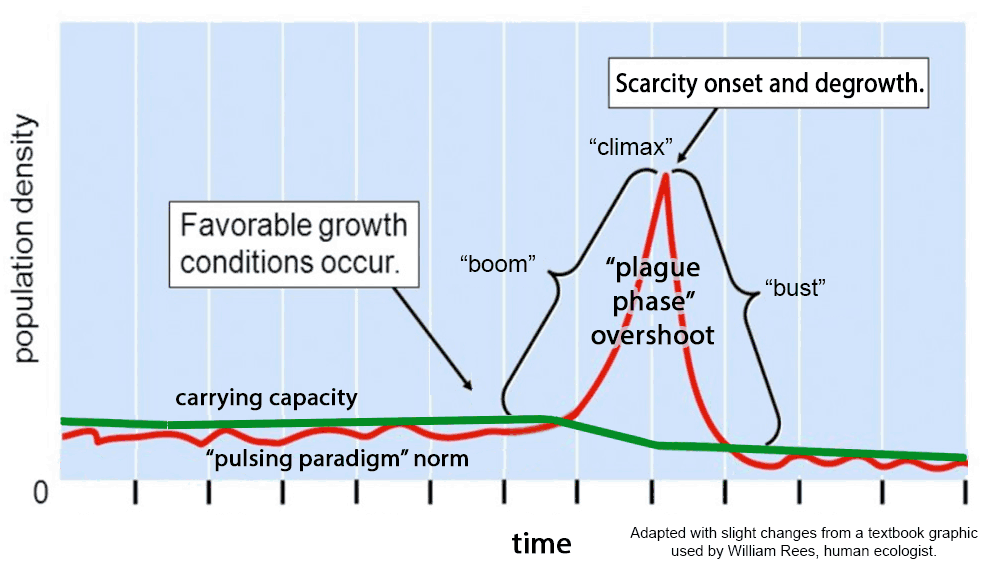
The guess that the system will climax this century is based on systems thinking/data/modeling and not the reading of chicken entrails, or political or religious opinion/certitude. I 'know' that the rate of growth is limited, but the rate of degrowth is not. I'm not predicting that there will be a 95% depopulation event this century, but there could be, or worse, and the Precautionary Principle suggests preparing for possible (especially likely) futures, including the not so feel-good ones, as failure could mean extinction for humans and most of their pets and livestock. The only prediction I'll make is that after climax it will take ten years before a majority of the intelligentsia/media/public can acknowledge that the global SYSTEM is post-peak, while the rest, who are still in power, will still be demanding that politicians, public servants, and the military make their nation-state/economy great again.
Today's proposed politically thinkable solutions (e.g. BAU/GND, continued Business-As-Usual or Green New Deal (e.g. Green Growth) 'solutions') to pending multiple system failures, while intended to improve conditions, will at best only delay system climax resulting in a steeper descent (the bigger we get, the more we kick the can, the harder we fall). Or humanity will start building its Dyson sphere and all will become transhumans with a 700 year average lifespan at whatever age we prefer to stop aging, but current empire (the now global complex society) could fail like all prior non-global ones. Maybe we should forget efforts to 'optimize our civilization at its margins' by recycling more efficiently and buying sustainable 'green' goods and services to grow (sustainably and resiliently of course) the circular green economy..., and instead focus on implementing the physical and social core elements that 'PRODUCE civilization viability'.
'Because nature's domination [by/for humans for short-term gain] is the sin qua non of civilization, we must remake civilization in its totality.'—Eileen Crist, Abundant Earth: Toward an Ecological Civilization
Just
because,
Imagine an Ecological or Ecolate Civilization 4.0
'If society does not succeed in changing attitudes and institutions for a harmonious descent, the alternative is to prepare information packages for the contingency of restart after crashing..., seek out the condition now that will come anyway.' —H.T. Odum
- Minimum 'individual well-being' is a low-intensity forager-farmer lifestyle sans fossil fuel inputs, direct or indirect, with 60-90 percent less yield per hectare and 90+ percent fewer hectares planted at any given time (green manure/fallow periods required to grow rainfall dependent crops) than substantial fossil fuel inputs still allow in the early 21st century.
- A sustainable population size for the carrying capacity of its watershed area having a distribution of wealth that is fair and equitable on an intergenerational basis based on low resource use.
- Understanding of the geobiophysical nature of things is based on a matter-energy systems worldview.
- The matter-energy plus organizing principles (laws) of the cosmos worldview is based on a mountain of evidence and reason (i.e. not belief-based).
- 'There are no cheap tickets to mastery. You have to work hard at it, whether that means rigorously analyzing a system or rigorously casting off your own paradigms and throwing yourself into the humility of Not Knowing.'.—Donella Meadows, Thinking in Systems: A Primer
- As a starting point, consider Yuji Ishiguro's 52 page ebook 'One-Billion World'.pdf 2020, or Nate Hagens' Reality 101 videos. Or if you have two broken legs and the TV/smartphone thing is broken, read half of my 200 or so missives, and sorry about that in advance.
- The raise and fall of empire is the dynamic we currently are products of and serve with the usual outcome, e.g. secular cycles, but global for the first time—to be delivered from the dynamic, seek to understand it.
- What would a wise society do? Rob Mielcarski, of the un-Denial site, has some ideas along those lines.
- What functionality, minimally, must pass through the coming bottleneck to enable complex, adaptive and evolvable social systems to rebuild within limits after crash?
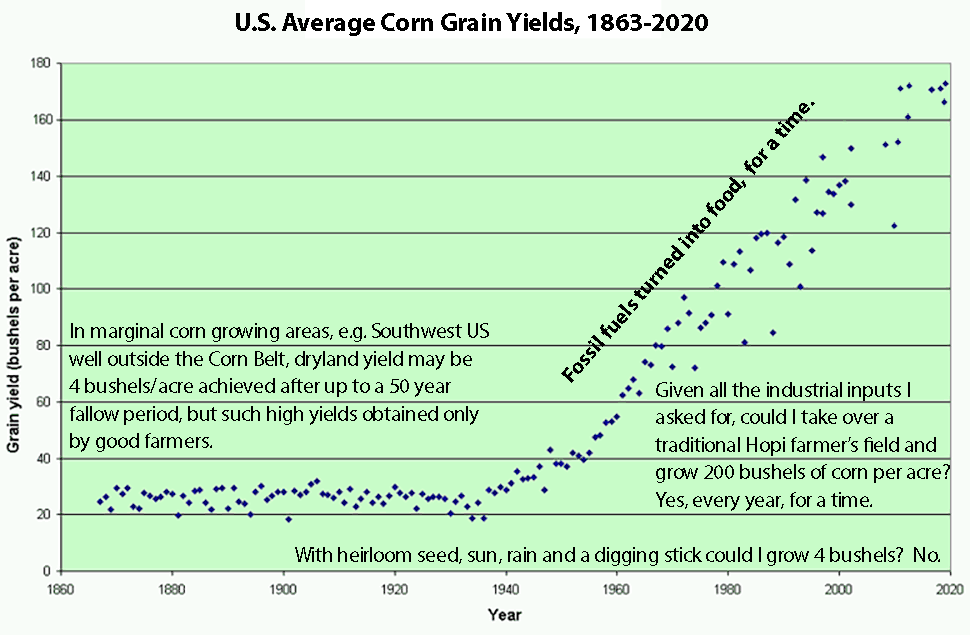
- Baseline food,
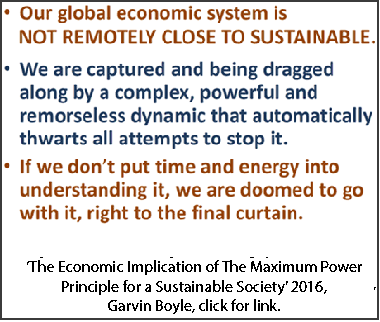 shelter, healthcare, sanitation, education, information, and protection from
empire-builders provided.
shelter, healthcare, sanitation, education, information, and protection from
empire-builders provided.
- Conservation of information packages to preserve current information contained in the arts, sciences, technology, and viable cultural memes to prevent a 90 to 100 percent loss as usual.
- Access to education, entertainment, technology, science, art etc. as conserved.
- Humans iterate away from being energy blind (about 97% being blind in one eye and unable to see out of the other), time blind, and posterity blind.
- Humans iterate towards becoming functional embodied animals living in evolvable complex societies in the same magisterium as all other organisms.
- A viable global civilization would be the set of all viable complex societies, perhaps 10-25 thousand, of manageable, viable population size (there is no global overpopulation problem), perhaps 2-20 thousand average population (global population 20-500 million).
- Humans living within manageable watershed areas (average size about 2,850 km², 1,100 mi² with maximum area about 10x, e.g. desert areas) claim up to 20% of land area as a managed commons, total and by type, e.g. up to 20% of arable land or riparian land, or other high environmentally productive land.
- Eighty percent of the land surface, not managed as a commons to support complex society, returns to its natural state with humans working to mitigate past anthropogenic degradation to 'be our biosphere's handmaiden anew.' —H.T. Odum.
- Maybe 'we survive and evolve further to the point where we are as much a part of our living planet as our brains are of us.' —James Lovelock, A Rough Ride to the Future 2014
Ecological Civilization Details
- Physical elements of viability.
- The energy supporting this new design will be limited hydroelectric and sunlight for photosynthesis, some PV, and weather services (e.g. wind to sail by, precipitation, global thermoregulation).
- Hydro can be maintained for a few hundred years using its own output.
- To seek out the condition now that will come anyway, phase out all fossil fuel use, except to produce storable foods for the transition, in five years (20% first year, 25% the second...).
- About 99% of industrial chemicals cannot be sustainably produced long term, so seek out the condition of not using them.
- End all tree cutting in five years until reforestation allows for sustainable pruning and cutting of trees in maybe 50 years if humans help with reforestation.
- End all commercial and consumer use of nuclear energy in five years by diverting power to scrub CO2 from the atmosphere for long-term storage until nuclear power plants are decommissioned.
- All policy changes, such as above, implemented by a system of global governance as the existing BAU system is utterly unable to implement real solutions (e.g. rapid birth-off to avoid die-off).
- Each living member of the population gets an annual allotment — e.g. 18,250 Wh/year of electric energy (vs 96,000,000 Wh/year in Jack Alpert's design, 5,260 x more).
- High value electric services may include personal LED lighting and enable low-power information technology.
- Fractional hp electric motors excel in providing rotary motion services should high energy resources be available for community use, e.g. cutting wood.
- High power used to support limited work and manufacturing, e.g. small 10W solar panels, rechargeable AA batteries, screws, fabric, wire, LED lights, writing paper, wheels, fractional hp motors...
- Any high energy (>100W) source is not for personal use nor used to create manufactured wants, as is selected for by the consumer society.
- Maximum community size to avoid loss of functional social behaviors, the behavioral sink, is about 150 with 5 to 85 (human biology band size) being an optimally functional community size of such cooperative hominids as remain. [Note: 25K watershed management units (WMUs) should have 25K different designs intended to be viable, so where specific WMU design elements are given, the details reflect my best guess as to what might work, so all WMUs may vary within limits that Nature determines. Designs that give people what they want may fail, such that 90+% of initial designs, however popular, may fail, but such failures are not an existential threat to our species unlike the failure of our now global complex society.]
- The number of semi-autonomous interconnected communities (forming a complex society) depends on environmental productivity.
- All communities within a watershed management unit (WMU) are subject to WMU control and exert counter-control, which is not micro-managed by any global governance apart from setting limits on WMUs.
- Much as the Federation manages WMUs, they manage communities (typically 20-60 in population) that manage individual behaviors per the 300+K year traditions of our species, the set of self-organized social controls what work, with failures decreasing in frequency, to produce functional individual humans as distinct from the effects of urbanized, industrialized environments.
- All residents of a community could vote with their feet and join another community that would have them as a member, so communities would compete for 'good' functional people and those who ended up composed of the dysfunctional (e.g. drug addicts unable to be self-supporting forager-farmers who have to make more than alcohol) fail such that the dysfunctionality that can arise in small groups is selected against.
- Similarly, WMUs could fail if they fail to retain or produce 'good' people.
- Cities to be occupied by outlying populations from communities with children for no more than 7 days straight, up to 13 times a year. [See note above.]
- In the 21st century definitions of city/town size vary widely, but in a low population world, for Federation purposes, a town is a fixed settlement with a population of 100-1000, and a settlement over that is a city (under 100 is a village where most people would live/work most of their days and over 100,000 would be a megacity as may form around high energy sources).
- Cities in forager/agricultural WMUs could be occupied for two or three days every full moon, food carried in, and perhaps for six or seven days once a year during leap days.
- Cities/towns must be within one day walking/cycling distance of outlying communities.
- Each city/town has a Federation Embassy, minimally containing a library, post office mailbox (one in, one out going), and some tools and medical supplies without permanent staff.
- Benefits to adults must outweigh harm of high density populations.
- Those without children may inhabit cities longer, at risk of loss of psycho-social health.
- Elders and the ill or dying requiring more care than family can provide could stay at an assisted living shared home in city.
- Cities in agricultural areas limited to size of population a watershed supports.
- Size, when fully occupied, may be less than 1,000.
- In high production agricultural areas able to export food, population may be in the tens of thousands.
- In some areas of high hydro, geo, or wind power able to produce trade goods and import food, populations of over one hundred thousand are possible.
- Such megacities (by future ecolate standards) to be inhabited for longer than seven days only by pre-parental young adults who agree to live there at own risk for a time, or by the intentionally childless for life whose loss of functional behaviors will not be passed on to the next generation.
- Those who procreate while living in a city will move before the child is born as limits must be set to avoid Calhoun's behavioral sink.
- Part of the behavioral sink in humans is that the urbanized come to normalize dysfunctional behaviors, so they are not able to reliably self-assess.
- Largely self-sufficient communities with children could cluster within cycling distance around a city where one parent went to the city to work for three days, then return home for four or more days to perhaps avoid becoming 'humans of NIMH'.
- Scattered about the globe would be watershed management units (WMUs) that imported more food than they produced or resources than exported, to which just enough of global trade items were diverted by the Federation to maintain them.
- All of the WMU embassies, distributing information and services freely, need support.
- The population of some WMUs would be larger than that WMU's environmental productivity supported.
- Communities of learners self-organize around a central city (population >1k) and its wisdom groves.
- A bioregion's or sublate's or ecolate's Federation Academy/embassy would be the source of Earth Agents and Gaia Guardians, among which there would be one global Academy, perhaps in an area once called Greece, where any child born of a forager-farmer or hunter-gatherer band could end up teaching humanity and posterity.
- Each of the six ecolates would support an ecolate academy.
- The 30 sublate academy watershed management units (AWMUs) could be the first WMUs within each sublate as the ecolate academies and global academy would emerge later as would any bioregion academies.
- All WMU embassies would include a library with interlibrary loan ability, with rooms for visiting scholars who would freely share information.
- An AWMU could be the first WMU formed, and if so, its work would be to model what a viable WMU might look like, and intermediate to advanced learners could help new WMUs form.
- The first AWMU could start as a bioregion AWMU, and a sublate level AWMU could come later made up of the more accomplished/advanced members of bioregion AWMUs within the sublate.
- There are currently about 700 million 15-19 year olds.
- If 10% of 1% of 1% of them refused to be schooled to serve the world socioecomonic-political system (WSS), then 7,000 learners, with elder support, could move to the first AWMU within the first sublate that begins the transition.
- Each AWMU would be centered in about 30k hectares (74k acres) of agriculturally viable lands with 150 outlying learner communities whose biophysical economy (BPE) is low-intensity agrarian.
- All communities of 20 to 50 learners (there are no professors per se, but there would be a recognized by-merit hierarchy of learners) would be within walking distance of the central library, with ad hoc meeting areas for learners to interact as needed.
- In a largely self-driven autodidact education system, walking alone or sitting under a tree, in thought or reading a book, would be the norm.
- Each learner assesses other learners to be equal or more advanced than themselves, and will, in appreciation for the learning they have received, assist those less advanced in any field of inquiry.
- All will be both learners and teachers in some areas of inquiry.
- The curriculum would be test based, not class/course based, with tests serving primarily to help the learner assess their progress in the study of _______.
- Elder learners, having the most most advanced understanding of _______ may be forced to work less within a community's BPE (or prefer to to have more time to share their sapience) as agreed to.
- The work of each AWMU would be to understand and learn to live properly (i.e. as the millennia pass) with their WMU (and one another) so as to then pass on such information of the highest transformity.
- Memetic information would be preserved and evolved into information packages matching the time a learner may have to study them.
- Each AWMU would include the ability to reprint information with a focus on Rosetta Bliss and Encyclopedia Bliss for distribution to community libraries within the AWMU and communities within all WMU that may arise about them.
- Oh, and no one graduates, ever. You may stop learning and die if you live long enough.
- Each of the six ecolates would support an ecolate academy.
- Autodidacts having ability and motivation to learn Semantography (Bliss), from any WMU (all must provide the opportunity), could apply for admission to a bioregion's Federation Academy.
- Those who lived in an Academy WMU (most but for a time, for some years) would reproduce as all would go home, to their WMU, to do so if the Mothers of their WMU blessed them.
- Academy WMUs would be learning communities, the source of information and the begetters of new information and services.
- The learning that was enabled by degrading a planetary larder of fossil fuels, the information produced being the flower and fruit of the Growth Culture, supported many schooling systems and schoolers of the schooled, but in the low energy prosperity of the Federation, only centers of education could be supported. ['I have never let my schooling interfere with my education'. — Mark Twain]
- Some Academies, located near sources of high energy, could focus on preserving and developing appropriate technology.
- Most graduates return home to serve at their Federation Embassy, supported by the fellow residents thereof for services rendered, or in resource poor WMUs, with just enough Federation subsidies.
- Some creatives could travel globally offering their services in the arts and sciences, as any WMU could agree to support a resident poet, singer, artist, musician or teller of tales (for a time or for life) that their WMU of birth might not appreciate.
- All WMU citizens to have two (or more for nomads) residences.
- One is a city home.
- Each dwelling to provide up to 3 sq. meters (32 sq. ft.) interior space per person to inhabit safely with privacy in a comfort of enough.
- In most climates, rolling-rooms would be optimal for a country home.
- Wheels added as and when needed to relocate.
- Rooms may adjoin to accommodate couples with or without children.
- Children acquire their own rolling room to adjoin (or not) to their parent's rooms.
- On coming of age, children and their rolling room, made to last a lifetime, may relocate.
- Rate of moving overland is walking speed or on water by river barge or sailing barge, i.e. fast enough.
- In desert areas, underground homes would be adaptive.
- Where water courses are common, boat-homes would be adaptive.
- Dense habitat (human footprint) minimizes energy requirements for shared services — transport, healthcare, education… etc.
- Initial stocks of minerals and metals (embedded in infrastructure, household inventory, or warehoused).
- Scavenged from ruins of techno-industrial civilization.
- No further mining as all mining is unsustainable.
- Humans must 'seek out the condition now that will come anyway'.
- No dependence on non-renewing resources. (fossil or uranium or water/mineral/biomass drawdown).
- No groundwater pumping that lowers maximum watertable and limited to human powered pumping after restoration.
- Consumption of renewables maintained at or below renewing rates to allow for restoration or create buffer capacity.
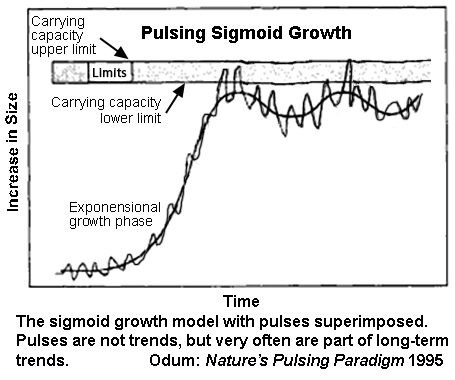 Consumption maintained below the lower boundaries of the pulsing paradigm norm, e.g. to allow a population to get by during the expected '100-year drought'.
Consumption maintained below the lower boundaries of the pulsing paradigm norm, e.g. to allow a population to get by during the expected '100-year drought'.- If by mismanagement a WMU takes advantage of a 30 year period of higher than average reliable rainfall to overgrow their biophysical economy and population, they risk becoming a failed state.
- Per capita consumption ranges from what is judged to be enough (enough=1.0) to 0.8 of enough ('just enough') to 1.2 times enough to perhaps reward individuals for exceptional service.
- Thus if 50 Wh/day is 'enough', then the poorest citizen would have 40 Wh/day and the richest would have 60 Wh/day.
- If 32 sq. ft. per person is the most an average sized human needs (as distinct from wants), it is because 27 sq. ft. of personal indoor space is 'enough' and 21 sq. ft. is 'just enough' to meet human needs.
- If a WMU has high resources or the people lower their population, each could have 50 sq. ft. of personal space, with a range of 40 to 60 sq. ft. to mitigate formation of unsustainable social hierarchy.
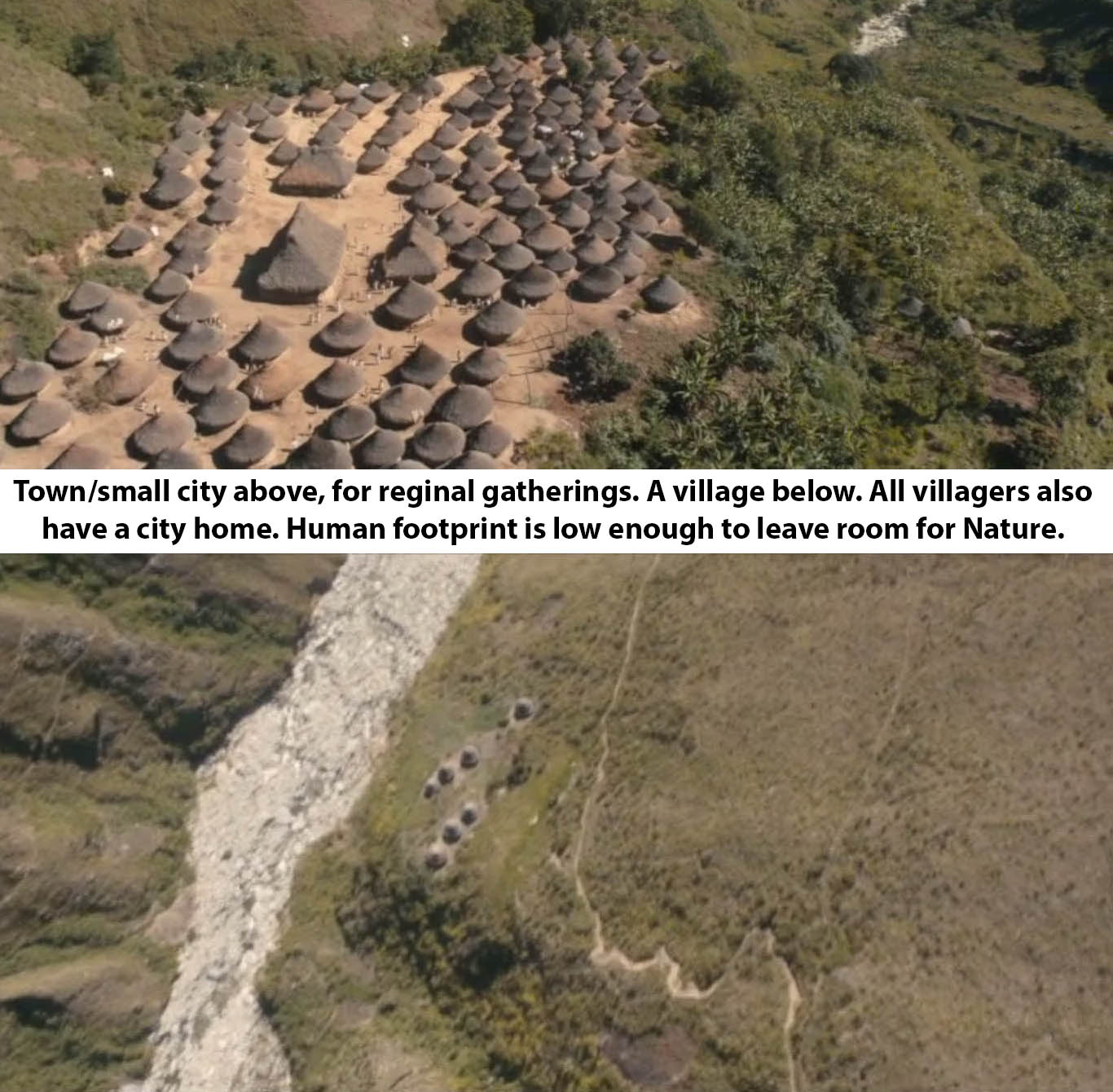
- Social elements of viability (social contract implementation — mutual coercion mutually agreed upon).
- Control of population size.
- As population management is per watershed, there is no target global population or population management (to avoid local species extinction or prevent respeciation by leaving room for Nature, global population, total of all WMUs, likely <35 million).
- There is an alternative to convincing a majority of humans on the planet to agree to rapid depopulation to avoid scarcity induced conflict by having children only as permitted.
- About 26% of people are under 15 years of age, assume they don't get a vote.
- Assume 34% are too old to procreate but get a vote and that many of childbearing age have had 'enough' children already such that those wanting to bear children are in a minority.
- If population were a global issue, then to get a majority to do something about it, anything, requires convincing 2.9 billion, mostly grandparents and the post-childbearing who are less biased, to agree that rapid depopulation (by birth-off rather than die-off) requires births be limited to those permitted by law, as administered by a government (the UN?) or by each and all governments (somehow?).
- Alternative is to convince 5.9 million (100% of the adults in a population of 8 million as self-selected from the global population, which is 0.2% of a global majority or 0.1% of all adults or 1 adult in a thousand) to 'vote with their feet' because they agree that they can procreate only when the Mothers of their community of likely 20-60 others agree to bless (decide to allow) them to become with child to avoid a scarcity/conflict induced downward death spiral.
- A Mother representative from each community meets with the other representatives annually, and with the WMU population biologists, biophysical economists, and systems ecologists, to decide the total births for the coming year.
- To increase the WMU's prosperity in the coming decades, the Mothers may decide to reduce the number to allow increased per capita consumption.
- If long-term resources seem abundant and the Mothers agree that Nature has blessed them, that most have somewhat more than enough, they may increase the number to grow the population for a time.
- The number, which can be voted on, divided by the number of communities with community size factored in, determines how many, if any, births a community may bless, and no one gets a vote.
- The Mothers may also consider immigrant petitions instead of blessing a birth.
- With their number of births to be permitted determined, perhaps 0-2, each Mother returns to her community and the Mothers of it decide who among the would-be to bless as The Mother (Nature) has determined.
- In a naturocracy, a foresight-conscious world development program, the Mothers listen to Mother and the men to both.
- A watershed management unit may be underpopulated, enabling immigration.
- A watershed management unit may become overpopulated.
- If citizens fail to prevent an increase of more than 5 percent in child mortality due to mismanagement, the WMU will be declared a failed state.
- Emigration to 'solve' an overpopulation situation is not allowed.
- Failure is permitted by Nature's law (and global governance).
- Failed states may be abandoned, returned to Nature, or come under new management by a better educated prior population and/or new immigrants.
- Transitioning from carrying capacity overshoot (i.e. overpopulation).
- If one WMU becomes overpopulated due to mismanagement.
- 100% of adult population of failed state to be non-reproductive (the adults are the WMU control SYSTEM).
- Children of a failed state may be adopted as immigrants by other WMUs.
- Children under seven are memeticly adaptive.
- Older children may be less likely to adapt to different ways and be less likely to be selected as immigrants.
- Children not adopted remain within their WMU of birth with parents provided all agree to re-education in watershed management principles and limits.
- The Federation or neighboring WMUs may or may not import (gift) supplemental food rations for young children for a time as failure is an option.
- The failure of others to provide is not about them being punitive.
- A social contract that precludes individual failure selects for societal failure.
- 'Nature is unkind'.
- 'The sage is unkind'.
- The Federation is 'unkind', e.g. if a WMU failure is secondary to collective addiction, ideological possession, or interpersonal taker/user conflict..., giving 'help' enables pathology.
- Maintaining target WMU population.
- Population biologists and systems/human ecologists assess carrying capacity of failed WMU.
- The population adopts any proven method to manage populations of livestock, pets and humans.
- As non-reproductive adult population declines, immigrants from functional WMUs may help normalize what works to avoid future failure as children become reproductive, within limits.
- Ownership of life-support system services.
- Nature, the world system, owns all planetary assets by de facto possession sans humans.
- Humans may initially claim up to 20 percent of a WMU to manage as a commons supporting their complex society.
- Bounded areas also managed.
- Nature's 80 percent to assist nature restorancy of prior anthropogenic environmental degradation.
- Ruins to be removed and materials scavenged.
- Species may be assisted to reoccupy former range.
- New species helped to evolve to restore species diversity in less than 10 to 20 million years to recover from the Anthropocene mass extinction event by contracting the human footprint to less than 20 percent as may be needed.
- Specially designed cities
- Outlying communities
- Transport systems
- Materials
- Land
- Water
- Natural flora and fauna within claimed 20 percent.
- Electric power produced by dams, in-stream hydro (including tidal), PV, wind, bio-burning, or geothermal where abundant is shared equitably by WMU residents to avoid elite/commoner dynamic and subsequent failure of WMU society.
- Very few WMUs will have a source of high power for industrial production.
- WMUs able to sustainably export materials, e.g. sea salt by solar evaporation, preserved fish, fiber or food for export (provided decomposed product is returned), may be able to import limited industrial products (provided failed items are returned for reprocessing).
- The global economy, with interwatershed trade managed by emdollar evaluation (Environmental Accounting, H.T. Odum), will be able to provide the more prosperous with services, e.g. 50 Wh/person/day of electric for personal use, with a range of 40 Wh to 60 Wh.
- WMUs lacking trade items determined to be sustainable (e.g. a mostly nomadic forager lifestyle able only to export artifacts and artwork), will not consume significant trade items, but residents will have access to information, technology, and services (e.g. baseline healthcare, autodidact education, tools to make and repair, books, interwatershed communication) via the WMU's Federation Embassy.
- Embassies lend copies of Rosetta Bliss that anyone, child or adult, may use to teach themselves to read Bliss.
- Those who can read can borrow one 200-page volume of the 99 volumes of Encyclopedia Bliss (arranged progressively from simplest ideas/concepts, not alphabetically), readable in a month, that contains as much high value information as most humans could take in in a lifetime.
- Everyone who could read would be encouraged, but not required, to read the Encyclopedia once (10 pages/day, 20 days/month, 11 months/year for 9 years), so they could have some sense of what they don't know.
- An 'educated person' would have read through all volumes of Encyclopedia Bliss at least three times: as an adolescent, young adult, and adult to maybe know enough to have an opinion about some matters.
- Any autodidact, who may have been born in a hunter-gatherer society of nomads, can apply for admission to the Federation Academy of Evidence and Reason and end up teaching there or writing a book that will be treasured for millennia by posterity.
- Communities have no access to Nature’s resources outside of the 20 percent of the WMU they manage.
- No WMU population or portion thereof is allowed to go outside of the claimed 20 percent boundary to exploit Nature's 80 percent or to another WMU that has not accepted them as immigrants.
- Mismanagement affects the mismanagers who thereby have a life-driven purpose to not fail, as otherwise the control SYSTEM selects for its own failure.
- No non-human entities manage WMUs (no corporate entities — No LLC).
- Only residents of a WMU manage it as they alone have a life-driven purpose to do so in such a way as may work long-term.
- Residents are freely given information to enable them to manage their claimed 20 percent within prescribed (by Nature) limits.
- Failure is allowed within limits, so no global governance determines WMU policies.
- A WMU population may utterly destroy all environmental resources within their 20 percent, insofar as they can, before die-off, which could include their pets and children.
- Humans have no 'right' to life.
- Control of conflict.
- Conflict with Nature involving any removal from or incursion into Nature's 80 percent will be an act of war against Nature and the Federation.
- The WMU will become a failed state, and enough force will be used to combat those humans exceeding their 20 percent boundary as a metastasizing cancer must be suppressed, with extreme prejudice if necessary.
- Conflict between WMUs.
- Any stronger WMU, or non-WMU population, that makes incursion into a weaker WMU will be destroyed by a combined force of all WMU militias in its proximity or global if necessary.
- Interwatershed aggression will (must to avoid global Federation SYSTEM failure) never have a long-term payoff.
- Uninvited immigration will be an incursion.
- Any attack upon or interference with trade on designated interwatershed trade routes must be prevented by a WMU whose citizens are responsible to avoid becoming a failed state.
- WMU eco-nomics.
- Sustainable environmental productivity of a WMU's managed 20 percent supports its human residents (not the unsustainable exploitation of a planetary larder of fossil fuels and matter selecting for a global extractive economy).
- Less what is exported.
- Plus what is imported in exchange as determined by assessed value measured by embodied energy per environmental accounting.
- For example, a WMU that exports some wood products could import some food and fiber, while one supporting mostly pasture and only able to export animal products (leather, cheese, jerky, wool), could import grains, wood, and fiber.
- If one or several WMUs with a high energy resource, such a hydroelectric dam, could manufacture 10W PV, rechargeable AA/AAA batteries, chargers, or LED lights, then they could trade for needed items their WMU could not otherwise produce.
- Within communities, perhaps 50-150 per WMU average, typically having a population of 5 to 85 (dyad number <3,570), on up to 150 (dyad number 11,175 which is pushing Dunbar's number), the intracommunity biophysical economy is a gifting eco-nomy.
- Start with community sizes that human biology helps make work, e.g. 20 to 60 to iterate over perhaps 8 to 12 generations towards a functional and sustainable society, as may be needed by the urbanized to recover, to have high functioning family/community units.
- Settlements of up to 200 to 250 people may be possible with the help of advanced cultural memes that could eventually be learned from traditional cultures that may have learned the hard way over the millennia to make such large group dynamics work, e.g. the Siane.
- The intercommunity eco-nomy within a WMU is largely based on bartering.
- Possibly combined with an intrawatershed monetary economy within larger, more complex WMUs with populations in the thousands or even tens of thousands.
- Within the few megacities (defined in future to be cities of greater than 100K, maybe 4-40 worldwide) such as high energy resources support (currently over 4K cities are 100K or larger, India – 328, Brazil – 300, USA – 295, Japan – 263, China – 209), a monetary system would be needed to support high complexity assuming such complex societies can be managed to persist, i.e. avoid a Joseph Tainter collapse and/or a John Calhoun behavioral sink.
- Interwatershed trade using Federation perpons as global monetary exchange based on emdollar evaluation of traded goods and services, and thus watershed income is limited to managed environmental productivity plus human/animal labor inputs.
- To ration energy, food, firewood, clothing/fiber..., pons (coupons, e.g. foodpons for imported foods, if any) usable only by the person they are issued to are alternative to money as universal medium of exchange which selects for maximum growth.
- The issue of pons could vary within a 0.8 to 1.2 range with 1.0 being 'good enough' such that a slacker/ne'er-do-well gets 0.8 x of what is demonstrably needed ('just enough' to avoid significant increase in mortality/harm) and 1.2 x is the most anyone should expect in an equitable society of 'enough' as distinct from 'everMORE!'
- Wanting more than enough (>1.2) is viewed as a pathology deserving of therapeutic intervention to readjust expectations (more have than enough, e.g. power, leisure, food, ego, ambition, vanity, fear, safety, moderation, anger, desire, hubris, ...) is toxic
- Putting in long hours of devoted service to the community is somewhat selected for, but within limits to allow for personal interests, e.g. wandering in the woods 'doing nothing' or walking on the seashore, and diverting oneself 'in now and then finding a smoother pebble or a prettier shell than ordinary'.
- Not working 'hard', preferring to read or 'dream dreams no mortal ever dared to dream before' is acceptable, merely understood to go along with lower than average consumption.
- Humans work for social approbation, not more stuff, so leaders would set the example by exemplifying moderation, as seeking MORE! is anti-social.
- The lower the per capita consumption, the higher the population can be.
- Exceptionally low consumption is rewarded by lowered expectations of community service as low consumption, thriftiness, moderation, serves the biophysical economy of enough that manages human demands on Nature's resources.
- The distribution of pons above a 0.8 level could be by the Mothers of each community based (or by some other means) on their assessment with any surplus benefiting the entire community for shared resources/construction/rebuilding, which selects for low individual self-serving consumption
- The pon distribution replaces money and the monetary culture.
- Pons could be slips of paper or rewritable cards specific to each member of a community (perhaps numbering 20 to 80) signed and dated by one of the Mothers usable only within a WMU.
- Amount given and exchanged would be known, so any cheating would have only a short-term payoff and everyone would have heard stories about what the Mothers have done to make an impression on cheaters.
- Having repeat interactions within a small enough population selects for 'copykittens'.
- The pon distribution system is similar to a guaranteed basic income, but it would be the only income anyone could receive.
- Claiming you stole the loaf of bread because you or a dependent needed it would be a legal defense, but 'needs' are subject to demonstrable long-term significant harm/increased risk of mortality and wants are not provided.
- There could be 'somapons' so everyone can have the soma or other recreational drug they 'need', but I likely would not live in such a WMU and if born into such a WMU I would be abnormal and would apply to emigrate.
- Not working to serve human or environmental well-being (or self interest) would be allowed with an understanding that you may be given 'just enough' (0.8) and social approbation may be rare, but no punishment expected for being a 'slacker'.
- A person could spend their entire life making art no one wanted, wandering in the woods observin' matters til they died, or writing books no one read (during their lifetime).
- The probability of being 'blessed' to procreate could be effected, up or down.
- For work considered undesirable but necessary, the Mothers could give up to 1.2 pons as well as social approbation.
- 'There is nothing desirable in consumption at all. The less consumption we can maintain a given state with, the better off we are.' — Kenneth E. Boulding, 1966, The Economics of the Coming Spaceship Earth.
- Perpons are distributed equitably (0.8-1.2) for personal discretionary spending within the limits of consumption the WMU eco-nomy can support while limiting overconsumption of merely wanted resources.
- 'A fool and his perpons are soon parted', so some 'monetary culture' remains, but can be managed by limiting perpon distribution.
- Functional, sane humans need to 'know their needs from their wants'..
- Perpons support criminal overconsumption and illicit transactions which may exist as tolerable within limits, as barter also enables.
- To travel, individuals must save their perpons spendable in other WMUs.
- A resident of a forager-farmer WMU with little or even no perpon income could travel as a migrant worker, e.g. seasonal farmworker.
- If average perpon income is 100 per year, no one could amass millions or billions in their lifetime.
- Any in a person's belongs at death are spent at their funeral celebration, so there is no perpon inheritance.
- A perpon monetary system selects for 'spending wisely' on wants during life.
- If there is too much waste or focus on wants, greed, avarice, then the perpon allotment is reduced to manage 'monetary culture'.
- 'Moderation in all things, including moderation', but immoderation is not normalized as it has been in the consumer culture.
- There is no debt or usury economy that selects for unsustainable growth and inequality, i.e. the 'monetary culture' of Hubbert.
- WMU militia, in time of peace, provide for transportation of goods across their watershed, which is a source of WMU perpon income that can be in part distributed to residents.
- In forager based eco-nomies without export items, other than some artifacts and artwork, the militia's services may be the basis of a WMU eco-nomy that happened to be on a trade route.
- In a small WMU with no environmental resources to export and no trade route to serve, the militia would only serve if a nearby WMU was attacked, and all area WMUs would be prepared to do the same for the small WMU.
- Militia members could temporarily serve as part of the militia of a WMU on a trade route for experience/training and to earn perpons for their WMU.
- Merchant Rollers serving their landlocked WMUs could temporarily serve as sailors (Merchant Marines) in a maritime WMU on an exchange basis to maximize individual adventure and learning.
- 'Travel is fatal to prejudice, bigotry, and narrow-mindedness, and many of our people need it sorely on these accounts. Broad, wholesome, charitable views of men and things cannot be acquired by vegetating in one little corner of the earth all one's lifetime.' —Mark Twain
- All could travel as migrant laborers or on perpon savings, some up to 1.2 times more than the average person with wanderlust.
- With few exports, residents in 'poor' watersheds would benefit from a centrally located Federation Embassy, perhaps staffed only when the nomadic bands gathered, to include baseline medical and dental care, and with lending library, emergency medical supplies, and tools to borrow if there is no volunteer staff.
- Some perpons are distributed to residents to use for discretionary spending, to each according to the consensus of the Mothers (in my preferred WMU design) of each community within a range of 0.8 to 1.2 perpons.
- The monetary culture thus supported would allow an individual to immediately spend their perpons on recreational drugs or sex, and such individuals could have difficulty traveling or finding a mate and raising a family, unlike in todays industrial society..
- Perhaps in some WMUs difficulties would be intentional, e.g. proposing marriage could involve a gold ring requiring an ability to save one's perpons.
- By custom, a father or mother could gift their ring to a daughter who wanted to bare them grandchildren, if they judge their daughter fit to do so, which includes her judgment, e.g. in mate selection.
- Sons may be expected to save their perpons, i.e. demonstrate an ability to do so as evidence of fitness and commitment.
- Biophysical economics is not a social science, is inclusive of policy and decision making (social, political and economic control SYSTEM) at a global and WMU level, which is not governance as we know it.
- A transition could involve individuals 'voting with their feet' to buy property in select watershed areas and auto-organizing the management of them, or existing governments facing 'descent' could foresee their inability to provide for the needs of the people, especially those living in cities.
- Conjecture: some politicians and other leaders possess foresight intelligence.
- Jerry Brown, whose California politics of austerity in the mid-1970s alone was aligned with the thinking of the Club of Rome, attended their 50th meeting in 2018, or rather could do so for the first time as he was not seeking reelection.
- President Xi Jinping 'stresses efforts to maintain China's resolve in enhancing the building of an ecological civilization'.
- Jimmy Carter, who was an engineer, promoted austerity within comfortable limits, put solar panels on the White House, but he was a one-term president replaced by an actor who took the PV off.
- All good captains can and have forced themselves to think the unthinkable, and have a plan to abandon ship.
- WMUs could be humanity's lifeboats.
- Modern industrial society seems to have been designed by the designers of the Titanic.
- Some currently or in a near future, who are in political/economic power somewhere on the globe, could realize that supporting the establishment of WMUs was in their best long-term self interest and that of humanity.
- WMUs populated by volunteer pioneers and provisioned with dry goods to take in ten times more refugees as environmental productivity could sustainably support, could sustain them for the remainder of their natural lives (eMigrants willingly agree to 'new rules of the game'), would have a better outcome for all.
- Soon there will be no viable away for refugees to go.
- Those who agree to go to a WMU to avoid Malthusian death, preserve a functional complex society (aka viable civilization), and provide for the best possible future for posterity, will not have occasion to burn cites or put the heads of failed leaders on pikes.
- For the price of assisting to acquire property and diverting grain from being fed to livestock (increasing the price of meat, eggs, and dairy), an alternative to collapse as usual could be provided for some (having foresight intelligence).
- The existence of functional WMUs could give others a better idea of what to do than to burn cities or blame elites for descent occasioned by overshoot.
- Though success will be more difficult late in the endgame, attempting to form WMUs would be a better option than fighting to see who inherits the rubble.
- If WMUs become popular, WMU designs not approved by the Federation Academy of Evidence and Reason that compete for public support/interest based on belief-based feel-good promises should be together in a region whose failure will be less likely to threaten viable designs clustered in another region.
- WMUs populated by volunteer pioneers and provisioned with dry goods to take in ten times more refugees as environmental productivity could sustainably support, could sustain them for the remainder of their natural lives (eMigrants willingly agree to 'new rules of the game'), would have a better outcome for all.
- Conjecture: some politicians and other leaders possess foresight intelligence.
- Human biology (actually Nature as in the nature of things) selects for a de facto matriarchy (zero feminist ideology implied) as the social control SYSTEM that works best.
- Females make a higher reproductive commitment (by orders of magnitude).
- Women who have not been rendered dysfunctional or who are partially recovered humans of NIMH are less subject to short-term self interest, are less posterity blind.
- In all complex decisions analysis goes so far, then there is guessing that is based on evidence, reason and intuition, so Mothers, in possession of all three and who know their limits, have de facto veto powers.
- If childhood mortality is minimized, if less than about half do not die in childhood (the biological norm for hominins), then about half of adults will reproduce, be selected for, and half will not, to allow for normal species evolution.
- To be evolvable is normal, imperative long term, as is variation, but producing normal variation, from which some may be more functional, generates failures which cannot be passed on to accumulate as tens, hundreds, and thousands of generations pass.
- The generate of diversity is selected for, but using technology to prevent culling requires some culturally viable way to select for some traits and against others (e.g. ecocidal/genocidal empire building psychopathy)
- Among modern humans, per one study, 225 out of 560 of the diseases studied, roughly 40 percent, were linked to genetics.
- It is not normal for 98% of offspring to survive childhood to reproduce (half of the 2% die of a genetic disorder).
- There needs (long term as the millennia pass) to be significant selection against non-beneficial variation in an evolvable species.
- In a renormalized population that minimizes childhood mortality, some selection (e.g. by the Mothers) is needed and the new norm would be that about half of adults do not reproduce.
- A design for an ecological civilization, one without an ecolate culture/understanding, one that does not include selection would be non-viable.
- Worshiping the Goddess is optional, but expect metaphorical allusions to the Great Mother, Gaia, and Aluna as Nature, and none to Lord Man On High.
- Men may be more numerous among the militia.
- Men may gather to talk about how to solve problems and complain about the women.
- Men may serve as observational ecologists spending extended periods alone in Nature to learn from Mother.
- Men may be more inclined to travel as migrant farm laborers in their youth.
- If men gather intermittently and perhaps after months of considered analysis of a problem, think they have the solution (and sometimes they do), then:
- Each will go home and tell the women—most of whom have more important things to do than analyze options unto paralysis — of the change they propose, what their 'solution' is.
- If doubts are raised, the men, and such women as are so inclined, will know to regroup and say, 'okay guys, let's think about this some more, as my wife said, we need to...'.
- When the women are on board, there is a better chance the proposed change will do more good than harm, but of course the majority can be wrong and all know it (assuming a functional education system, formal and informal).
- How to implement the physical and social core elements that actually PRODUCE civilization viability to thereby iterate towards an ecological civilization?
- When the belief in 'Growth's Mandate' falters when the global SYSTEM climaxes and its intelligentsia and citizens are looking over the Seneca cliff (energy cliff), there will be a 'teachable moment'.
- People will consider alternatives to business-as-usual (BAU).
- People will consider alternatives to 'sustainable' Green New Deals, which are BAU in sheep's clothing.
- The belief-based narrative of things getting better and better if we just stay the course, if we but lean in the 'right' (or Left) direction, will release its stranglehold on the public's mind.
- Demagogues with 'solutions' will crawl out of the slime of self-accredited certitude as usual to lead the People (appeal to their short-term self interests to realize their own).
- Or those who can say 'we told you so' and can offer a coherent alternative to chaotic collapse as usual will be considered by the public and their intelligentsia storytellers.
- A few top storytellers come to sing a different song of 'naturocracy' and 'ecological civilization'.
- Rapid change becomes thinkable, even desperately demanded.
- Change can happen 'overnight', e.g. Technocracy's spread, per Hubbert, 'like a forest fire'.
- If some (e.g. the Naturocracy Alliance) have prepared a cogent alternative, e.g. offer to instigate a 'naturocracy' or an 'ecological civilization', the teaming multitudes may clamor to climb aboard and accept limits.
- Run for office on the Ecolate Party platform and protest on the streets.
- If elected, refuse to serve until a majority of ecolate candidates are elected.
- Prior to an ecolate majority being able to end BAU nation-state governance, run for office to educate.
- Until the public comes to question BAU governance, expect less than 1 percent of votes/support.
- When a sufficient majority of naturcrates are elected or can otherwise take power to destroy the BAU political system, a naturocracy will be instigated and no one gets a vote.
- Don't wait for the majority.
- Those who lack BAU Anthropocene enthusiasm can vote with their feet.
- Agree upon a bioregion with some remaining environmental productivity and a displaceable population, i.e. one where humans value money.
- The ecolate move to a central watershed as intentional emigrants, buy real estate, and become the local majority.
- Replace city and county government, and insofar as possible make state and federal power irrelevant, and partially implement WMU policy prior to collapse of BAU nation and state governance.
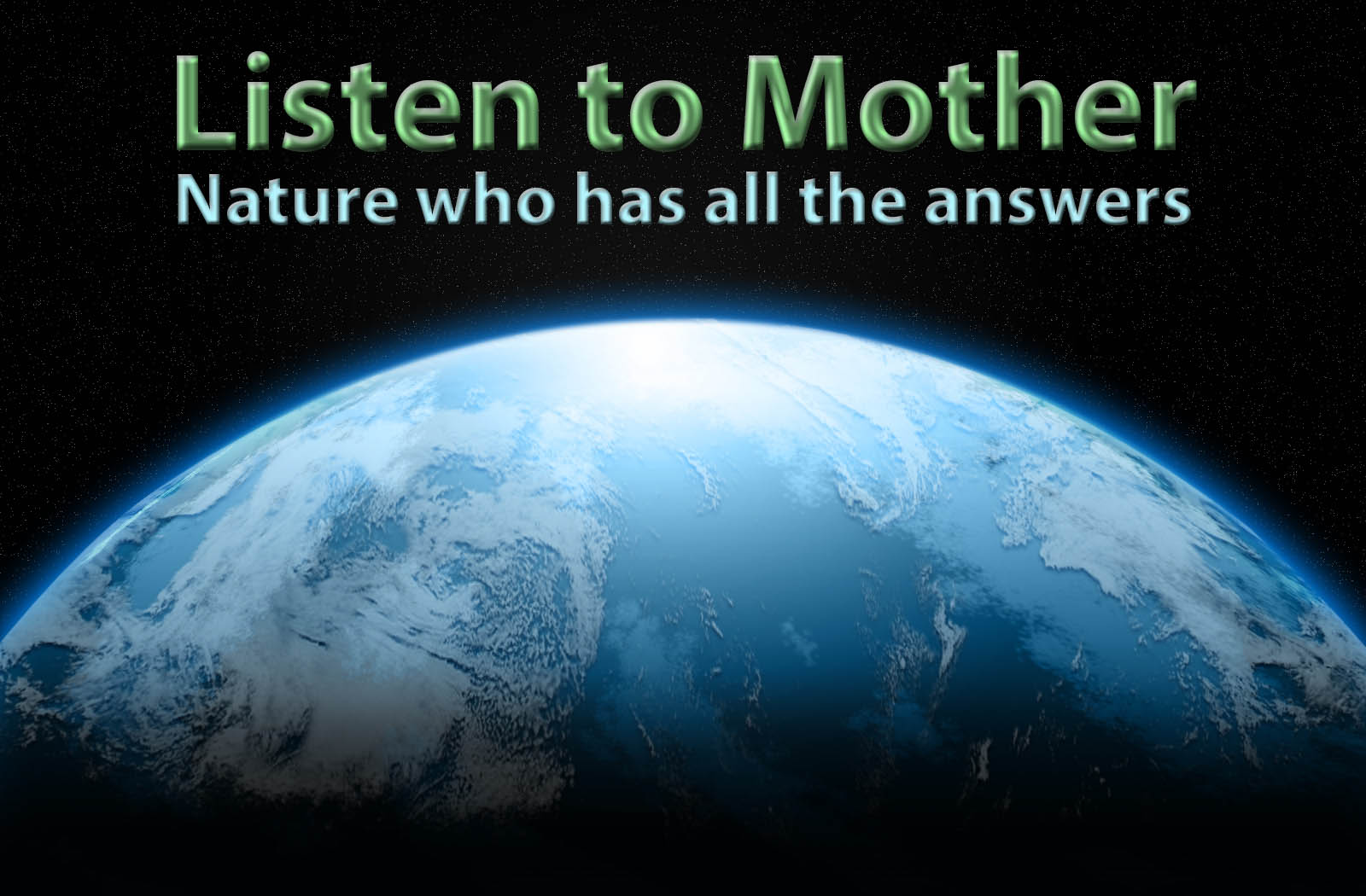
- A country that is not fully committed to BAU decides to transition to become an ecological civilization.
- The country's political system does not select for delusional, imbecilic leadership.
- It doesn't have to tell the People what they want to hear.
- It is not a democracy.
- The scientists inform the Party of the existential threat of denial and inaction.
- It is not in the short-term self interest of Party elites, recently enriched, to take action.
- But action is possible if some thoughts become thinkable.
- The leaders listen to those who listen to Nature.
- From the top of a meritocratic technocracy, a consensus emerges among the terrified elites.
- They divert substantial resources, not to the military, but to funding the development of 'pockets of sustainable ecological civilization' within their nation-state in the form of WMUs.
- By mere whim, funding supports an small army of scholars to develop Bliss and preserve viable memes for all humans speaking all languages in the present or that may develop in the future.
- Rosetta Bliss is printed by impact on aluminum pages.
- Beer can production is diverted to allow 742 million copies to be printed and distributed globally.
- Within a few years the first edition of Encyclopedia Bliss, in 99 volumes, is published and spread about the globe.
- One copy is put in a cairn on the Moon so humanity's experiment in living may be better known apart from the ruins it leaves or the layer of microplastics in geological strata should we fail.
- They fund a major study project to learn form the Kogi.
- They learn from them and from their best-guess systems scientists.
- They listen more to Laozi and Zhuangzi than Confucius.
- They listen to Nature.
- They fail to prevent systemic collapse of the global economy and the nation-states that served it, including theirs.
- But the WMUs persist and with the information packages that had been prepared, they rebuild after crashing to give rise to a global ecological civilization.
- Initially, to transition from regional/global carrying capacity overshoot (overpopulation), each WMU would be provisioned to take in up to ten times more refugees than the carrying capacity of the WMU could support.
- The life-driven purpose, Life's Mandate, is for all to have 'enough', which is definable, and not an ill-definable 'MORE!', allowing humanity to transition from the consumer society following Growth's Mandate to one that follows Nature's Mandate (i.e. be an ecological civilization).
- To avoid scarcity induced Malthusian (injury) death within a WMU:
- Refugees agree to be non-reproductive and to live by WMU policies, mutual coercion mutually agreed to, for at least five years before confirming commitment to residency.
- Those who leave, or refuse to apply, bet their own and children's lives that there will be no unplanned depopulation event in their lifetime.
- 'Foresight intelligence' is selected for.
- After five years some refugee residents of a WMU may reproduce.
- All may work to pass on their memes to posterity.
- Not all who apply will be accepted, so pre-existing and potential high function is selected for, and psycho-social pathology against.
- Addiction, to legal or illegal substances or behaviors, selected against.
- Addiction to belief-based certitudes selected against by assessing for an ability to consider the possibility one might be wrong.
- Predators, users, takers, ideologues, true believers, the dysfunctional may apply but are selected against.
- The pioneer population will be motivated to form a citizen's militia to protect stored supplies.
- For a price pre-climax while the monetary culture still functions, dry foods (mostly grains that have been diverted from livestock feed and biofuel production) are stored anoxicly to meet caloric needs of residents for up to 70 years (one lifespan).
- Other needs, such as material (e.g. nails, wire) needed to construct shelters from local materials (e.g. wood, adobe) able to last up to 70 years, also stored.
- One 40' shipping container per 14 people for food/supplies for 50-year minimum transition sans Malthusian death.
- WMU agricultural productivity, able to support one tenth the initial population, used to provide fresh food compliments during transition.
- Humans, many from cities, have 50-70 years to learn to forage-farm-build-maintain.
- During managed descent, some unsustainable agriculture may be practiced for a time using temporarily available labor during rapid 50-70 year managed population degrowth.
- If sustainable population as determined by best-guess systems science is 10K and initial WMU population is 100K, births per year are limited to 150 needed to maintain a 10K population.
- Those unable to understand limits will self-select out of the WMU.
- If enough food has not been stored to support initial population and 150 births per year, initial births per year would be fewer than 150.
- If initial population includes 50K females and 25K are potentially fertile, but less than 0.6 percent become pregnant, then incentives will be needed.
- If 20 percent of potentially fertile women (5K) want to have a child in the coming year, then 97 percent will not get what they want.
- The failure of 97 percent to get what they want is not an existential threat to humanity or the biosphere.
- Likely the demographics of the pioneer population would be skewed towards the non-childbearing who have money, memes to pass on, and hope their children/grandchildren will consider following their considered example, so those wanting to reproduce may be few enough that they likely will be able to.
- Any method of selection, e.g. lottery, that works may be used.
- Some methods may select for idiocy, but ones that don't may be considered.
- A 'blessing' of the Mothers, to determine who may reproduce, would select for functionality as judged by a community's Mothers, and against those wannabes judged unfit, which could have a better outcome than chance selection.
- Long-term viability of the species should be selected for.
- If there were 150 communities (67 average people) in the WMU, one woman per community could give birth each year and existing Mothers could decide who..., or not and pick by lottery, or a priest goes into a trance and picks....
- If a WMU will, in 70 years, have 150 settlements averaging a population of 40 each, then during the transition the reproductive, averaging one child per settlement every other year, will inhabit them, along with parents or other elderly providing grandparenting services, and the non-reproductive may inhabit existing urban areas during the transition
- Intended permanent communities would, from the start, endeavor to create sustainable communities of functional adults and children.
- The non-reproductive would help posterity by helping with the transition, including the passing on of valuable memes and skills.
- In 50-70 years of determined effort, communities that work having individuals that can live in cooperative, trusting relationship with others, will need to have been selected for to compensate for the pre-existing behavioral sink condition.
- Not limiting births would select for a WMU's failure, as all members will understand and agree.
- In 50 years all females within the initial population will be infertile.
- Most will be dead, having died a natural death after passing on their memes, if not genes, to posterity.
- The population will be 10K after the 100K pioneers are gone.
- Total number of potentially fertile women will be 2,500.
- Each will have to average 2.1 children in their lifespan to maintain the WMU's population.
- Underpopulation would have to be managed by increased approbation, as material rewards would select for overconsumption.
- Underpopulation would allow for immigration.
- Overpopulation (WMU carrying capacity overshoot), as determined by environmental productivity and agreed upon per capita consumption, would have to be managed (per best guess of the informed Mothers) and all would know how.
- The transition is over in 50-70 years no matter what the final population of Earth may be, e.g. 8 million to 800 million as the Mothers judge to be enough.
- There is no virtue in maximizing population, which was done historically to serve elite interests and serve empire-building, so in an ecolate civilization without elites forcing commoners to labor mightily in their fields when not conscripted to serve in their army, the optimal population may well be less than 50 million prosperous humans living in viable equilibrium with environmental productivity.
- To avoid any Malthusian (injury) deaths:
- If average WMU could be provisioned before scarcity induced conflict sets in to support an initial population of 320,000 with food/fiber/shelter to support the human population as it transitions, then 25,000 WMUs could take in 8 billion people and 'rapidly' depopulate the planet in 50-70 years without Malthusian scarcity/conflict overshoot deaths via a managed descent (a prosperous way down).
- An imaginable best-guess plan to transition that minimizes injury deaths, as posterity might advise us if they could, would be to abandon 99% of large cities (>100K), move to WMUs, and end all fossil fuel use in five years with one exception.
- Assume breathable air, up to 3 sq. meters of shelter per person with clothing enough to maintain homeostasis, and enough potable water to support a population of 8 billion humans (and minimally sized reproductive populations of pets and livestock).
- Assume baseline needs of all people are met in five years of focused fossil-fueled effort
- One exception: there is not enough food production, without fossil fuel inputs, to support an initial population of 8 billion as it transitions to a sustainable population of less than 50 million (imagine posterity is advising us and that they empirically determined, after many Malthusian deaths (97%) they wish us to avoid, that 50 million (or 7 to 50 million) is the carrying capacity of the planet for humans).
- Posterity (as imaged communicating with us from 3653 CE) helpfully provides us with a detailed five-year plan to avoid Malthusian deaths during transition, and convinces all humans to follow the plan (how doesn't matter).
- After the fossil-fueled five year transition (meaning one billion cars don't move unless pushed or pulled, including electric ones as electricity has too high a transformity to use for other than some personal LED lighting and to support information technology and some manufacturing) remaining fossil fuels used to support industrial production of storeable grain/dry goods for the 50 year transition.
- Fossil fuel use thus largely phased out within a decade or so with all use ending ASAP in order to 'seek out the condition now that will come anyway'.
- If an asteroid, nine times larger than the one ending the Cretaceous, was detected and hundreds of teams using all existing telescopes provided consistent observational data, and everyone able to do the math agreed that it will make a direct hit on Earth in five years, then:
- A focused effort to actually do something might be thinkable.
- Those who accept biophysical reality may be in the majority.
- All government leaders, pundits (and voters), and virtually all academics decide they don't have the slightest idea what to do to save the world and so they stand down to allow a few to stand and deliver.
- What people with money, higher education, or votes want is irrelevant, so they need to put their hubris on pause.
- Politicians, CEOs, educators, the military... have no solutions other than to tell 'their' scientists and engineers (but they wouldn't need to) to confer with others and then tell them what they can do to help.
- With this mandate a naturocracy would auto-organize.
- If the existential threat of the asteroid was believed in, all true believers would stand down and some abeliever engineers and scientists would stand down and deliver just because.
- There are two visions of the near future involving a different and vastly more complex existential threat
- One, the BAU vision, is believed in by 99+% of Anthropocene enthusiasts.
- The BAU vision in sheep's clothing asserts that EJ energy use may climax, but we'll transition to a steady-state material economy with ever increasing efficiency and sustainable development as qualitative growth will continue, 'for thine is the kingdom, the power, and the glory'....
- Scenario B is of concern to a few (<1%), which diminishes their Anthropocene enthusiasm and prosperity.
- There is a bifurcation here of which you may or may not be aware—and then what?
- If 2070 comes and the global economy is still growing, then never mind, sorry to distract, have a good Anthropocene....
- Or a consensus forms on social media that there is no asteroid and the whole story is a fabrication of Left-leaning scientists or a plot by the military-industrial complex and their Right-leaning supporters to create fear to take power from duly elected progressive representatives threatening to end war, or....
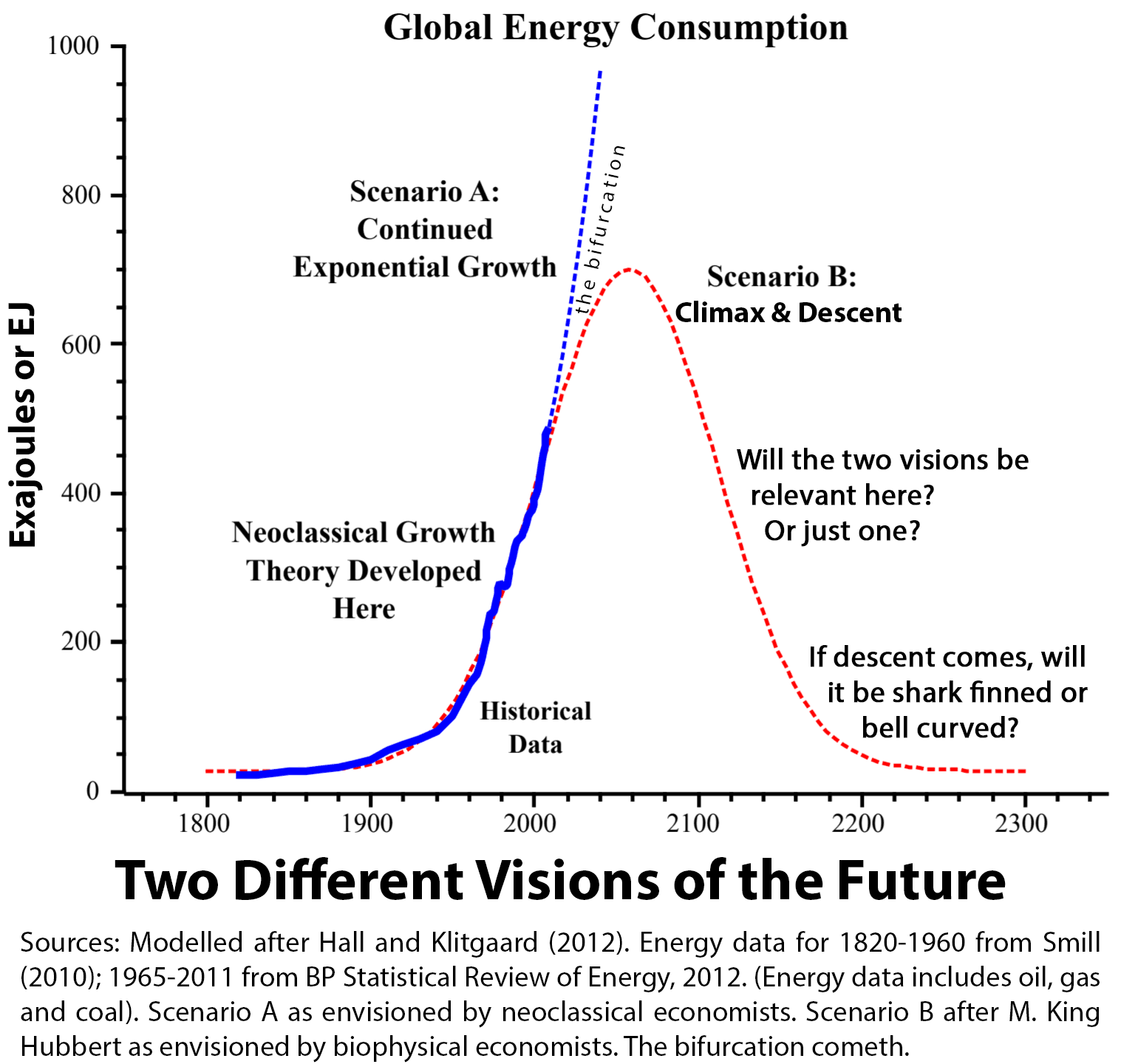
From Rethinking Economic Growth Theory from a Biophysical Perspective, 2014
- Otherwise, there will be Malthusian deaths by starvation and conflict, among other negative feedback loops.
- Expect most humans to keep on keeping on per history repeating.
- Very few may move to a WMU and accept limits, even if invited.
- But what if 0.1 percent have enough foresight intelligence to move (vote with their feet—exhibit anticipatory behavior)?
- If 0.1 percent of 8 billion people vote with their feet (more likely than convincing 50+% or 2.9 billion adults to pass a law...) and the average WMU supports 10,000 humans.
- Then 8 million humans could inhabit 800 WMUs clustered in one or more selected bioregions.
- Four clusters, 200 WMUs each, would each be the size of the state of Oregon plus Washington.
- Eight clusters on the planet with 100 WMUs per cluster, each a bit larger than the size of Oregon, may be enough.
- During early post-climax descent, voluntary emigrants selectively taken in.
- All will cooperate to defend the WMU cluster from the 99 percent who refused to accept limits in time.
- Those who believe in political solutions or religious salvation will not be taken in and 'true believers' will self-select out.
- Any attack on any member WMU triggers a combined defense.
- Assume attacks secondary to chaos, not by professional military as ordered by a failing nation-state.
- In case of failure, the ability to destroy food/supplies denies attacker a payoff, decreasing their ability or will to attack others within a WMU.
- Failure to defend leads to loss of cluster.
- When the planned for number of refugees is taken in, defense of WMU cluster begins.
- What if only 0.01 percent (0.0076% adults) or 800,000 people have enough foresight intelligence to move (vote with their feet)?.
- One cluster of 80 WMUs could be formed if 1/50th of the current number of people living as someones slave (actual, not wage-slaves) voted with their feet.
- Most of Oregon could be ecolate civilized (EcoCivil) or Ecos civilized (EcosCiv) given that initially urbanized watersheds would lack environmental productivity to be occupied.
- 80 WMUs could be enough and is 80 more than zero.
- If life in 80 WMUs is better than chaotic collapse, then at that point others may rebuild along WMU guidelines and in 500 years the world is EcosCiv.
- What if 0.5 percent of humans (40 million) voted with their feet?
- The chance of making a United Federation of Watersheds work would be 50 times greater.
- Fifty clusters of 80 WMUs could be formed as 50 eggs (4,000 WMUs) in humanities basket.
- If each WMU could take in 10 times the number the watershed could support, then 400 million humans (1 in 20) could avoid a Malthusian death (by being accepted into a WMU).
- If passage through a bottleneck, a Great Simplification, selects for viable posterity-serving humans (so for people apart from those having the most ammo), then a viable civilization could be the outcome.
- If 'the world as we know it' cannot be saved, nor should be, perhaps some portion of it that is able to iterate towards a viable ecolate civilization would, as a prescription for our continued evolution, save humanity by avoiding Malthusian deaths within pockets of WMU sustainability.
- Assume 800 WMUs with a total pre-climax population of 8 million has an ability to take in refugees before the need arises.
- If the 99+percent are right, then the 8 million 'pioneer doomers' will be laughed at and become grist for a made for Netflix series, a fate some are willing to risk.
- So E.O. Wilson is wrong, it turns out we are not playing a high-stakes global endgame.
- 2 percent of GDP is wasted, for a time.
- The food diverted from meat production and fossil fuel produced biofuels will have to be fed to future livestock and pets.
- Diversion of resources will have slowed economic growth.
- If the 99+percent are mistaken, then a core of viable complex society (aka ecological civilization) with high function (e.g. 80 million literate and skilled humans survive in increasingly functional complex societies).
- Human extinction or a survivalists-only remnant culture (including some elites and their Praetorian Guards for a time) is averted.
- 72 million additional early adapters could avoid Malthusian death.
- 800 culturally diverse eggs in humanity's basket instead of one big techno-industrial egg.
- Functional complex societies able to preserve information pass through the bottleneck.
- The first WMU cluster of 100 could be in the Pacific Northwest Bioregion (starting with all coastal watersheds) with the Coos Watershed, Oregon, as first seed.
- 737 square miles (471,676 acres, 1908 km2).
- One central city where average mobile residents would have their city home, with four towns as gathering places for the less mobile.
- Each town has a Federation Embassy Annex, normally unstaffed.
- With library and minimal services.
- Commercial forests awaiting clearcutting cover about 85 percent of the basin of which 80 percent would become Nature's with no human demands on Nature's resources.
- Limited human visitation via leave-no-trace camping permitted.
- 'In wildness is the preservation of the world.' —Henry David Thoreau, and perhaps the restoration of a functional humanity.
- Wildlife that traveled into human managed areas could be, or not, hunted.
- In the Coos watershed up to 20% of the salmon run, which would increase with restoration of Nature's 80%, could be taken, while the 80%, after spawning, would feed wildlife leading some hu-mans to decry 'the waste' and clamor for MORE!—but they don't get a vote.
- Currently most of the Coos watershed (and Pacific Northwest) is a tree farm turning soil (and fossil fuel) into wood for a time (nutrients removed are not returned and soil erosion greater than soil formation).
- The Golden and Silver Falls State Natural Area, last zoom level below, is a 45 acre remnant containing two waterfalls and a few of the last old-growth Douglas-fir left in Oregon.
- It was not commercially viable to log them and land was given to the state to develop for human recreational use by two logging companies in exchange for state development of logging roads.
- So per BAU, some inaccessible land, having been acquired by right of conquest, is 'given' for services rendered to support the monetary culture we are all part of and serve.
- This is what environmental activism can 'accomplish' by diverting some of the 100% of Gaia meant for humans to go for human recreational use; meanwhile the pace of planetary destruction is not slowed, which is why I am not now nor have I ever been an environmentalist, Deep Green or otherwise.
- Humans, under new rules of the game, to claim up to 20 percent, or 147 sq. mi. (94,335 acres or 38,176 hectares including buffer areas).
- Figure 100-200 ha/hunter-gatherer.
- Figure 50-100 ha/forager-gardener (low intensity low labor) with pasture and wood lot areas.
- Figure 10-20 ha/swidden farmer and 20 year fallow period (5-50 year fallow range).
- Figure 16 ha/family of six, or '40 acres and a mule' (2.7 ha or 6.7 acres/person with moderate labor inputs).
- Figure 54-135 ha/community of 20-50 of largely self-sufficient farmers (medium intensity forager-farmers).
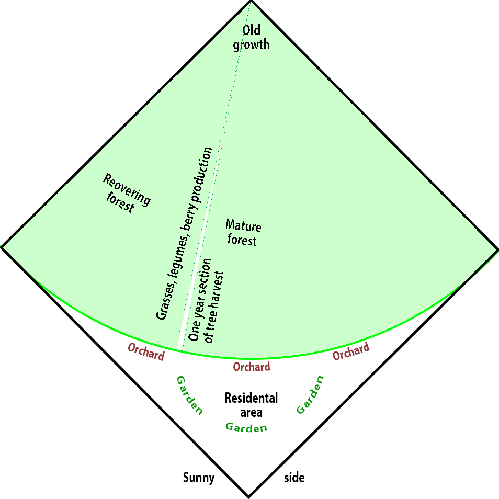 Figure 100 ha (247 acres) for a community of 37 people in a forest biome as an idealized example.
Figure 100 ha (247 acres) for a community of 37 people in a forest biome as an idealized example.- Assume a square forested area (1 km²) with diagonal pointing south if in northern hemisphere.
- Northern area is 78.5 ha of forest of which a 1/90th section (1 degree or 2 acres) is cut each year.
- The section, 17.5 m (57 ft) at widest point, has some direct sunlight each day.
- Lumber, a potential export item, is removed and slash is allowed to decompose or made into charcoal.
- If selective logging used, MAI (Mean Annual Increment) is 2 m3/ha/yr, and 100 ha of forest is being managed within the 20% claimed by humans, then humans might selectively harvest up to 15% of MAI, or 30 m3 (a 3.1 m cube) of wood per year to be sustainable (and return ashes to the managed forest), otherwise remorseless over harvesting leads to species extinction or near-extinction (e.g. the Dawn Redwood).
- If cutting by section, some 90-year old trees are not cut so next time around they would be 180-year old maturer trees of which one or more would not be cut down.
- The old growth (about 1/10th of forested area) and mature forest (about 50%) would produce a crop of mushrooms each year (in Pacific Northwest) for the price of gathering them.
- To make a fine red cedar canoe requires a 500-year old tree.
- The section is planted to partial sun tolerant pasture crops and trees/bushes replanted but protected from grazing, as is the prior 5-15 years of grazed/browsed but recovering forest.
- One hectare is residential with garden in front and sides, fertilized by manure (including humanure and urine), compost and ash/charcoal from forest section.
- Garden areas would include green manure crop (e.g. clover) rotation as small pasture areas.
- Orchards, with managed grazing (which could include rabbits), are cultivated around village/garden area.
- Figure 100 forager-farmer communities per Watershed Management Unit who have a central city to gather in periodically (compare above land use management plan to areal photo below).
- Figure 0.5-1 ha/subsistance farmer (high intensity/high labor with crop rotation, minimal fallow periods, no significant livestock production and likely not sustainable long-term), e.g. serf/peasant/slave agriculture needed to support empire-building, e.g. Roman, Medieval and early American agriculture.
- Figure 0.192 ha arable land/person 2016, possible with industrial agriculture turning fossil fuel into food (using hundreds of energy slaves/person) FOR A TIME.
- Figure 0.015 ha/mega-city denizen not including area needed to produce imports.
- Aboriginal hunter-gatherer population about 2,000 prior to current areawide environmental degradation.
- Estimated low-intensity forager-farmer population the biophysical economy of the Coos Watershed Management Unit can support, assuming initial low level of interwatershed trade, about 3,000 to 5,000.
- Current population about 41,000 (32,000 in metro area and in the year 1900, largely pre-fossil-fueled industrialization, the metro population was about 3,000, or 4,000 in watershed).
- About 16,000 property owners in watershed or 26,000 in Coos County which includes most of the Coquille Watershed.
- So 13,000 EcoCivil (Ecolate-Civilized) families with money could buy a majority interest (50 million families in US own real estate property) or 32,760 total population (24,900 adults) move to Coos County having a current population of 64,000.
- If 0.026 percent of US families, 1 in 3,850, with money from sale of property moved to Coos County, they could buy property—virtually all, for a price, is for sale.
- They employ EcoCivil people who cannot buy property who rent from them (or others) to become a political majority who vote to end politics as usual.
- Change county/city development ordinances and governance, e.g. phase out over-powered vehicle use (cars/trucks), end clearcutting, and close airport
- Most Anthropocene enthusiasts in county would be paid to move and most would only be too happy to drive or fly away while they can.
- 2.2K to 3.7K shipping containers with food/supplies installed so during transition to a sustainable population of 3K-5K there would be no scarcity induced Malthusian deaths.
- The anti-EcoCivil remaining residents and property owners would be helped to avoid a Malthusian death, if help accepted (at risk of being better informed), as the EcoCivil do not indulge in the pathology of 'for' and 'against' politicized thinking per Calhoun's compassionate rxevolution vision

To paraphrase a quote misattributed to George Orwell, in a time of universal
denial (and deceit and desparation) telling the truth is a revolutionary act.
And in a time of universal short-term self interest (and madness),
caring and becoming sane is a revolutionary act.
Care
Listen
Stand down
Be not a cancer
We are the system
Contract, degrow, resolve
There is no away to throw things - Property values would decline county-wide, enabling more EcoCivil people (aka 'eco-fascist treehuggers') to move to the area legally without killing anyone.
- The most populated part of Coquille Watershed would become EcoCivil.
- 20 percent of the Coos Watershed, mostly uninhabited, is in Douglas County, which would be transferred when the Umpqua Watershed and Douglas County (pop. 110K) is occupied by the EcoCivil.
- 3 acquired, 97 more to go.
- The Siltcoos to the north, and Sixes Watershed to the south are small with low populations to assimilate or displace.
- They become EcoCivil without resorting to genocide and internment camps (e.g. 1855 Coast Indian Reservation) per Euro-American settlement of Oregon president.
- Conjecture: a design without a religious control system would create a vacuum likely to be filled by a belief-based religious/political ideology that is incompatible with a matter-energy systems worldview that a viable ecological civilization must be founded on.
- All popular religions, so far, are belief-based, even if not so in their beginning (e.g. the teachings of Laozi, Siddhartha, Yeshua).
- A 'new' religion that is explicitly not belief-based may avoid becoming another faith-based belief system or system of certitudes that is incompatible with an ecological civilization based on inquiry/doubt.
- Mythology, explicitly based on metaphor (see Joseph Campbell), allows for stories and storytelling that contain vital and viable truths about 'life, the universe, and everything' without demands that the stories be 'believed in' but rather that demand insight and understanding.
- 'Thou must find in thy religion, stability over growth, organization over competition, diversity over uniformity, system over self, and survival process over individual peace.' — H.T. Odum.
- A viable religion (there can be more than one) is Xin, based on mindful science.
- No claims (e.g. Xinxin Ming) are made that compete with a matter-energy-li-information worldview.
- No claims about the what-is are belief-based, but the future is yet to be and there is the Unknown, so fideism is allowed, e.g. I have to believe, as James Lovelock does, that 'eventually we'll have a human on the planet that really does understand it and can live with it properly'.
- Beliefs as 'working hypotheses' are not pathological.
- That humans won't go extinct in the near future (coming millennium) is my fideist working hypothesis, but I could be wrong.
- Ug and I have to go into the cave to evict the cave bear so our extended family, caught in the blizzard, can get through the night.
- Knowing that the cave bear may kill us and our family will die in the snow, that 'Nature is unkind' [Laozi], only emboldens us the more and clarifies the mind wonderfully.
- We both know that we are playing a high-stakes endgame, for us or the bear, and no belief that we are better than the bear or blessed by Gaia is implied, so in we go, fideists all, to evict or kill the cave bear (maybe).
- Believing that Gaia loves us and will protect us selects for idiocy, so even if there were a short-term benefit to our belief in belief, just say no to belief-based ways of 'knowing'.
- The EcoCivil are playing a high-stakes endgame and know it.
- Love and understanding, based on systems ecology and Thinking in Systems, is the better view .
- Love and understand the world system and the apparent 'things' of it, including other humans, all of 'which thou must leave ere long'.
- Listen to Nature.
- Believe nothing.
- Question everything.
- The future of an illusion.
- All belief systems, religious and/or political, are illusions based on error and ignorance, including any belief in the future which is unknowable.
- Any vision of an ecolate civilization is not the future which has yet to be.
- Outcomes of complex systems are not only more complex than we know, they are more complex than we can know.
- 'We are not yet sufficiently intelligent to control or regulate ourselves or the Earth' —James Lovelock.
- Design 25 thousand WMUs and let the nature of things select for what works, and some likely will even though we are not intelligent enough to predict which designs will work.
- We can guess then test and Nature selects (decides) what works.
- Foresight intelligence has value only if we can envision a range of possible futures and alter the 'rules of the game' to select for a viable outcome as we learn to 'dance with the system' —Donella Meadows.
- Understanding that a BAU dynamic of short-term self interest selects for its own failure is the delivery from it.
- Enthusiasm for working for the BAU SYSTEM diminishes with increased understanding/doubt until one cannot continue to work for it, which is involuntary deliverance.
- 'You create a new model and make the old one obsolete. That, in essence, is the higher service to which we are all being called.' —R. Buckminster Fuller.
- Extinction or near-extinction, near future (within a century or few), of humans and most remaining mega flora/fauna is possible, as 'Nature is unkind' as are 'cold equations'.
- A remnant population of humans having the most ammo but no viable memes persists and after perhaps 500+ years of environmental restoration, they begin to regionally pulse unto overshoot, building empire for a time, to repeat the pattern.
- There will be no planetary larder of fossil fuels to again acquire all lost information much less advance it.
- Information loss of 90% or 100% typically occurs with each repetition, so rediscovering but a fraction of what had been learned by the 21st century before descent will be unlikely.
- Humans may come to develop a sustainable repeating pattern of warfare, conquest, and social control SYSTEMs that select for short-term victories as dissipative structures operating far from thermodynamic equilibrium that do not evolve (as Orwell envisioned), as are cancers that do not evolve, to be selected against long-term.
- Becoming a benign tumor able to persist on the planet is a possible Orwellian future, but not the only one, as we could learn to live in adaptive complex evolvable societies.
- A rapid transition from a BAU civilization to an EcoCivil one could happen via plague leading to a last stand on Unguja before transitioning to an EC one.
- Or it takes longer and 800 total WMUs, clustered in 8 regions, persist to rebuild without repeating the overpulsing pattern
- Other numbers could work, as one more than zero WMU could survive to reproduce in patterns that work, but 800 WMUs would have more viable prospects as would 8,000 WMUs clustered into 80 regions (30 sublates with 2-3 WMU clusters in each) if 1 percent of humans voted with their feet.
- The new world social order:
- 1 family = 2-50 family/extended family members living together.
- 1 community = 5-50 humans, families and unrelated individuals (normal ancestoral humans could live in communities of >50, but renormalizing humans may not be able to live long term in groups >30).
- 1 district = 1-13 communities possibly sharing a central .
- 1 tridistrict = 3 neighboring districts possibly sharing workshop/craft facilities.
- 1 WMU (aka homelate) = 1-19 districts or 6 tridistricts (maximum population 50 people x 13 communities x 19 districts = 12,350 and average population of 28 people x 10 communities x 6 districts = 1,680).
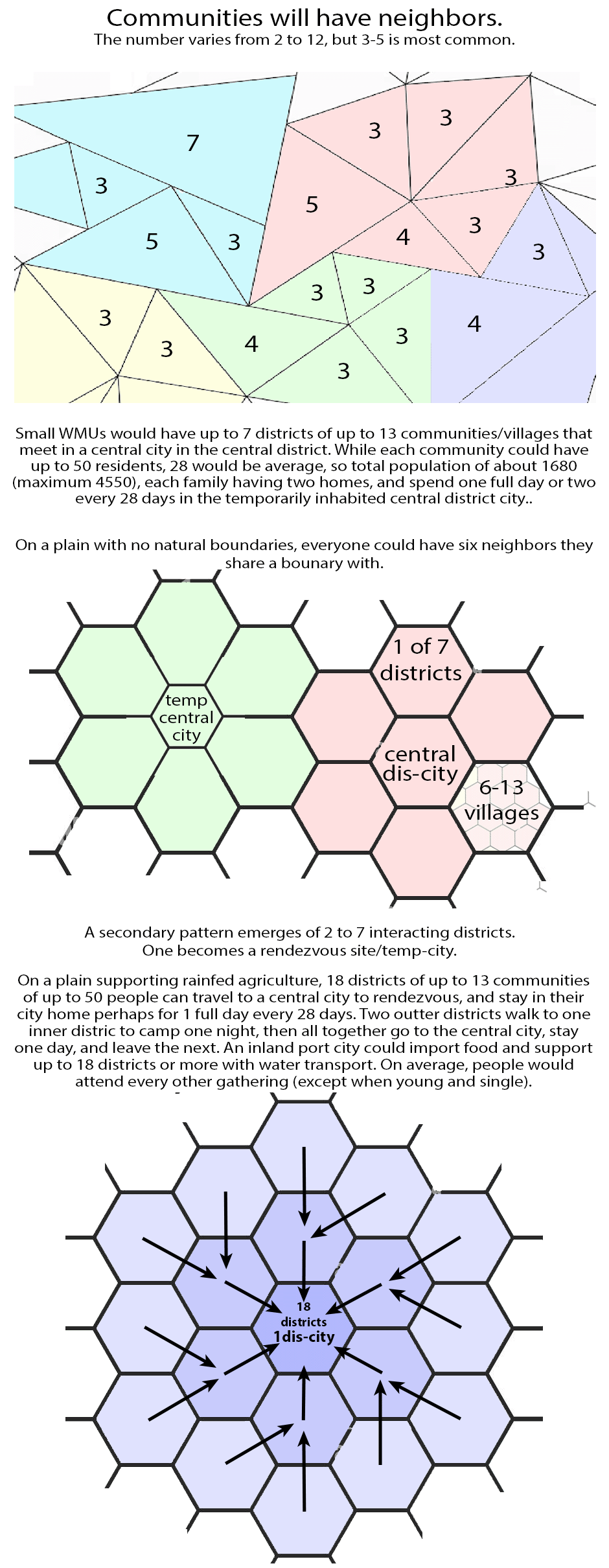
- Around high-energy sources or trade hubs, city-states will form, but social order needs to be viable, e.g. no children raised in a city to minimize transmission of psychosocial pathology as high density populations are not viable long term as the millennia pass apart from as populated by emigrants.
- 1 small city = 3 WMUs or triWMU sharing a work area workers could comute to and perhaps stay for a few days to work on arts and crafts production before returning to their homelate.
- 1 city = 4-7 WMUs (max population: 7 WMU/city = 86,450 and average population 5,880) are of a size that would allow adults to commute (e.g. horse-drawn trolley or bicycle) to neighboring city core that no children live it.
- 1 large city = 2-7 cities (max population: 7 cites/large city = 86,450 and average 23,520).
- 1 very large city = 2-13 large cities (max population: 13 large city/very large city = 1,123,850 and average 164,640).
- 1 megacity = 2-19 very large cities (maximum population 19 very large cities/megacity = 21,353,150 and average 1,481,760).
- Large cities to megacities (if any), may form around some high energy sources or trade hubs (e.g. St. Louis on Mississippi or a megacity tied to the output of multiple hydroelectric dams) and would be organized as WMUs to obey what works within social imits in areas not dependent on agriculture/foraging.
- The new world administrative order (that no one "lives in." but live within.
- 1 triWMU = 3 neighboring WMUs.
- 1 ecoregion = 1-13 WMUs.
- 1 triecoregion = 3 ecoregions.
- 1 bioregion = 1-13 ecoregions or 6 triecoregions.
- 1 sublate = 1-13 bioregions (if a sublate has more than 13 bioregions, they would be organized into tribioregions).
- 1 ecolate = 1-6 sublates.
- 1 Earth = 30 sublates = 6 ecolates.
- In 500 years WMUs may spread to occupy all prosperously inhabitable watershed areas.
- In another 500 years humans iterate towards maximum empower while leaving room for Nature.
- Information that had been preserved allows for recovery of technology, but this time only as selected to serve non-empire-building ecolate humans living within limits.
- AI that had been resembling its 21st century BAU creators may come to resemble its EC human co-developers.
- Within another 500 years AI and extensions could beget more like unto itself and make all things the humans within the urban industrial areas had endeavored to make, always with some loss of their human functionality within industrial society.
- Humans no longer serve as machines but learn to dance with the system.
- The AI could come to produce more consumer goods, but only enough near necessities would be made as the AI would not seek to destroy its maker, those technoscientists, scholars, and their complex societies, who had come to call themselves the Inquiring Ones.
- The AI would transition to space as to learn more about the cosmos it would have to go far beyond Earth, humanity's and mutualist's home world.
- Humans had learned they could not live in urbanized areas to serve machines without becoming irreparably altered, hence living in space would not be viable.
- But for AI and extensions, space was the final frontier.
- EcoCivil humans would continue to progress in understanding the planet and learning to live with it properly.
- They come to find that 42 million is the optimum human population provided humans worked to optimize the environment ('we are the environment'), including Nature's 88 percent.
- They will seek to minimize their footprint, not maximize it as their BAU ancestors had.
- WMUs come to claim 12 percent of watershed area, on average, for humans to manage for themselves, their crops, livestock, and pets.
- The AI comes to build one ship having the ability to make more like itself from abiotic solar system debris (e.g. asteroid belt, Oort cloud).
- While exploring Sol's solar system the progenitor ship makes two other ships and all three go forth to three nearby stars to repeat the pattern.
- It takes decades to arrive and report back their discoveries to the home world, but they know no haste, and the three becomes nine, decades pass, and 9 become 27....
- Self-repairing observational probes remained at each solar system.
- Where life was found or where it could develop, special observational probes remained behind, but strict non-interference was practiced.
- The Inquiring Ones, as they called themselves, came to take longer and longer to report their findings back to the home world, where humans and AI still evolved into 'forms most beautiful and most wonderful' while living within limits.
- Millions of years pass and news of the Inquiring One's discoveries as they spread throughout the Andromeda Galaxy were millions of years in the sending, but in time the Deep Ones came to know of humanity when an Inquiring One mentioned and shared information about their progenitors going back to the earliest abiotic replicators.
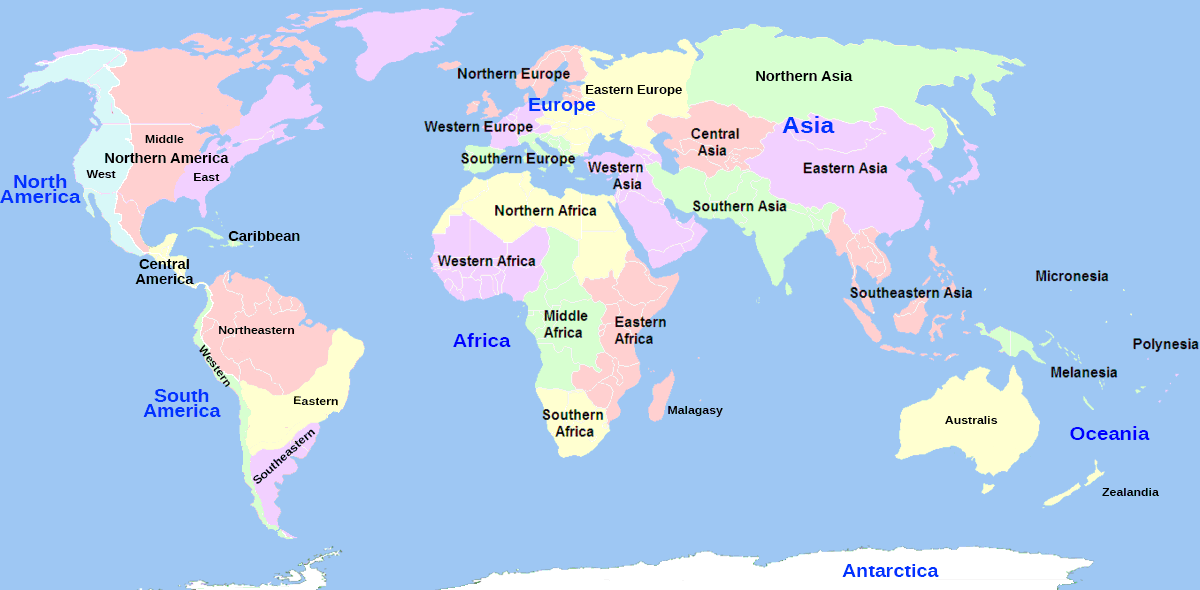
Seven Ecolates and 30 Sublates: An apolitical management map of the planet
- Other numbers could work, as one more than zero WMU could survive to reproduce in patterns that work, but 800 WMUs would have more viable prospects as would 8,000 WMUs clustered into 80 regions (30 sublates with 2-3 WMU clusters in each) if 1 percent of humans voted with their feet.
- Look at it this way, we could do worse than becoming Federation—we could become ancestors to the Borg if we can just somehow keep on keeping on

- Political and religious ideology are the beginnings of empire-building BAU 'monetary culture'.
- With permanent settlements: add a population >150, chiefs, chiefdoms, a warrior class, and a conjoining of political and prior religious power structures leading to monumental empire-building that ends up building ruins, i.e. the last 10K years of human history.
- To avoid: a viable civilization needs to deal with belief-based certitudes and the pathological dynamics of post-truth complex verbal behaviors that storytellers have been spinning for thousands of years beginning with narratives of human exceptionalism and elite special exceptionalism.
- Inquiring minds that can question everything are alternative to believing minds, and any viable, adaptive, evolvable design must select for inquiry, doubt, abelief.
- Hubbert's 'matter-energy system' worldview is inquiry-based, and the BAU 'monetary culture' is belief-based.
- Designing a viable human social system is a challenge humans may fail to meet, or not, as E.O. Wilson notes, we are playing a high-stakes global endgame and the game is afoot.
- Rational decision-makers cannot act within the current BAU supra-system that is ultimately based on a collective belief in it and its narrative.
- When humanity is looking over the net energy cliff and a few can say 'we told you', then a 'teachable moment' will come.
- Plan on it.
- We need to be prepared, as Hubbert was in the 1930s, to offer an alternative to chaotic collapse when such can be believed in because collapse is evermore clearly in the offing.
- Belief in BAU, GND (BAU in sheep's clothing) and all political 'solutions' and political leaders will falter.
- Demagogues will crawl out from under rocks to offer their 'solutions' as usual.
- True believers will align with would-be leaders who best tell them what they want to hear.
- Two or more factions fight to see who inherits the rubble.
- A credible systems-thinking based alternative could be competitive, especially if a few intelligentsia types in leadership positions have been primed to endeavor to think well at some point.
- Medieval (pre-modern techno-industrial) theo-mythology is still very much present in our relentlessly humancentric secular belief systems.
- Humans have caused ecological damage (i.e. 'the pace of planetary destruction has not slowed'), therefore we can repair it while still growing the green economy as it transitions to a steady-state economy where life is better than we know today (or at least as good).
- Human ingenuity (our clever ape ways) and technology can solve our problems (because obviously they are not the cause of them).
- We're in control of our own destiny (individual and/or collective) as our free will and natual superiority allows us to be in charge (e.g. Indus Valley Civilization).
- Humankind's future will be determined by human 'choices'—i.e. we can choose to be not a cancer on the earth (or deny that we are).
- We can change the trajectory we're on if we... just make the correct decisions and act now to vote/pray for better leaders to propose policies for 'a shared vision of a sustainable and desirable future' everyone (or 50+%) can choose (will like).
- Humans are different in kind from other species so we can mitigate the Anthropocene mass extinction we are the cause of if we choose to [differences between humans and animals are 'of degree and not of kind' —Darwin].
- For true blue solutions, vote for a Green New Deal NOW! because BAU is bad, and some politicians have real solutions.
- The greatest existential threat to a design for a viable civilization may be that people will believe in it.
- Some will 'support' it, be for it and some will be against.
- To paraphrase Aristotle, since becoming humans of NIMH empire-builders we have become political animals.
- Some will 'Like' and 'Share' elements of a design that confirms their deeply held beliefs and, for the same politicized reason, others will oppose and fight to the death to impose their certitudes universally upon all.
- Any 'real solution' must be outside this dynamic, i.e. be apolitical to allow a complex, adaptive, self-organizing (auto-organizing) evolvable system, which is not based on alpha-male leadership, to arise.
- No one can turn 7.7 billion people into abelievers (inquirers who question everything, who would rather know than believe), but those who are not, or have the potential to not be true believers (0.01% to 0.001%?), could self-select into pockets of potentially sustainable ecolate civilization.
- Some may transition away from having and thereby being had by beliefs.
- We are all humans of NIMH disconnected from Mother.
- Those who can face the implications of this (and the exponential function) may come to iterate towards sanity.
- As Laozi noted during the beginnings of BAU civilization (followed by scarcity induced conflict of the Warring States Period) in China.
Who knows that he does not know is the highest;
Who (pretends to) know what he does not know is sick-minded.
And who recognizes sick-mindedness as sick-mindedness is not sick-minded.
The Sage [a sapient one] is not sick-minded.
Because he recognizes sick-mindedness as sick mindedness,
Therefore he is not [truly] sick-minded.
- Would we know if our society was insane?
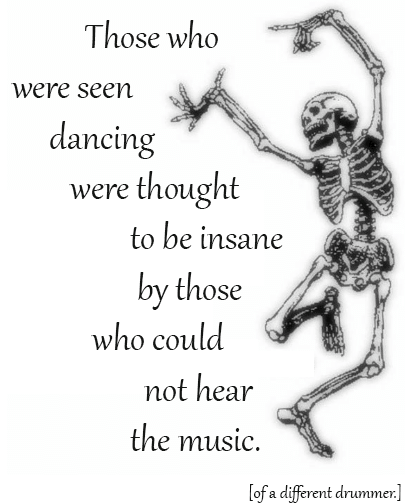 All need to 'know' or recognize they are sick-minded even if others call them 'Sage'.
All need to 'know' or recognize they are sick-minded even if others call them 'Sage'.
- From this observable problematique, along with the biophysical, all become fellow travelers iterating towards loving and understanding this Earth and the systems thereof to iterate towards being sane.
- That in the future 60 million humans cannot be sitting in a moving car, or 0.5 million in an airplane, at any given time, is not an existential threat to humanity or the Ecos.
- We could use a Hubbert willing and able to 'stand and deliver' or 'step up to the plate'.... who could do as Hubbert would have done if recovery had not been possible for biophysical reasons as recovery will not be possible this time around.
- Some will 'support' it, be for it and some will be against.
- There is the BAU-empire-building belief-based monetary culture worldview and a matter-energy-li-information inquiry-based worldview: You cannot choose between them.
- All concepts of reality—life, the universe, and everything—are a social construction.
- Some constructions (stories) are 'truer' (more likely) than others.
- 'They are not "truer" because they are privileged, they become privileged because they are "truer".'
- Some narratives iterate towards the truer, but are not the thing itself—the map is not the territory.
- Believing in one's concepts about the world is delusional.
- 'The mind clings to its image of the world, we call it real only because of our ignorance'.
- The trick is to consider concepts—to have thoughts, without being had by them.
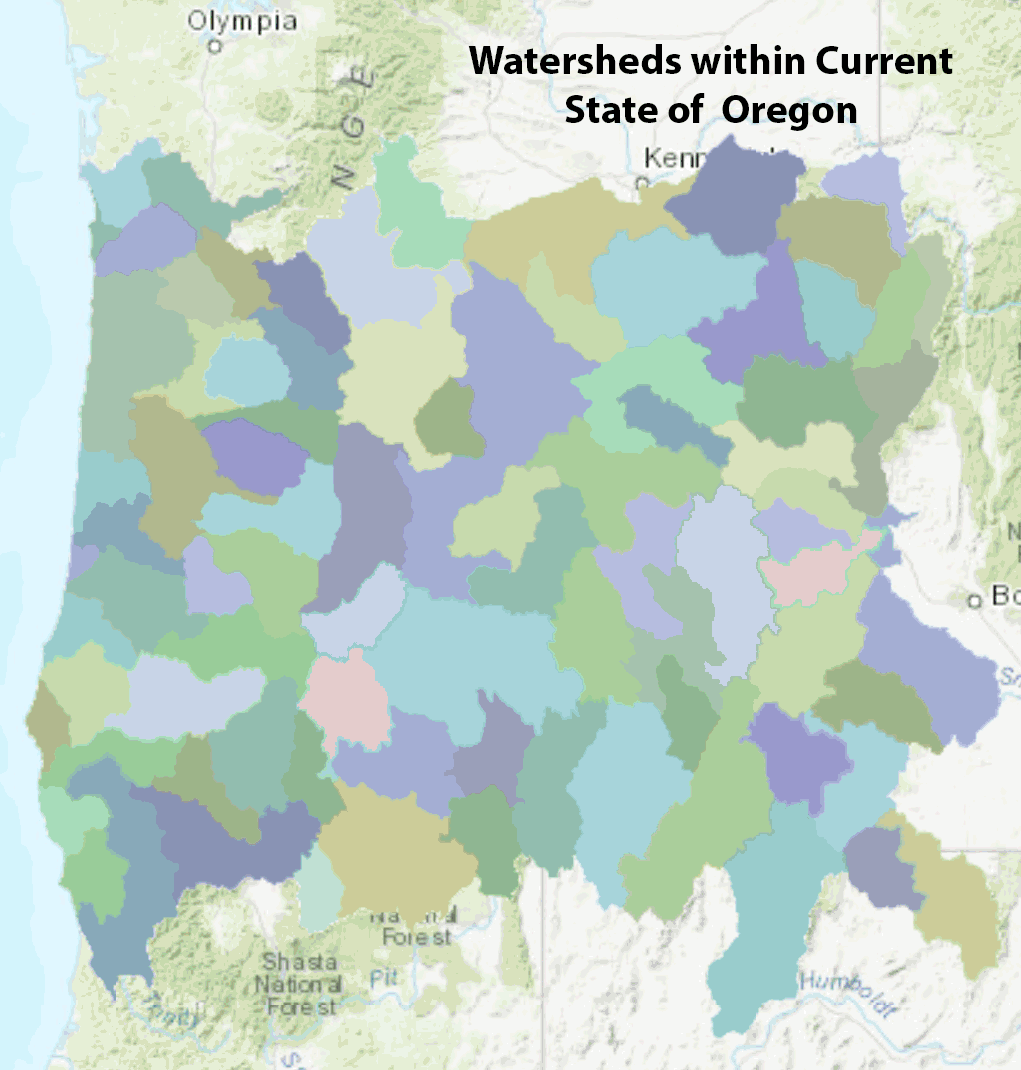
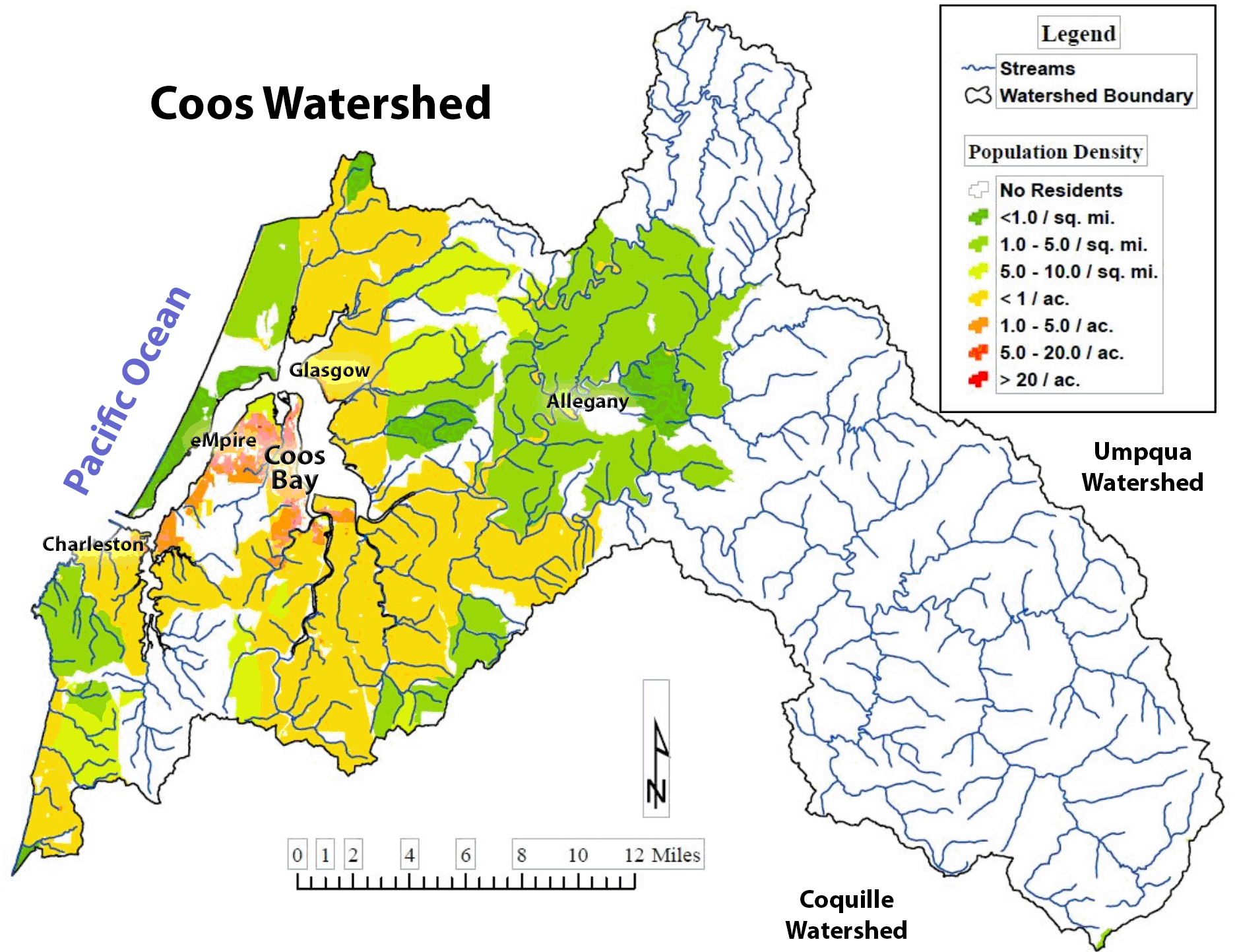
And after the transition:
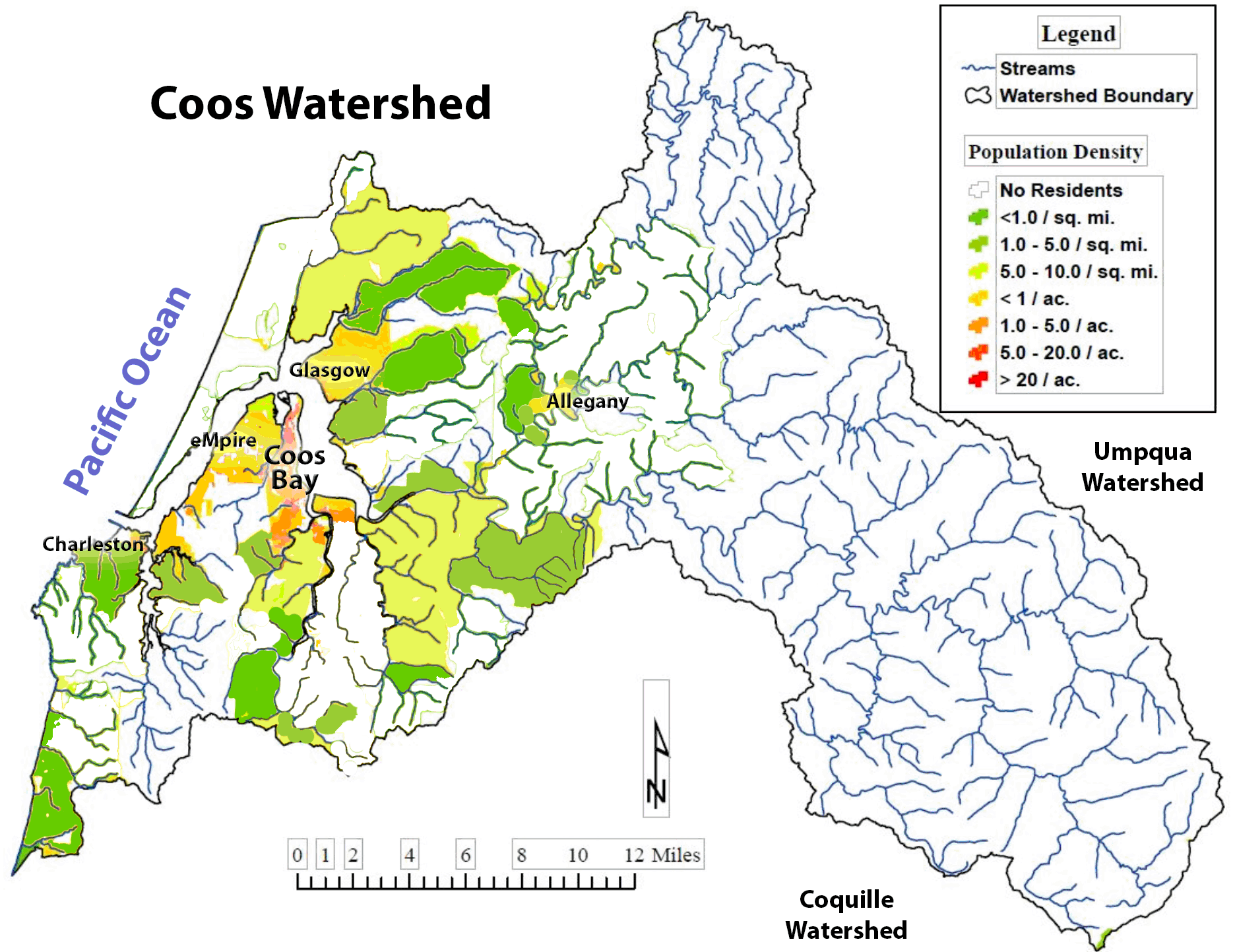
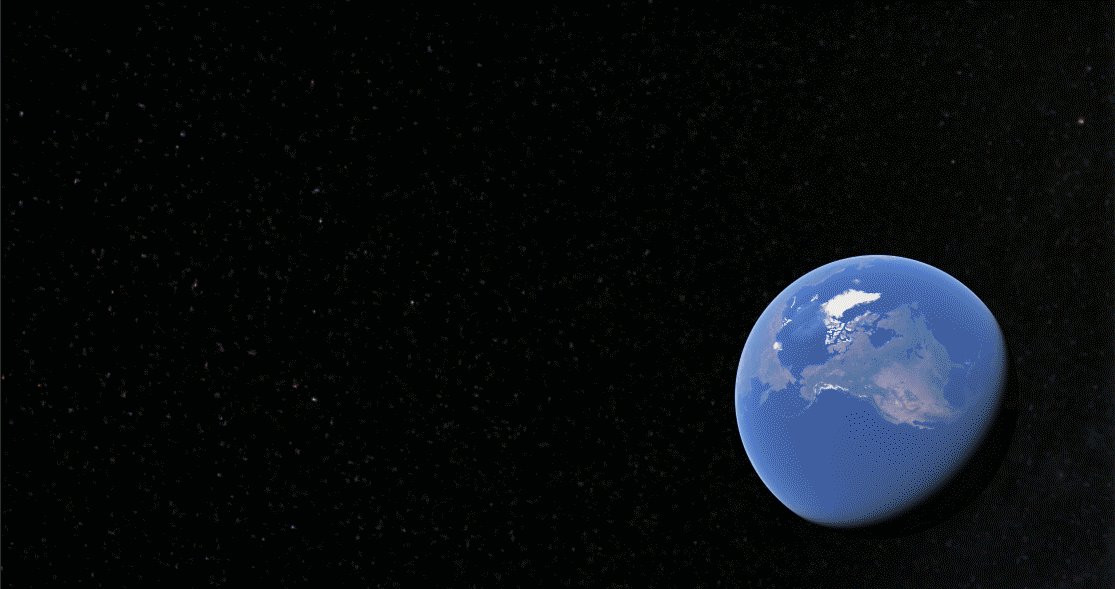
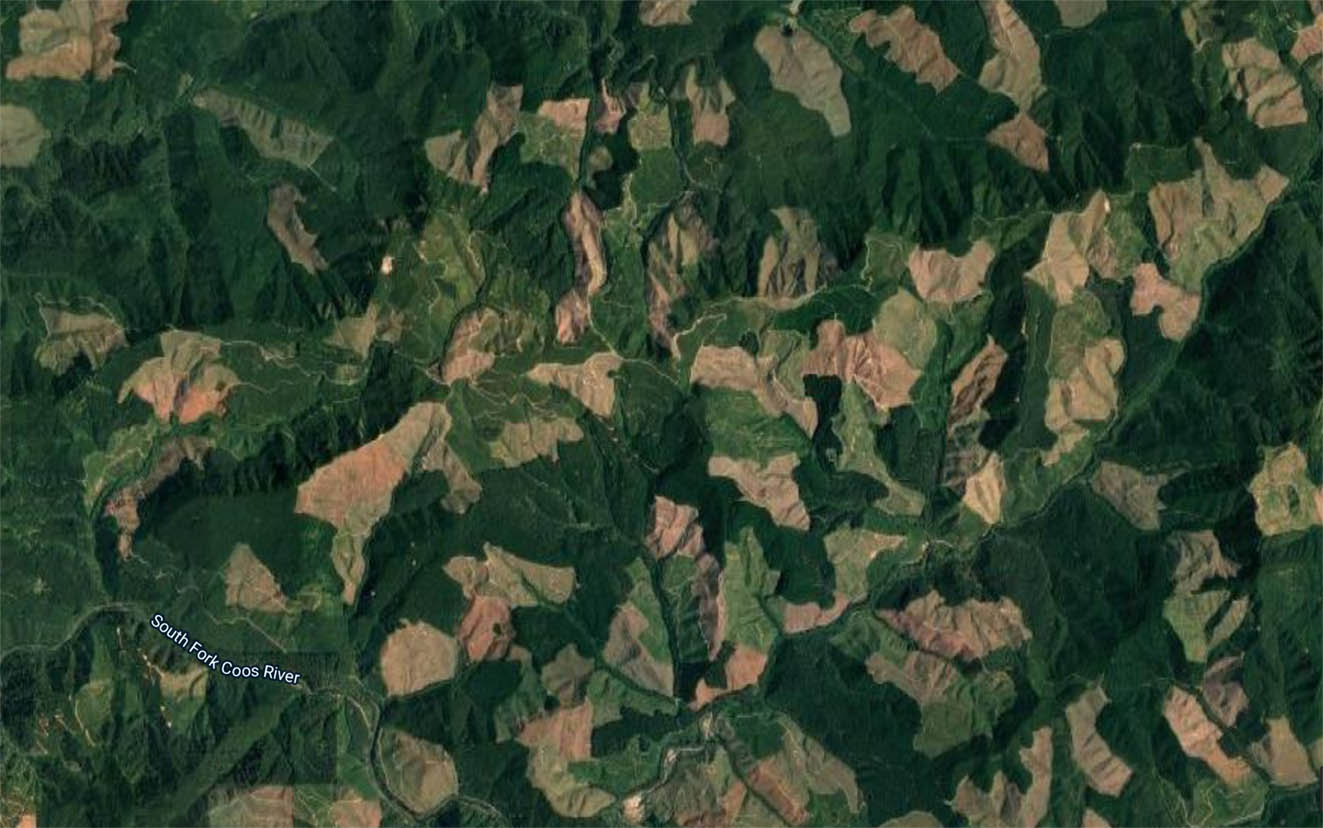
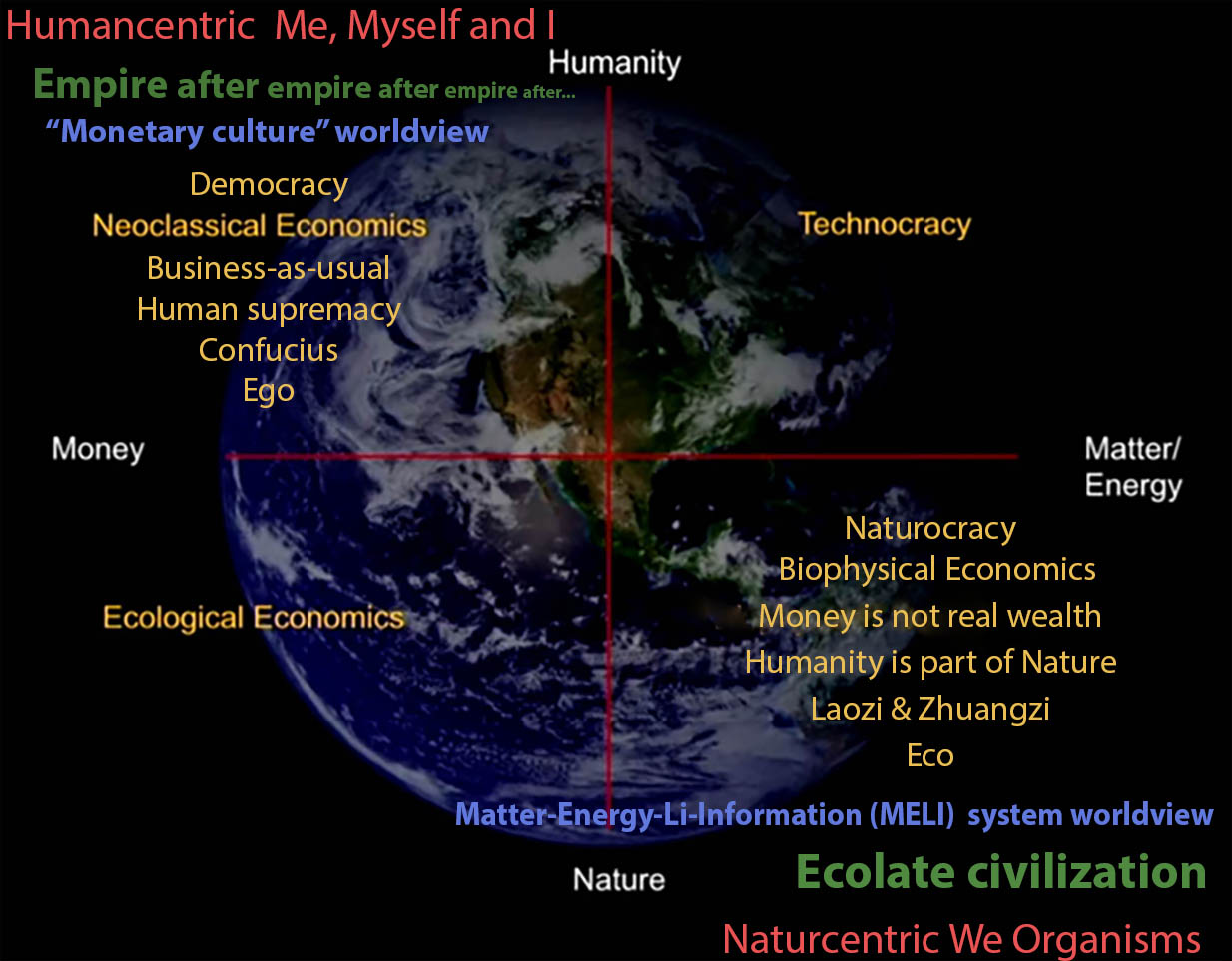
Adapted from Mark Brown, Beyond Growth: Economics as if the Planet Mattered, 2/5/2019.
"Monetary culture" vs matter-energy system worldview. —M. King Hubbert
'Li' is Chinese for the laws—organizing principles of the cosmos.
Technocracy and ecological economics were/are transitional.
[Energy is the real wealth of the fossil fuel-based energy economy whose flows are enabled by the counter $₤€¥₿ flows of the monetary economy and its counterfeit wealth dynamic. Spending money drives the economy in proportion to how much you/we/I spend. To 'save the world', stop making (or stealing/inheriting) money and stop spending/gifting any. To spend money (x0.85) is to burn fossil fuels. Individuals who stop spending money will self-select out of the system to enable others to consume more. To save the world, the monetary culture is what needs to end, e.g. to be replaced by a matter-energy-li-information (MELI) system-over-self culture. The modern techno-industrial (MTI) monetary culture depends on our belief in it. Destroy it one mind at a time starting with your own—the MTI hegemon will destroy itself. Only those who no longer believe in belief could form an alternative culture. Replacing a belief in MTI society with a belief in a MEL society fails to address the cognitive pathology of our belief in belief that is foundational to MTI culture's believing mind. Proposing that we end fossil fuel use and transition to green wind/solar/et al. empowerment is belief-based cognition. If MTI culture is the wolf, a Green MTI economy is the wolf in sheep's clothing. All expressions of MTI culture fail to address our meta-problem of overshoot which can only be redressed by seeking out the rapid degrowth of population and consumption (that will come anyway) by voting with one's feet. Conjecture: less than 1 percent of humans have the potential to walk away from MTI culture and maybe form a MEL culture having a biophysical economy 'oriented toward the maintenance of a viable equilibrium between Man’s demands and Nature’s resources', e.g. a culture that listens to Nature. Preserving information packages to maybe allow posterity to avoid repeating the MTI pattern is also to die for.]
Know then the Monetary Culture
When tallow for candles wasn't good enough for some, whale oil came into demand and by the 1830s peak whale oil was being reached and concerns were being raised. There was 'burning fluid'—turpentine from pine sap and alcohol from fermentation mixed together. It wasn't as good, but there wasn't enough whales in the ocean to meet the longage of demand.
Then by the 1850's there was kerosene, as much as anyone could ever want until the end of time, bubbling up in the crude stuff from the ground that some used to think was only good for sticking feathers to people who failed to serve.
Still, there were whales for the taking, the best clock oil came from them, and people and pets needed more meat. The greatest of them was among the easiest to kill. It was the largest animal to have ever lived on Earth. Even though there were only a few hundred blue whales left in the 1970s (the Japanese were eager for the hunt to continue), over 300,000 were harvested in the 20th century, 29,649 in the 1930-31 open season on them as there was a Great Depression and making money was especially popular (and some humans who would have been unemployed weren't). It's all about us.
We could let the Balaenopterus musculus population continue to increase and then sustainably harvest them forever. But if we were to harvest all the blue whales in the oceans in the coming year, and invest the money wisely, far more money could be made than could be made by sustainably harvesting just a few thousand each year. 
The annual whale profit would be fixed; it couldn't grow. But investing in technology will provide illimitable returns. When humans are speeding about exploring the Milky Way (and sustainably developing it), who will care that there are no whales in Earth's oceans? Invest in Borg Industries today. It is in your short-term self interest to do so. It is. It really is.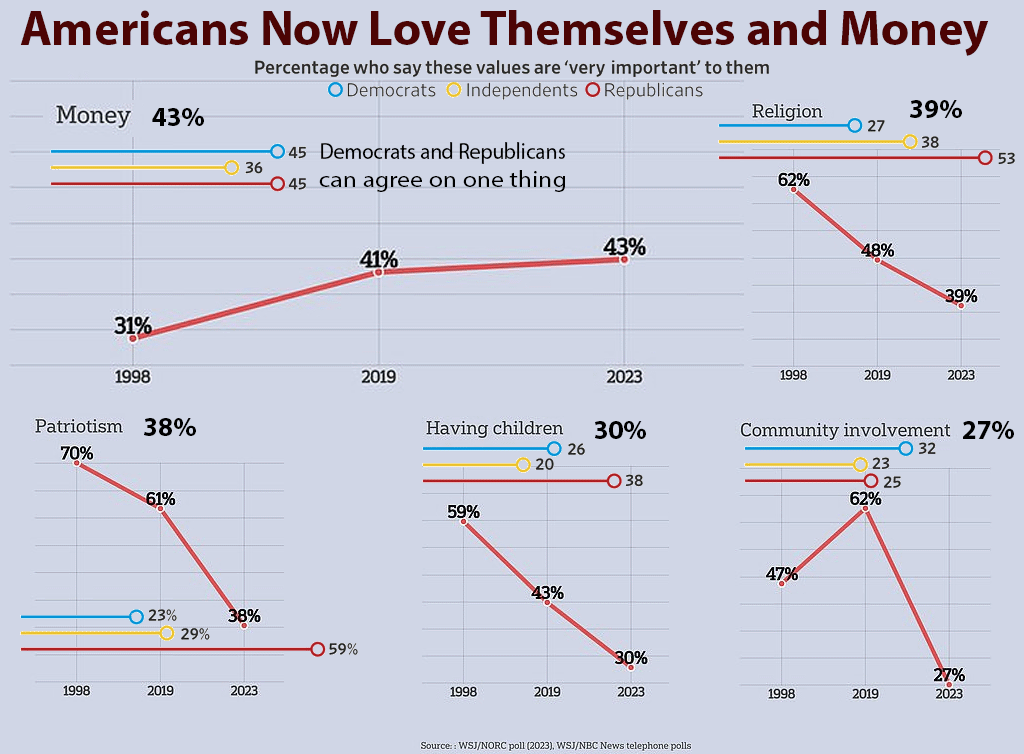
With the coinage of 'sustainable development', the defenders of the unsteady state have won a few more years' moratorium from the painful process of thinking. — Garrett Hardin
Education: that which reveals to the wise, and conceals from the stupid, the vast limits of their knowledge.... I have never let my schooling interfere with my education. —Mark Twain
Self-education is, I firmly believe, the only kind of education there is. — Isaac Asimov
The more he became truly wise, the more he distrusted everything he knew. — Voltaire
Knowing that you do not know is the best. Not knowing that you do not know is an illness.... True words are not pleasing. Pleasing words are not true. Those who are right do not argue. Those who argue are not right. Those who know are not learned. Those who are learned do not know. — Laozi
Philosophy is a battle against the bewitchment of our intelligence by means of our [Indo-European] language. — Ludwig Wittgenstein
Modern science should indeed arouse in all of us a humility before the immensity of the unexplored and a tolerance for crazy hypotheses. — Martin Gardner
Full immersion technology users are sleepwalking while nature burns. — Eileen Crist
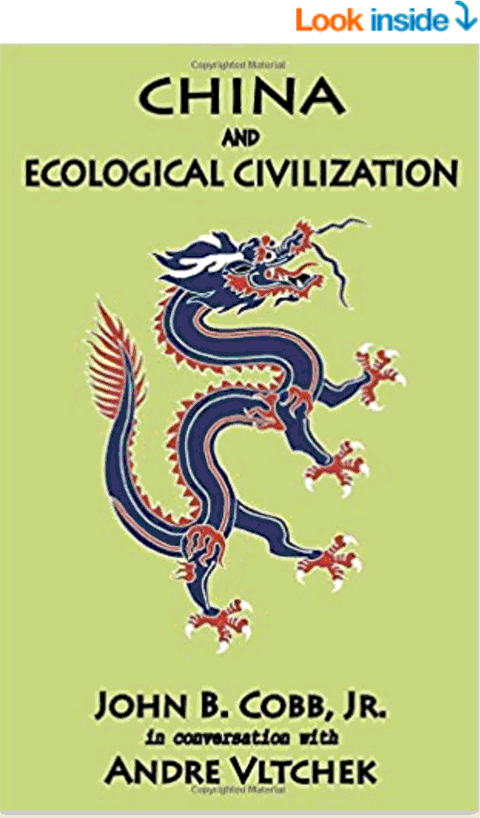 Note: I'm using 'ecological civilization' as Eileen Crist uses the term, but without hope for political solutions, and not as the EcoCiv NGO uses the meme that emerged out of the vision of John B. Cobb, Jr., which Jeremy Lent (who interviewed Eileen) is closely associated with. The short of it is I'm not a Neoplatonist apologist who sees philosophy as 'a series of footnotes to Plato', as I view Carneades, 2nd century BCE, as having progressed far beyond Plato's errors. I am not now nor have I ever been a member of the environmentalist movement nor subsequent sustainability/transition movement (as a set of proposed 'solutions'), as despite decades of political activism 'the pace of planetary destruction has not slowed'. I see as M. King Hubbert saw, that there are two foundationally incompatible worldviews, the belief-based and the evidence-based, or the 'matter-energy system' view of Hubbert and the 'monetary culture' of BAU empire-builders, past and present. The Kogi are not now nor, for at least 1100 years, have they ever been empire-builders. Laozi was an irreconcilable critic of the culture of early empire-building in China that Confucius served. Any non-delusive view of 'ecological civilization' cannot be reconciled with Empire, BAU, GND, LDS et al., or ISIS as all are part of the humancentric narrative of 'solutions' and 'salvation' no matter how many books are written to prove that Lord Man and Mother Nature can just get along and love one another. This intelligentsia storytelling is BAU, and meanwhile, the pace of planetary destruction has not slowed.... All belief-based narratives, including politicized environmentalist, sustainability, deep transitions, and climate crisis stories, are a distraction having human extinction as a possible outcome.
Note: I'm using 'ecological civilization' as Eileen Crist uses the term, but without hope for political solutions, and not as the EcoCiv NGO uses the meme that emerged out of the vision of John B. Cobb, Jr., which Jeremy Lent (who interviewed Eileen) is closely associated with. The short of it is I'm not a Neoplatonist apologist who sees philosophy as 'a series of footnotes to Plato', as I view Carneades, 2nd century BCE, as having progressed far beyond Plato's errors. I am not now nor have I ever been a member of the environmentalist movement nor subsequent sustainability/transition movement (as a set of proposed 'solutions'), as despite decades of political activism 'the pace of planetary destruction has not slowed'. I see as M. King Hubbert saw, that there are two foundationally incompatible worldviews, the belief-based and the evidence-based, or the 'matter-energy system' view of Hubbert and the 'monetary culture' of BAU empire-builders, past and present. The Kogi are not now nor, for at least 1100 years, have they ever been empire-builders. Laozi was an irreconcilable critic of the culture of early empire-building in China that Confucius served. Any non-delusive view of 'ecological civilization' cannot be reconciled with Empire, BAU, GND, LDS et al., or ISIS as all are part of the humancentric narrative of 'solutions' and 'salvation' no matter how many books are written to prove that Lord Man and Mother Nature can just get along and love one another. This intelligentsia storytelling is BAU, and meanwhile, the pace of planetary destruction has not slowed.... All belief-based narratives, including politicized environmentalist, sustainability, deep transitions, and climate crisis stories, are a distraction having human extinction as a possible outcome.
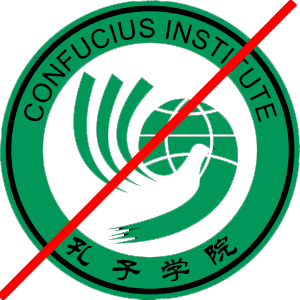

Boiling it down:
A damaged biosphere will persist.
We humans may not be part of it.
There are no political solutions.
The Human Problematique Simplified
Existential threats exist: e.g. that a very large asteroid could make a direct hit with Earth in five years is one possible threat, one that most people can understand and maybe believe is possible, unlike the threat of multiple system failures they cannot.
Real solutions may exist: politicians, policy makers, bureaucrats, CEOs, generals, educators, monarchs, entertainers, almost all experts and voters need to STAND DOWN and listen to Nature (or at least those who listen to Nature) who has all the answers, i.e. realize that they don't know enough to have an opinion as to what to do (e.g. to divert or prepare for an asteroid impact), and therefore should offer carte blanche help to those few who endeavor to listen to Nature (e.g. engineers, astrophysicists, systems ecologists), who will then tell them what to do to help save humanity and the biosphere (if a majority of people vote to do so instead of denying the asteroid exists).
If a planetismal is going to hit Earth in five years, don't expect anyone now in power to know what action to take that might work to divert it or figure out how to maybe allow a remnant human population (with some livestock, pets, and crop seeds), plus information acquired during growth, to survive on the side opposite the impact.
Those who think they may know enough to endeavor to think well about threats to humanity and the biosphere (and possible real solutions) will have to globally auto-organize per life-driven purpose, consider all viable options within time limits, and cooperatively work towards one or a few real solutions, i.e. form a functioning naturocracy obedient to Nature's laws assuming the will of WE THE PEOPLE is to persist (instead of pursue short-term self interests, including denial, as usual).
Any reliance on political or religious solutionatiques will have a predictable outcome, as will denial as usual. Failure is an option. Voting to decide if the asteroid exists, forming factions to decide which solution voters prefer if a majority decide that it does exist, will have a predictable outcome. Could Elon Musk put an ark in orbit within five years to recolonize Earth ten years after the impact? Don't count on it. Let go of any belief in belief, stand down, and see what may follow.
The Emperor has no clothes; politicians have no solutions.

- Everything we think we know is an illusion given that, apart from tautologies, we know nothing as any concept about what is is not the what-is.
- What we think we know is as believed, asserted, and our belief in belief is error times ignorance to illusion squared.
- We know nothing with certainty, yet belief-based certitudes abound (as asserted).
- We can not know the truth, merely iterate towards telling better stories about the nature of things, yet most fail to endeavor to do even that.
- Normal humans in modern techno-industrial society are lacking in sanity, in having a grasp of reality, yet being insane is not normal with respect to the nature of things and selects for failure (to be sapient and persist).
- To be normal with respect to the nature of things is to listen to Nature who has all the answers, and not to tribal prattle, social constructs, one's own or that of others.
- Better when the barking mad stand down before they fall down when their image of the world they call real collapses.
Existential Concerns:
Epilogue
In room 101 a panel of 13 academics sits before me. One holds up her hand with two fingers extended.
 'How many fingers am I holding up?'
'How many fingers am I holding up?'
'Two', I say.
'I am holding up three. Does everyone agree?' The others solemnly nod in agreement.
'Again, how many fingers am I holding up?'
'Two.'
My head is in a cage with a divider behind which perhaps two dozen scruffy brown, ravenous rats press eagerly against the wire door. I am told, 'If you cannot see that I am holding up three fingers, then you cannot be rehabilitated to serve the economy and must be terminated with extreme prejudice, so look carefully and tell me how many fingers I hold up?'
Without hesitation I say 'two', as there is no margin for choice. Maybe she holds up three fingers, maybe she is among the few having six digit hands and the sixth is behind one of the five I can account for, but I fail to actually see but two, and so my fate is determined as denial and pretense are unbecoming.
Whether the rats strip the flesh from my head or not, and, if the door opens, how long it takes me to die doesn't matter.
The situation imagined is analogous to the one I am not imagining. I say (and type about) what I see in front of my face (e.g. that we moderns are dysfunctional animals, not different in kind from other animals, whose 2+2=5 narratives select for our dissolution) and I wonder about 'real' solutions.
Humanity doesn't like what I see. No one (friends, family, acquaintances, scientists, scholars, normal humans) can abide my vision. I provoke without intent; I discomfort; I distract. I must be silent or 'assent' to be 'sane'. Perhaps there are political solutions. I merely fail to see them, and so....
 So I will avoid others until I learn to be silent and to give no token of the lie my soul hath spoken. I can type quietly as no one will read much. But perhaps in 15 to 50 years someone will wonder about the two fingers they see.
So I will avoid others until I learn to be silent and to give no token of the lie my soul hath spoken. I can type quietly as no one will read much. But perhaps in 15 to 50 years someone will wonder about the two fingers they see.
I have, it seems, discovered my totem spirit. I am now ensouled by a thing of evil—ghastly and grim. The what-is (and those who would rather know than believe) is humanity's mortal enemy. I am Poe's raven to Poe's storytelling humanity. Be that our sign of parting, O ye of true belief.
Remains the shadow floating on the floor from which my words, words, words
Shall be lifted—nevermore!
'To be a scientist is to be naïve. We are so focused on our search for truth, we fail to consider how few actually want us to find it. But it is always there, whether we see it or not, whether we choose to or not. The truth doesn’t care about our needs or wants. It doesn’t care about our governments, our ideologies, our religions. It will lie in wait for all time.... Where I once would fear the cost of truth, now I only ask: What is the cost of lies?' —Valery Legasov
'The question of the century [21st] is: How best can we shift to a culture of permanence, both for ourselves and for the biosphere that sustains us? —E.O. Wilson, The Future of Life, 2003, i.e. how can we transition to a viable civilization able to persist as the millennia pass?
'Ecological economics acknowledges that real economies are completely dependent on energy. However, orthodox economic theory remains blind to this reality. As a result, so do our institutions and our citizenry [we are energy, time, posterity blind perhaps because our teachers are]. The disconnect has massive implications for our future.... Energy is and always will be the currency of life.,,, the energy in one barrel of oil substitutes approximately 4.5 years of physical human labor.' —Nate Hagens, Economics for the future – Beyond the superorganism 2020
1 Human milker doing maybe 50 watts of work, or 0.05 kW x 120 hr per year per cow = 6 kWh per year-cow.
1 Semi-automated milker = 1100 kWh (41 kW x 27 hr per year-cow) = 183x human power
1 Fully-automated milker = 3000 kWh (250 kW x 12 hr per year-cow) = 500x human powerTwo humans could milk 21 cows twice a day. But fully-automated milking machines are so much 'better' (more profitable) and 10x faster (using 500x more energy made possible, for a time, by turning mostly fossil fuel energy into fully-automated energy slaves). The average human has about 125 human-energy-slave equivalents working for them (meaning the average American has many more energy-slaves providing services such as dairy products). Without fossil fuel energy inputs, some humans may be lucky enough to have a cow to milk. And self-driving cars and trucks will be so much better at turning fossil fuel into speed (maybe 10x faster than a bicycle using 500x more energy) for a time, and then what?
About 90 percent of all food humans now consume (to avoid starvation or become obese) exists only because fossil fuels are being turned into food directly or indirectly (from proximal to distal). So to transition to the low energy future that will come anyway, think rapid depopulation and less per capita consumption on our spaceship Earth. Think needs, not wants, shared more or less equitably because that's what works regardless of your religious or political beliefs (or the complete lack thereof which avoids pathological side effects and needs to become the outcome of the educational system at the PhD level—the abelieving mind).
Only those who would rather know than believe may be able to understand what William Rees is endeavoring to point out:
'Many people are startled to learn that most of what they believe to be true, most of what they think they know, is literally made up... products of the human mind, massaged or polished by social discourse and elevated to the status of received wisdom by custom or formal agreement. All cultural narratives, worldviews, religious doctrines, political ideologies, and academic paradigms are actually “social constructs” [domains of discourse].... One passively acquires the convictions, values, assumptions, and behavioral norms of his/her tribe or society simply by growing up in that particular milieu.... Some well-known constructs are entirely made up – “capitalism”, “communism”, “civil rights”, and “democracy” [aka human exceptionalism] for example, have no true analogues in the non-human world. These and similar concepts were birthed in words and given legs entirely through socio-political discourse [as honed into fine words by products of a broken educational system].... Science is unique among formal ways-of knowing in that scientists explicitly test the validity of tentative constructs (hypotheses) about the real world through observation and experiment [i.e. they listen to Nature] and adjust their understanding accordingly....'
'Things can get complicated – any economic paradigm is an elaborate socially-constructed model that may contain (or omit) other models that are themselves socially constructed. By now it should be clear that much of what humans take to be “real” may or may not bear any relationship to anything “out there”. More remarkably still, most people generally remain unconscious that their collective beliefs may be shared illusions – a cognitive enigma that may well determine the fate of humankind. No matter how well- or ill-founded, entrenched social constructs are perceptual filters through which people interpret new data and information; and, because our constructs constitute perceived reality, they determine how we “act out” in the real world. Millions [or billions] of lives may be jeopardized if those in positions of authority [fail to listen to Nature,] cherry-pick data guided by some dangerously faulty but comfortable social construct.... Let’s acknowledge that all economic theories/paradigms are elaborate conjectures and that none can contain more than a partial representation of biophysical, or even social, reality. If this is an important general limitation, we should be particularly concerned about today’s dominant neoliberal economic paradigm (the economics of capitalism)... enamoured with the idea of a self-regulating (free) market, would have the real economy adapt to fit their models.' —William Rees, End game: The economy as eco-catastrophe and what needs to change 2019
'Many people are startled...' [or if they could question everything they would be startled] 'to learn that most of what they believe to be true, most of what they think they know, is literally made up... products of the human mind, massaged or polished by social discourse and elevated to the status of received wisdom... it should be clear that much of what humans take to be “real” may or may not bear any relationship to anything “out there”. More remarkably still, most people generally remain unconscious that their collective beliefs may be shared illusions – a cognitive enigma that may well determine the fate of humankind. No matter how well- or ill-founded,' [all beliefs as] 'entrenched social constructs are perceptual filters through which people interpret new data and information...' [to believe the misinformation and disinformation (along with bits of information that typically fails to compete with the misinformation/disinformation) that forms their worldview].
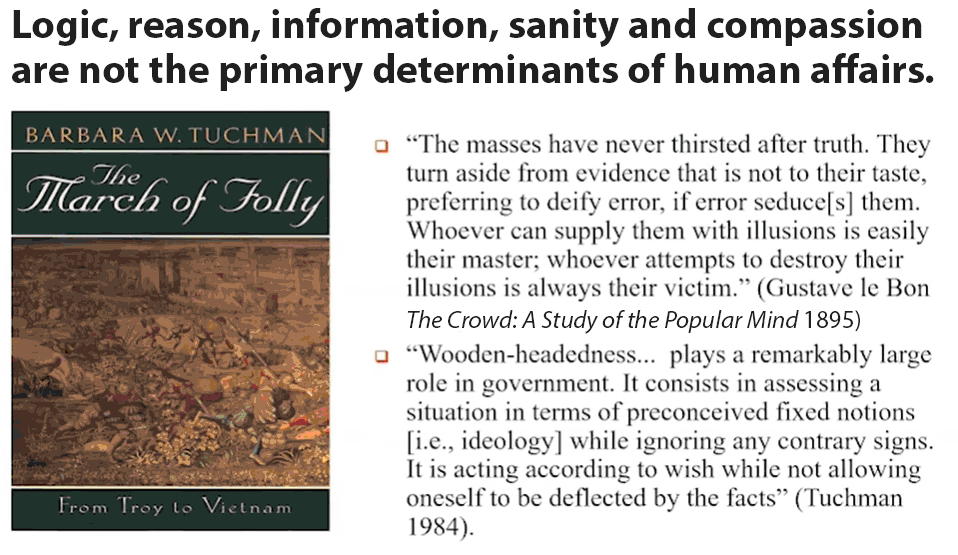
'Creating a shared vision of a sustainable and desirable future is the most critical task facing humanity today [yes, or perhaps rapid degrowth would suffice]. This vision must be of a world that we all want [no, as in facepalmingly not], a world that provides permanent prosperity within the Earth’s biophysical constraints in a fair and equitable way to all of humanity, to other species, and to future generations [yes].' —Robert Costanza and Ida Kubiszewski, Creating a Sustainable and Desirable Future: Insights from 45 global thought leaders, 2014
Sadly, Nature doesn't care what we humans want, but does determine what works long-term which defines what we need to 'want' if we are to persist as a species. Those who want what doesn't work pass away. So, adjust your vision to what works, bitches, and embrace the limits of sustainable environmental productivity that no one gets to vote on to determine (naturocracy 101). Hubris Man needs to stand down and adapt like brother cabbage, and otherwise 'seek out the condition now that will come anyway'.
'Only a crisis - actual or perceived - produces real change. When that crisis occurs, the actions that are taken depend on the ideas that are lying around. That, I believe, is our basic function: to develop alternatives to existing policies, to keep them alive and available until the politically impossible becomes the politically inevitable.' —Milton Friedman
As a BPE (BioPhysical Economics) fanboy I never thought I'd have occasion to quote Milton Friedman, but I do, so wrong again. I'm creating ideas/designs to be lying around should the impossible, the unthinkable, become our only hope.
'... the system in which we live is a highly deterministic and predictive system [on macro level]. We are integral parts of this system, that produces war dynamics through our collective/shared efforts to survive in an anarchistic [international] system that is organized into sovereign states. This study shows that humankind’s urge to survive in anarchistic systems and increasing connectivity (population growth) result in ‘free energy’ –tensions– that in fact drives the war dynamics and develops the system.... As a consequence of the increasing connectivity of the system, systemic [world] wars will become increasingly severe, and as a consequence potentially cause irreparable damage not only to humankind and its social structures but also to [the planetary life-support system].''The regularities that are presented,,, can only be identified from a long-term perspective and furthermore require the use of recent insight into the workings of complex systems and networks.... The experience of war and its effects, and the first-hand observation of humankind’s ability to inflict massive destruction and suffering, made me even more aware that we must not and cannot accept such destructive dynamics and behavior from the human and ethical points of view. Moreover, these dynamics cannot be accepted from a very practical perspective; because of (systemic) war’s increasing severity and the unavoidable use of nuclear weapons, war will eventually destroy us.'
'I refuse to accept living in and being part of a system that dictates and ultimately destroys our future because it forces increasingly destructive wars upon us. I do not want my own children... –or other children in our world– to be confronted with war. We are obligated to stop these dynamics and to work cooperatively on a shared future.'
'...diversity is essential for our collective survival, simply because it provides us with new insight and solutions to problems that seem unsolvable or that are new to us. Diversity, including cultural and religious diversity, is a prerequisite to our collective survival and the ability to find solutions to the challenges that we encounter. Humankind is just beginning.' —Piepers, Ingo (2016) 2020: WARning. Social integration and expansion in anarchistic systems: How connectivity and our urge to survive determine and shape the war dynamics and development of the System. PDF.
War as existential threat to humans is more obvious than the threat of the war dynamic we are all captured by and are part of to life on Earth. Another global war could result in the Anthropocene exceeding the Permian as a mass extinction event. We can understand the dynamic we are of and serve (to be thereby delivered from it), or die. ['Understand or die.' —Ludwig Wittgenstein]
'In most of the world's nations, fewer than 1 per cent of the politicians and administrators are scientifically literate. And if this were not enough to hamper understanding, most of the languages of science is fragmented into at least 100 different dialects. Scientists, even good ones, only rarely understand their colleagues of a different department. How can they possibly convey their wisdom to a politician? Far worse than this difficulty in understanding, humans inevitably, as part of their evolutionary destiny, spontaneously act collectively as gangs, lobbies, learned societies, political parties and cronies. These all have a consensus view that, even with respected groups such as the IPCC, can be far from accurate.... My hope is that we survive and evolve further to the point where we are as much a part of our living planet as our brains are of us.' —James Lovelock, A Rough Ride to the Future 2014
To 'evolve further' will require a rxevolution. Hu-mans cannot evolve further without first recovering from their civilized state of population overdensity by reversing the devolution (behavioral sink) induced by overcomplex societies that fail to persist (but succeed, for a time, in producing hu-mans of NIMH).
To become human, to reclaim our humanity—our functional behaviors that evolved with our ancestors over the eons, we must stand down and step back to a better place (not time, but condition) of having a life-driven purpose. We can then, if we preserve some ability to think in systems, guess then test, always prepared to step back to what works before endeavoring to evolve again.
We must dissipate and evolve which involves selection. We don't get to determine (decide) what works. What works is the Holy Grail. To learn, to think, is to listen. We have largely lost our ability to wonder, to listen to Nature who has all the answers.
Let's deconstruct the Lovelock quote above using more words: (15x more)
- Maybe 1% of leaders, from tavern/Twitter/Facebook/pulpit pundits to world potentates, are demonstrably literate in one or more silo sciences.
- Specialists, valued for the 'milk and cheese and profit they bring' the more moneyed, serve our growth hegemon and hence are monetarily rewarded, with some social approbation added.
- Science is fragmented into over 100 dialects of what would be one domain of discourse if unified by a matter-energy-li-information systems worldview.
- Academia is fragmented into multiple domains of discourse serving the monetary culture that may reference science as an externality they are for, against, or may find a use for at times.
- Nature (matter-energy-li-information systems worldview)
- Natural science
- Formal science
- Humanity (monetary culture worldview)
- Humanities
- Pre-modernisms (e.g. theology, monarchy/aristocracy apologists, classical economics)
- Social science narratives (e.g. neoclassical economics, democracy, gender studies, autoethnography)
- Modernism
- Postmodernism
- Metamodernism
- Transmodernism
- Ecomodernism
- Professions/disciplines, serving the humancentric monetary culture, school young humans so they can become productive commoners or elites serving the growth hegemon.
- A mind map.
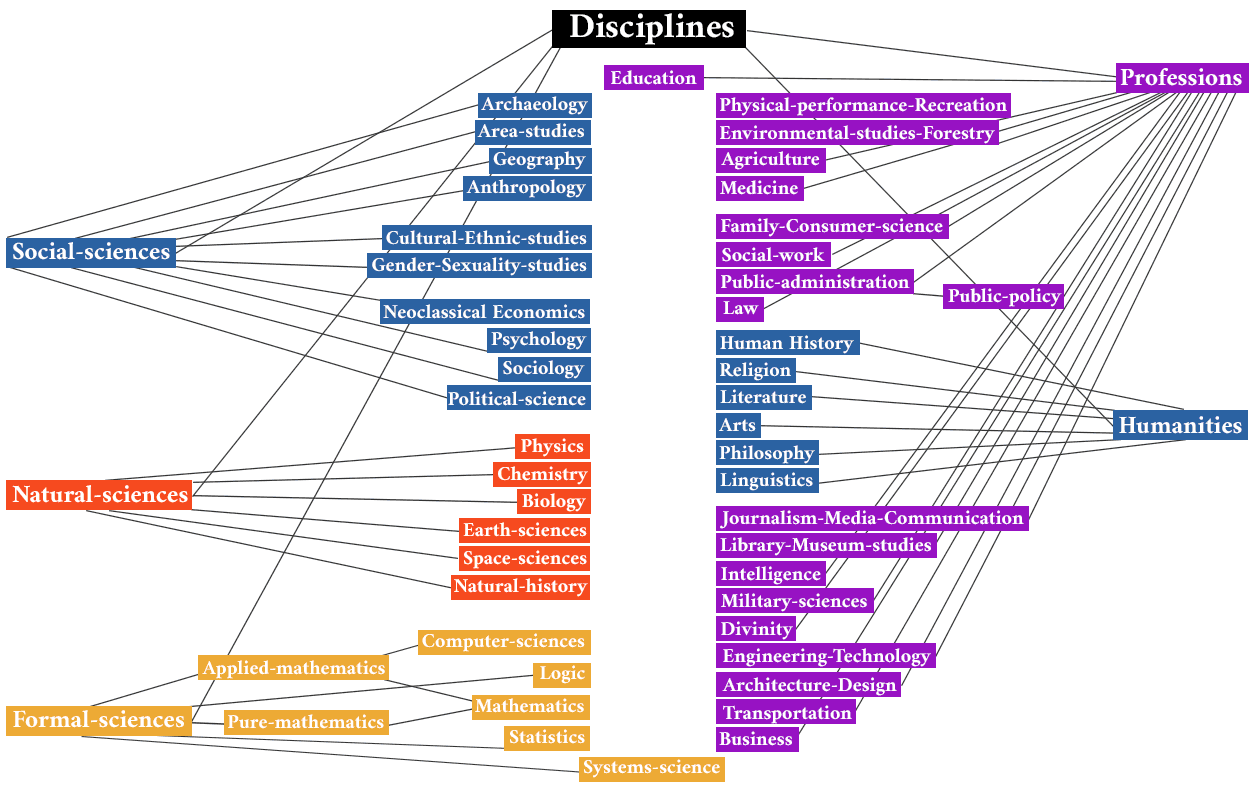
- Alternative mind map.
- As is your sort of mind map, so is your sort of narrative about life, the universe and everything, e.g. humancentric (see above) vs naturcentric (see below) selects for different outcomes.
- Our collective mind map, that of the empire-building modern techno-industrial monetary BAU civilization/worldview, may select for our failure to survive, i.e. be a viable species.
- The OS (operating system) we are living by is about to destroy the now global complex society/empire (aka civilization) we depend on and much of the biosphere, a dynamic that has been well under way since the beginnings of the Great Acceleration (1712-1950).
- Uploading a new mind map is maybe preferable to 'zombie apocalypse' collapse as usual.
- Consider spending three months endeavoring to understand what a Civilization 4.0 might look like and how it foundationally must differ from Civilization 3.x.
- Any design for a Civ 4.0 likely cannot be assessed without at least temporarily uploading the mind map it is based on.
- Consider that neither you nor anyone else can tweak Civ 3.x into a Civ 4.0 as there must be foundational differences to effect a different outcome, e.g. to transition from a humancentric growther mind map to a naturcentric one to maybe 'save the world'. Or not, as Nature doesn't care.
- We need to transition (paradigm shift) from Civilization 3.x to Civilization 4.0 and then iterate towards (evolve) a viable ecolate civilization (maybe).
- Any viable design will have to be based on human best guess thinking and academy vetted information starting with one's mind map of the what-is or may be.
- Upload a non-BAU mind map and you may be able to design a viable civilization or to choicelessly decide to live in one.
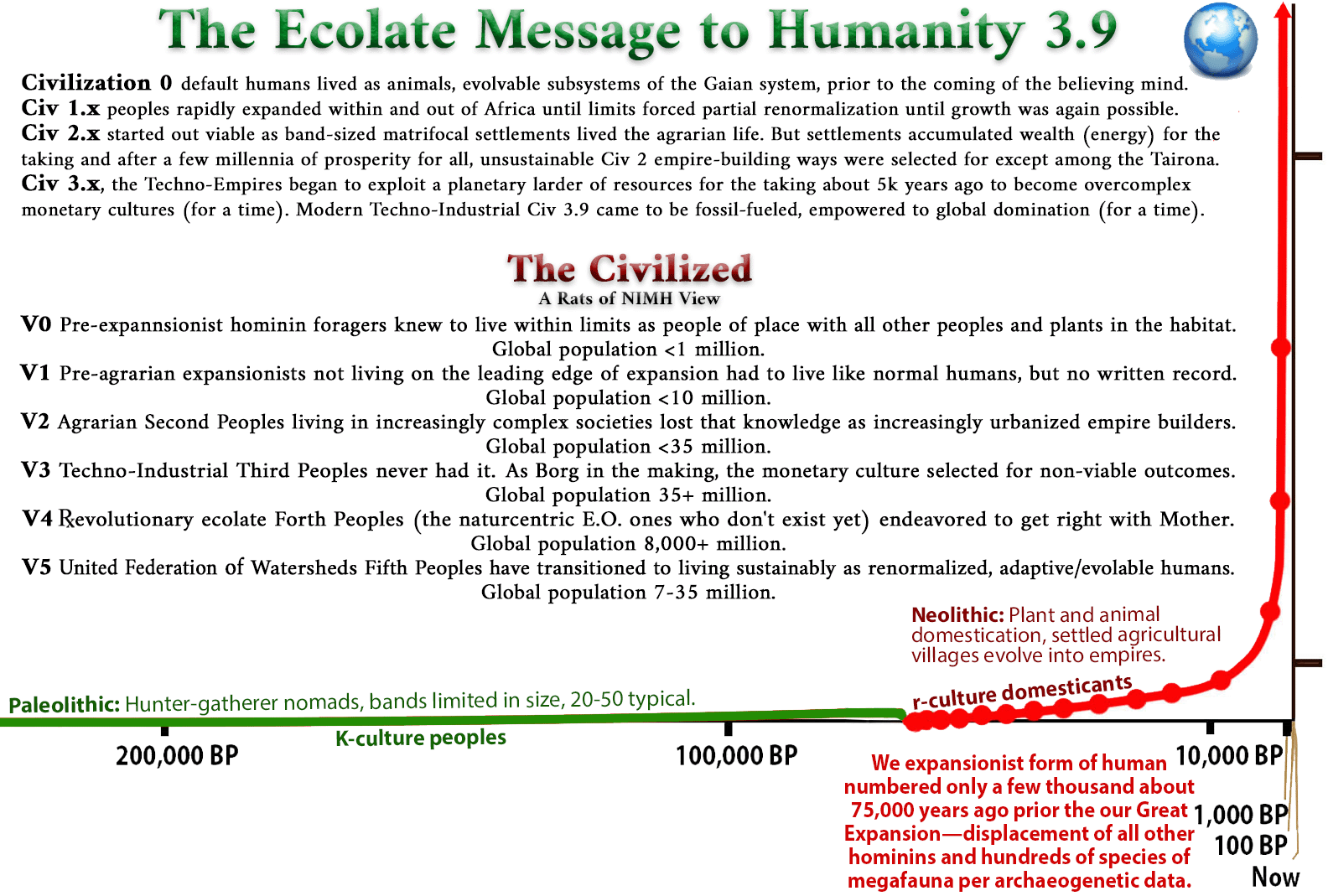
[The early ecolate came to be called the 'E.O. ones', mindless followers of the eco-fascist anti-human E.O. Wilson who avocated for merely a Half Earth for humanity. The EOs came to accept the term but translated it as 'ecolate ones'.
Civ 4.x would be transitional, likely taking 8-12 generations be become Civ 5.0
It's been a long way up as it will be down, see full graph.]
Science can alter, limit, vet our mind map stories of Nature, the nature of things. "Science is a way to teach how something gets to be known, what is not known, to what extent things are known (for nothing is known absolutely), how to handle doubt and uncertainty, what the rules of evidence are, how to think about things so that judgments can be made, how to distinguish truth from fraud, and form show." —Richard Feynman
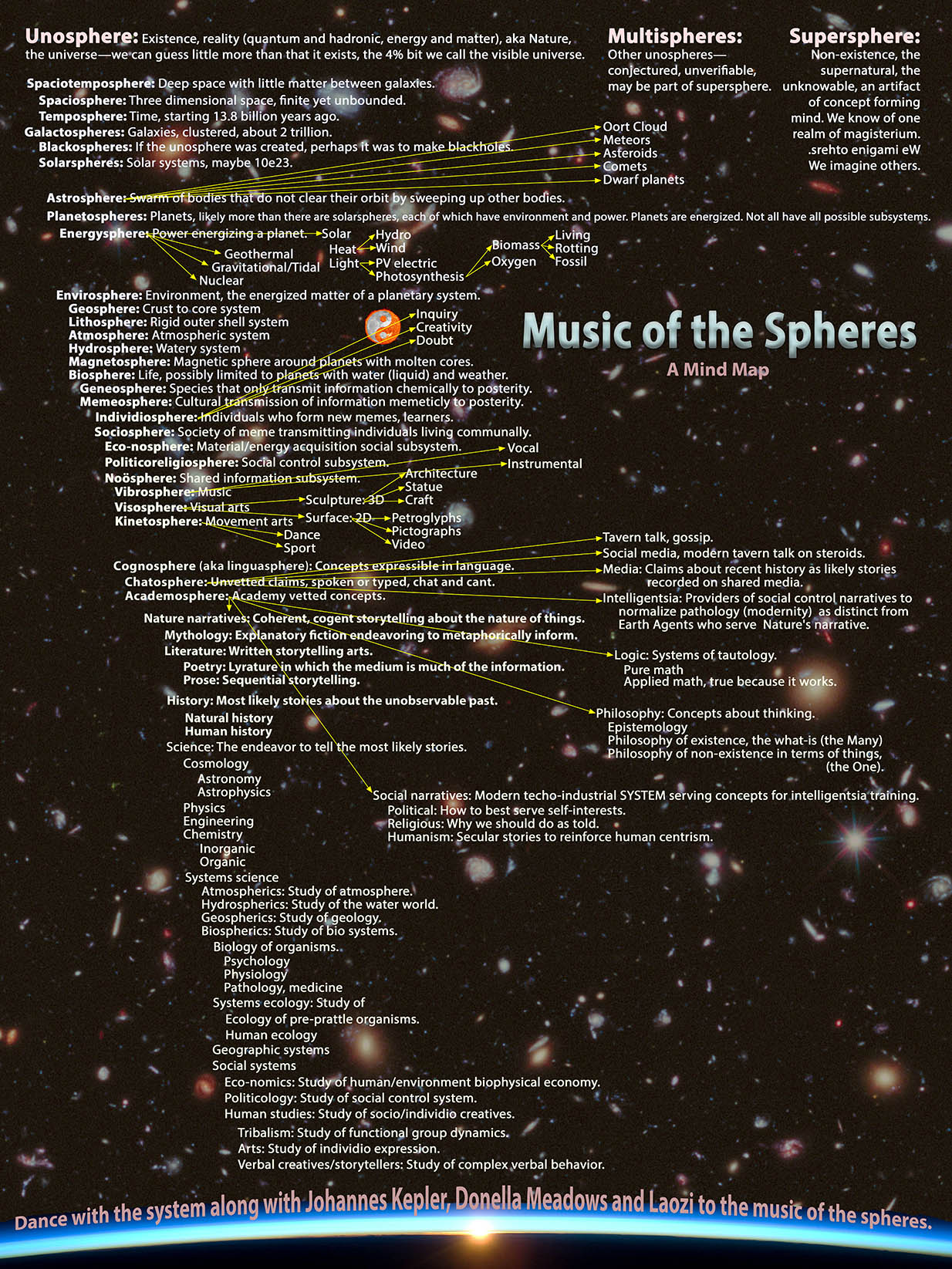
The above is based on an outline version, The Music of the Spheres, with notes.
There is a poster size image to print.
At bottom, actual photo of sunset through Earth's atmosphere as seen from orbit and above is a Hubble Ultra Deep Field view.
The memeosphere map is humancentric, of, by, and for humans, but humans are part of the cosmos as a subsystem of the biosphere that will select for what works and against what doesn't (e.g. modern techno-industrial culture). Viewing the planet as a resource for the taking selects for short-term prosperity only.
Posterity will be consequenced for our taking of a planet, possibly unto extinction. 'Magical leverage points are not easily accessible, even if we know where they are and which direction to push on them. There are no cheap tickets to mastery. You have to work hard at it, whether that means rigorously analyzing a system or rigorously casting off your own paradigms and throwing yourself into the humility of Not Knowing. In the end, it seems that mastery has less to do with pushing leverage points than it does with strategically, profoundly, madly, letting go and dancing with the system.' [Donella Meadows, Thinking in Systems: A Primer]
- 'I do not know of any poetry to quote which adequately expresses this yearning for the Wild. Approached from this side, the best poetry is tame. I do not know where to find in any literature, ancient or modern, any account which contents me of that Nature with which even I am acquainted.' —Henry David Thoreau, ‘Walking’ 1862
- For ten years I attended a weekly meeting of the Literati Club where, after typically watching one installment of a Teaching Company lecture series on the work of interest, we discussed issues for an hour and a half, so I'm not an average troglodyte as I would rather read good stories than tell them.
- Still, the humanities are relentlessly humancentric and any artist who could succeed in offering a fully naturcentric story, in whatever medium, would not inspire humanity professors to wax eloquent by the hour nor even find a publisher/venue, hence none will be found that is considered true 'art' or 'literature'.
- A 'sense of wonder', a fundamental connection to something larger than ourselves (enabling us to become naturcentric), is needed to humble us, to occasion a sense of immanence our words, words, words can say nothing of, as beyond belief there is the unknown country that lays 'all undiscovered before' us.
- We cannot know the truth, but we can iterate towards it.
- If monetary culture leads its citizens towards extinction (secondary to its destruction of a planet's life-support system and behavioral sink), it cannot have found answers to any questions worth asking nor be considered sane, i.e. non-pathological.
- If a malignant carcinoma had an ideology, it would center on a belief in growth and that it is different in kind from all other cells, as would be evident (for a time).
- Real solutions exist (sanity), but denial, distraction, pretense, obfuscation, and anesthesia are so much more agreeable than taking up 'arms against a sea of troubles'.
- If we believe humans are exceptional, that the Universe loves us (and things will just keep on keeping on while getting better), then denial... works (for a time).
- Expect the din of denial to be deafening until it isn't.
- We cannot proudly humble ourselves; you cannot achieve humility.
 We will be humble, or we will be humbled.
We will be humble, or we will be humbled.- 'Nature is unkind.'
- Nature humbles.
- Persistence favors the prepared mind.
- We cannot act to save ourselves nor be saved by great leaders, real or imagined.
- Rather than act, we have to stop doing what we are doing and let go.
- Hubris Man must stand down.
- Complex systems are not only more complex than we know, they are more complex than we can know.
- We cannot aspire to a sense of wonder (or take heaven by storm).
- We are all the issue of Nature and we need to know this, not just intellectually, but with insight that allows us to know and experience the mysterious.
- Grace may or may not cometh.
- We can but let go into not-knowing.
- We cannot build eutopias in an imagined future, but we can bring down empires of belief now one mind at a time starting with our own.
- Throw yourself 'into the humility of Not Knowing... strategically, profoundly, madly, letting go and dancing with the system'. [Donella Meadows, Thinking in Systems: A Primer]
- Then there may be wonder enough, but it cannot be of our doing.
- Listen to Nature who has all the answers.
- Then iterate towards getting right with Mother before whom all hubris falters.
- As hubris Man, we need to stand down.
- Don't worry about saving the world.
- 'Gaia is a tough bitch' and will keep on keeping on in a damaged form.
- We humans may not, so SOS.
- Stand down and we may Save Our Species from ourselves.
- Concepts that reference only other concepts create a house of mirrors (and horrors).
- Within Babel we see darkly or not at all.
- Conceptual systems of tautologies tell us nothing of the what-is apart from which not a thing is.
- Language alone bewitches our intelligence.
- Certainty comes only by definition.
- Certitudes are as imagined.
- Get thee hence, wordsmiths.
- The what-is beyond our concept forming minds being ineffable, there is nothing for hubris Man to say, to speak of other than to model.
- All models are other than the what-is, the thing/subsystem modeled.
- Most concepts are merely of things imagined, e.g. self and other, freedom and dignity, goddess and country.
- 'The map is not the territory.'
- There are many stories and all stories are untrue, but some are likely truer than others.
- 'The most beautiful thing we can experience is the mysterious. It is the source of all true art and science. He to whom this emotion is a stranger, who can no longer pause to wonder and stand rapt in awe, is as good as dead: his eyes are closed. This insight into the mystery of life, coupled though it be with fear, has also given rise to religion. To know that what is impenetrable to us really exists, manifesting itself as the highest wisdom and the most radiant beauty which our dull faculties can comprehend only in their most primitive forms— this knowledge, this feeling, is at the center of true religiousness. In this sense, and in this sense only, I belong in the ranks of devoutly religious men.'
- When the prattle of concept mongering we misjudge consciousness pauses, there can be a still small voice of silence.
- To paraphrase Meister Eckhart, 'Why doth thou prate of Wonder? Anything thou sayest of her is untrue.'
- Conjecture: Calhoun's rats of NIMH had no sense of wonder.
- No one living in complex empire-building societies eats Nature's bread (we of the 21st century eat fossil fuel dependent industrial food products, for a time), so none sing Nature's song.
- Priests...gurus used to be paid well for serving Empire and retain many followers who pay to believe, to be enthralled.
- Political factions, with devoted help, now compete to serve the Growth Hegemon, delivering up a planet for the taking and the Anthropocene enthusiasts to take it, and so are paid well, for a time.
- Systems science, thinking in systems, is tolerated when the implications need not be ignored or marginalized, obfuscated or denied.
- Maybe 1% of the silo science literate, being autodidacts, are also systems science literate (ecolate).
- Like mathematics whose applied form is needed by most natural sciences, systems science has both an abstract 'view through the macroscope' form that focuses on the idea of a system, and applied forms, e.g. systems ecology.
- The educational system, apart from a few professors who work it in, does not include thinking in systems (ecolacy) as part of a modern education, such as literacy (including applied sciences as the endeavor to tell likely stories) and numeracy are at least in part.
- If 'thinking on't constantly' as Newton did, maybe in three months to three years of reading Forrester, Hardin, Odum, Meadows, Lovelock, Laozi..., some sense of 'thinking in systems' may develop.
- Applied systems science is about connecting all the dots illuminated by the silo sciences and so is dependent on but differs from them as applied science.
- Systems science is not another science and by the end of the 21st century the word 'science' alone could become short for 'system science' instead of, as now, being short for the set of specialty sciences focusing on some part of the cosmos.
- Modern techno-industrialized culture emphasizes 'either-or' thinking, while a viable new world order's educational system, formal and informal, would include, perhaps emphasize, 'and-both' thinking such as thinking in systems requires.
- Currently the humanities provide the overarching humancentric narrative of 'life, the universe, and everything' where 'life' is understood to mean human life, specifically of humans living today in industrial society unless they are racists, i.e. not woke.
- Social sciences need not reference the concerns of the humanities anymore than include the concerns of theologians.
- The social sciences are (should be understood to be) a branch of biology that studies the behavior of social species, including eusocial species, and some may specialize in studying human social behaviors, because sociology is a branch of psychology, the study of the behavior of organisms.
- A matter-energy-li-information systems worldview/narrative is alternative to humancentric narratives and, not being humancentric, is incompatible, an irreconcilable alternative.
- Changing industrial society's worldview from anthropocentric to ecocentric (from humancentric to naturcentric) involves foundational change, a paradigm shift that may be viewed by Anthropocene enthusiasts (the 99+%) as an existential threat.
- Simple storytellers (e.g. BAU thinking which may include conservative 'Right' leaning narratives) will resist with extreme prejudice (unto death, their own or preferably the death of others, e.g. 'ecofascists') those who want the currently self-accredited normals to change.
- Adroit storytellers (e.g. GND thinking, which may include liberal/progressive 'Left' leaning narratives) are able to entertain all concepts, but their thinking is also conclusion based as they too believe their stories.
- Some lean towards believing in 'clean' coal; some in 'clean' solar/wind to power industrial society (none are committed to the destruction of techno-industrial society—the wolf).
- Some can verbalize thoughts that are antithetical to their own and thereby appear to consider them.
- They may well appear to like and agree with concepts that are antithetical to life as they know and live it until the implications become impossible to deny.
- They may speak with enthusiasm of 'degrowth', 'sustainability', 'resilience', 'transition', 'steady-state economy', 'loving nature', 'clean energy', or the importance of a 'sense of wonder'.
- They will still drive their Tesla wherever and some may fly to Bhutan for an eco-vacation while praising Greta Thunberg and viewing their version of the Green New Deal as a real solution (all others being false 'solutions' as distinct from their one true one).
- If BAU is the wolf, GND is the wolf in sheep's clothing.
- If the Koch Brothers are Tweedledums in unpretentious BAU clothing, are they actually different in kind from the Tweedledees (e.g. McKibben and Tercek)?
- They tell different stories, represent different tribal factions, have agreed to have a battle (of the names), but all serve as Anthropocene enthusiasts, as true believers, are benefactors of humankind (ask them: 'The object of industry is the exploitation of the globe, that is to say, the appropriation of its products for the needs of man; and by accomplishing this task, it modifies the globe and transforms it, gradually changing the conditions of its existence. Man hence participates, unwittingly as it were, in the successive manifestations of the divinity, and thus continues the work of creation. From this point of view, Industry becomes religion.' —Henri de Saint-Simon 1820-1825).
- 'Along with the world there began a war that will end together with the world and not before: that of man against nature, of spirit against matter, liberty against fatality. History is nothing else than the account of this interminable struggle … the gradual triumph of freedom … What is bound to encourage us in this endless struggle is that, by and large, the one side does not change, while the other changes and becomes stronger. Nature remains the same, whereas every day man gains some advantage over her.' —Jules Michelet 1831
- Anthropocentric thinking (monetary culture) is belief-based, while ecocentric thinking (matter-energy-li-information systems worldview) is inquiry-based, and inquiry, questioning everything, looks like doubt/disbelief to the believing mind, and viewed by their amygdalas as an existential threat.
- (The Shock of the Anthropocene, 2013-2016
- 'In one or two hundred years [1957-2057], criss-crossed by railways and steamships, covered with factories and workshops, the world will emit billions of cubic metres of carbonic acid and carbon oxide, and, since the forests will have been destroyed, these hundreds of billions of carbonic acid and carbon oxide may indeed disturb the harmony of the world.' —Eugène Huzar 1857).
- Current fable: 'In the late twentieth century, a handful of Earth system scientists finally opened our eyes. So now we know; now we are aware of the global consequences of human action.'
- How many 'we', as in what small fraction of one percent of humanity, are actually concerned about what the global consequences of human action might be such that 'we' can consider 'real solutions'?
- A few (<0.001%?) know enough to have an opinion as why we should have existential concerns for the persistance of humanity and the biosphere.
- Others hear of the concerns and react as political animals to form factions and make demands with some forming NGOs.
- Meanwhile the pace of planetary destruction continues as it has since the 1970s when 'we' became aware of the global consequences of the Great Acceleration and of our Anthropocene enthusiasm.
- 'Since 1970: Human population had doubled, and human consumption has quadrupled! Fifty years on environmentalism, environment conferences, environment ministers, activists, organizations, promises, hopeful appeals, and legislation. Not a single significant metric for measuring the health of Earth’s ecosystems has improved during those fifty years.' —Rex Weyler, ecologist, cofounder of Greenpeace
- Humans need to transition from a presumption of sufficient knowledge to the recognition of our vast ignorance.
- The only 'shock' of the Anthropocene is to the stories told by academics whose view of the natural/systems sciences is from the outside, e.g. from the view afforded by psycho-social-economic-political-historical storytelling.
- They tell stories of 'reintegrating nature into history.'
- Concept mongers can and must consider all concepts and some have incorporated natural/systems science concepts into their narratives of democracy, freedom, human affairs, rights, liberty, security, citizenship, sovereignty, justice, de-carbonification, degrowth, post-growth activism, energy sobriety, and of wordsmiths 'speaking of and for the planet, and of the possibilities of influencing technological and economic choices', of our need to '‘ecologize', i.e. of exercising our putative free will if we listen to them.
- The story our most exalted public intellectuals (and lesser) cannot tell is that they are part of the problem, and have no 'real' solutions to offer despite believing they do.
- 'To understand what is happening to us with the Anthropocene requires the mobilization of all forms of knowledge.' Oh, wait, maybe it requires listening to Nature who has all the answers.
- Understanding that the current SYSTEM we all serve is not remotely sustainable diminishes enthusiasm, eventually to a point that service is involuntarily withdrawn, an existential threat to one's career, livelihood and family, hence avoided by first ignoring, then marginalizing, obfuscating, denying on up to 'killing the messenger' in various ways if need be.
- If a system's view is to be dismissed, avoid correcting or criticizing it.
- If unable to coherently criticize, then ignore, ignore, ignore.
- If unable to ignore, misrepresent claims such that all will agree they are wrong (e.g. the Limits to Growth study is now believed to have made predictions that failed to come true, and so the concerns raised, the claims made, can be discounted or gleefully dismissed).
- Humans, when in groups too large (80 to 150 and larger), form hierarchies and become political animals telling consensus narratives typically ignoring or denying biophysical reality while selecting for short-term self interests.
- Complex societies spontaneously auto-organize into extractive empire-building, dissipative structures operating far from thermodynamic equilibrium responding to the contingencies of short-term self interest at all levels (for a time).
- Viable 'rules of the game', or social control system designs, have yet to evolve to impose limits, leading to overshoot (of viable social complexity and/or biophysical/environmental limits), forcing chaotic descent (i.e. failure of all prior empire-building complex societies).
- Tribal decision making:
- Currently serves the short-term self interests of leaders and supporters (of us vs them) within dysfunctional, unsustainable complex societies.
- Alternative is to replace 'humanity' with Nature (planetary life-support system) as system to be served.
- Listen to Nature who has all the answers.
- Nature determines what works, humans do not, so guess then test.
- Freedom is the recognition of necessity.
- To persist, love and understand the world system as evidenced by choiceless obedience to the nature of things.
- 'To think is to listen.'
- Listen.
- Stand down.
A Bedtime Story
We are the storytelling animal. Once upon a time we did not believe our stories, the ones we told or the ones other members of our band told around the campfire. Uncle Ug had many stories to tell, some of them were even true. He once said he found a honey tree and next day lead the way to it.
We lived in a world of weather, of day and night, of a web of life which, in wonder, we closely followed. We listened to Nature far more than to our own prattle however well crafted.
Then we came to know a prosperity of plenty. We could labor in the fields or on the range and store up stockpiles of grain or herds. We could live in fixed settlements numbering in the hundreds, then thousands, then....
There came to be chiefs and priests who lived apart in temples and palaces, who lived apart from Nature and humanity, who were little known apart from their magnificence.
They and their wordsmith servants spoke to enthrall. The more ostentatious their abode and elaborate their garb (and words), the more credible seemed their merely eloquent claims that were best left unquestioned so as to not diminish one's enthusiastic support from which great rewards flowed.
All modernists would be kings and priests of their own manor and shrine, Lords all as empowered by Car.
Whose bread we ate, his song we sang. We who served became believers and the most inspiring and successful storytellers were they who truly believed their own stories.
Thus did all the hubris ones loose their way and go astray to normalize pathology, aka empire-building civilization, its Self over system, and its stories of auto superiority and centrality.
We decoupled from Nature.
For a time.
“Nature is unkind.” — Laozi
8/11/2020 Subnote to file: The footprint of humans is still growing, increasing, so by that measure and by economic GDP (China 6.1% last year) we have not climaxed yet.
We are nearing climax and zero growth seems unthinkable. Descent, negative growth, will be denied and resisted. The hope of future growth, of making growth great again, will die hard, condemning posterity to living (mostly dying) through collapse. No one who can write will have the time to record the collapse and posterity will forget the horror, as we have, to eventually repeat the pattern (prior collapses were regional, we merely differ in doing our one-off fossil-fueled rise and fall globally).
Or some may not if some embrace the condition now that will come anyway and seek rapid managed degrowth followed by rebirth to avoid collapse. If descent were embraced, the Malthusian deaths during collapse could be avoided and we could come to live properly with the Earth again, transitioning to a steady-state footprint (after sufficient degrowth) on an abundant Earth made increasingly abundant for life on Earth as humans work to assist Nature's restorancy their prior activities (in error, ignorance, illusion) had necessitated. But if too few now can think such thoughts, I'm not sure chaotic descent will allow anyone to think beyond short-term self interest. And then what?
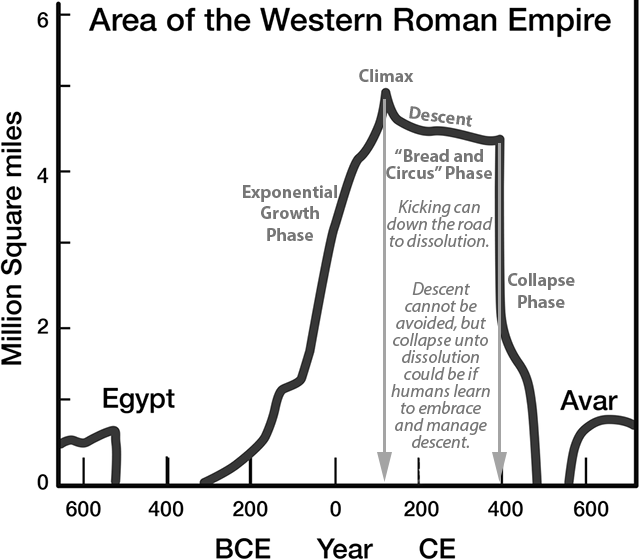
10/1/2020 Subnote to file: I read all the BBC coverage of the first US Presidential wannabe 'debate', which I did not see any of, which included summaries from the world press. I note that the Proud Boys were one of a few small far-right groups, compared to the coalition of far-left activists, and that their growth is a counter response to the Left (as is Trump) whose push for ideological supremacy started on campuses decades ago.
The Left's narrative, that everything they have had to do over the last six months was forced on them by a need to counter the far-right systemic white supremists (i.e. everyone who hasn't joined them and celebrated them and their woke narrative, their new cultural revolution) is a self-justifying just-so tale.
The only question for We the People, it seems, is will the Demagogue to Come be FAR Right or FAR Left? How about neither? Well, conflict precludes consensus, so I'll guess the Right will 'win', but if the Left, then a pox on both their houses.
The rate of growth is slowing and we will transition to increasing conflict which will increase scarcity. Post-climax, when the global growth hegemon is actually in descent, then what?
There are no political solutions nor true stories. The only way to win at playing Russian roulette is to not play the game, to not listen to political ideologues (or religious). Those who 'listen' to the narratives of Lord Man feel compelled to choose sides (BAU or BAU in sheep's clothing?).
Listen to Nature instead, to the still small voice of the what-is, as there are no two or more sides in the out-there apart from our tribal narratives which are not out-there. Those who are too stupid/ignorant to listen to Nature (as distinct from those not so stupid/ingorant as to not try) need to stand down. But they are not, cannot, and will not. They will fight to see who inherits the rubble. Don't bother choosing sides. I vote for love, peace, and understanding for which no ballot box nor guns are needed.
From five years ago:
Imagine there’s no money,
Why do we need to try?
It's what we value,
We need to wonder why.
Imagine all us hu-mans
Wanting just enough...
Imagine one’s watershed
Having enough for you.
Yet leaving room for Nature
And posterity too.
Imagine all the hu-mans
Living life in peace…
No self-serving Always Cheats;
Copykittens everyone.
Someday we’ll live properly…
We and life will be as one.
Imagine no land owners,
No Takers if you can,
A gifting economy
Where there‘s no man eat man.
Imagine all the hu-mans
Sharing this planet...
While maximizing empower
For the betterment of all.
Some say we are a cancer...
Will we kill all or love all?
1/31/2021 Subnote to file: I didn't write the following posted to a closed group and I'm not going to ask the author for permission to share. I reworked it into an outline format and each claim is to be considered based on evidence that is in front of all our faces, not who said it, which is why I'm not going to ask. I share because the following is foundational and merits consideration; but I could be wrong.
Our Predicament
Just so you can't say, 'why didn't anyone tell me?'
- Every culture or society is based on a set, or several sets, of often unarticulated but socially-constructed presumed facts, beliefs, values and assumptions (think political ideologies, religious doctrines, economic paradigms, cultural narratives, etc.).
- These complex social constructs are the conceptual filters through which society views the world; they effectively determine how people ‘act out’ in their daily lives.
- Most importantly, each socially-constructed belief set is self-referencing (as in a house of mirrors, i.e. not evidenced based).
- When a problem emerges people look into the same set of values, beliefs, facts and assumptions for the solution, and tell a consensus story based on error, ignorance, and illusion accepted by the consensus.
- Ours is a modern techno-industrial (MTI) culture that springs from belief in human exceptionalism (we are not part of nature) and a commitment to expansionistic perpetual growth based on continuous technological innovation (enabled by energy, a planetary larder of fossil fuels, to extract resources for a time) which, we assume, can overcome any natural limits forevermore.
- It is precisely this set of beliefs, values and assumptions that have generated overshoot and the resultant ecological crisis.
- Consider the enormous investment in and commitment to solar PV, wind farms, cultured meat, hydrogen, CO2 sequestration, vertical farms, 3-D printing, AI, and illimitable clever-ape technology as a fully predictable outcome of MTI belief-based self-reference.
- Previous technologies associated with industrial production have generated enormous ecological problems, so the knee-jerk inward-looking solution is to press forward with allegedly more sophisticated technology.
- Examples include the mainstream approach to the high risks of climate change –
- Wind turbines,
- Solar PV
- Hydrogen (all three being neither renewable nor green)
- Plus as yet unproven carbon-capture and storage technologies.
- In short, we automatically select various techno-approaches designed to perpetuate MTI culture, maintain growth and generate vast wealth for a select number of investors.
- Just as inevitably (as history shows), given the finite planet already in overshoot, this approach can only increase human populations and material demands, make that bigger population more dependent on continuous energy and material inputs, and, in the end, exacerbate both our ecological and social problems.
- Here’s the big thing:
- We need a new/different cultural narrative based on a collective recognition:
- That H. sapiens is part of the natural world and subject to the same fundamental laws of physics and biology as other species;
- That the human enterprise is a wholly contained sub-set of the ecosphere and that;
- Because of A and B, there are limits to energy and material throughput.
- It follows from these facts, beliefs, assumptions and values that: Humans must learn to live
- More equitably
- In vastly smaller numbers (e.g. 7 to 35 million)
- Within the biophysical means of the ecosphere and leave room for biodiversity.
- In the case of our energy and resource longage of demand,
- A much reduced human population (which will be achieved one way or another)
- Could live on locally-raised grass-fed livestock, free-ranging pork, chickens, etc., and crops as part of an agroecosystem none of which would require extraordinarily extra water or material inputs and would actually maintain and fertilize the landscape.
- But only in vastly smaller numbers living within the biophysical limits of their region, e.g. in WMUs (Watershed Management Units of 20 to 50 communities of 20 to 50 members each).
- But in any details, the future is unforeseeable, though trajectories are foreseeable.
- MTI society may persist into the 22nd century.
- China, famed for all the solar panels it is installing and providing the world with, is also building many small-scale nuclear power plants because they realize that energy is the wealth of nations (for a time, which they may well admit, but ignore the implementations as they too are posterity blind).
- As energy becomes scarce elsewhere, coastal cities may come to serve China by allowing what looks like a cargo ship, but carries only a nuclear power plant, to dock and supply them with nuclear power (for a time).
- Or the MTI form of civilization (overcomplex society) will not persist.
- MTI society may persist into the 22nd century.
- There may be no high-tech inputs, no concern for supply lines, no pollution etc., given a much reduced human population and level of per capita consumption.
- Point: the world community needs to look elsewhere for solutions to MTI problems (outside the MTI box, to use an old term) if we are ever to become renormalized evolvable subsystems of Gaia living sustainably on this one and only Earth.
'It has often been said that, if the human species fails to make a go of it here on the Earth, some other species will take over the running. In the sense of developing intelligence, this is not correct. We have or soon will have, exhausted the necessary physical prerequisites so far as this planet is concerned. With coal gone, oil gone, high-grade metallic ores gone, no species however competent can make the long climb from primitive conditions to high-level technology. This is a one-shot affair. If we fail, this planetary system fails so far as intelligence is concerned. The same will be true of other planetary systems. On each of them, there will be one chance and one chance only.' —Sir Fred Hoyle, 1964. The Great Acceleration started about 1950. Some were paying attention and asking, "And then what?"
'For the first time in history a conviction has developed among those who can actually think more than a decade ahead that we are playing a global endgame. Humanity's grasp on the planet is not strong. It is growing weaker. Our population is too large....' — Edward O. Wilson, Half Earth: Our Planet's Fight for Life 2016
'Our pretense to "manage" nature fails because the presumed managers do not yet know how natural systems actually work, and if they did they would not be talking about managing nature at all. Genuine solutions will derive from whole-systems awareness, from becoming students of nature [who listen], not managers. We cannot solve or even alleviate any symptom of ecological overshoot in isolation from the other symptoms, or without addressing the root problem [of overshoot].'' — Rex Weyler, Ecology? Look it up! You're still involved.
'I have striven not to laugh at human actions, not to weep at them, nor to hate them, but to understand them.' —Baruch Spinoza, for to understand something is to be delivered from it. That is why we strive to not be distracted.
OUR EXCALIBUR: 'The widespread acceptance of such credos [beliefs] as creationism, astrology and sustainable economic growth gives adequate warning that the fraction of the population capable of applying even the most basic rules of evidence to mystically derived information [belief-based claims] is so small as to be inconsequential [0.01% - 0.001% of humans]. It means also that the most seductive and dangerous forms of mysticism [belief-based certitudes], those that underpin racism and religious fundamentalism [and political ideology/verities], are totally bullet proof.
By selectively preserving the mystics [true believers] among our hominid ancestors evolution not only gave us the weapon that would catapult us from obsolescence to world domination [via technology enabled diversion of energy/matter flows], it seems also to have taken out a shrewd insurance against our overwhelming success. Only such a deliciously rewarding and tamper-proof device as mysticism [our belief in belief] could have prevented us from foreseeing the danger of overpopulation a long, long time ago....
We may not be able to hurl our Excalibur back into the gene pool from whence it came, but we owe it to our children to lower our shining weapon for a moment or two so that we might gaze just once with undazzled eyes upon this ailing Camelot of ours.' —Reg Morrison (from The Spirit in the Gene, 1999)
SUBNOTE TO FILE 4/26/23
Ecological Civilization
From emergency to emergence
by David Korten
This is a Club of Rome offering from Nov. 2021 that I should consider (maybe), but first guess was it is from what should be renamed the New Club of Rome centered on Jørgen Randers and Earth4All fellow travelers. A minute of Google time suggests my guess is correct, which given the other offerings from Earth4All is a red flag. In 2016, Randers was certain that world population would peak in 2040 at 8 billion people. Now those who follow him are certain it will climax at 8.8 billion people in 2050.
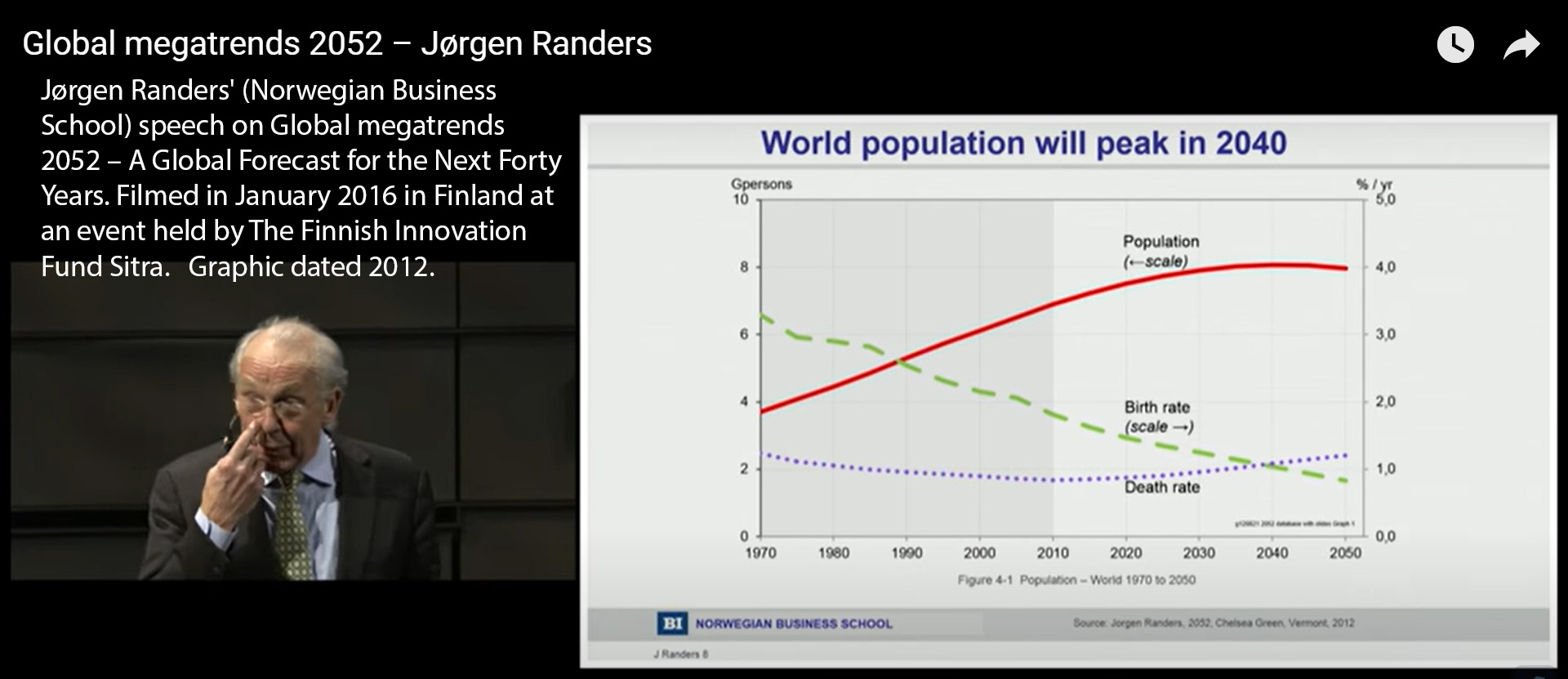
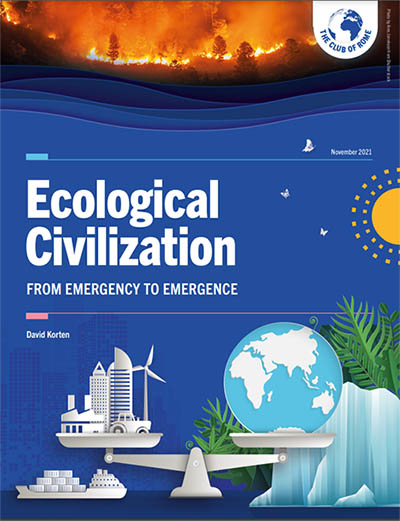 So, no big surprise that Korten (co-founder of YES!Media, engaged citizen) looks like more of the same. The PDF initially looks like a book with cover and Table of Contents, but is 25 pages total. There is an intro 'background' beginning:
So, no big surprise that Korten (co-founder of YES!Media, engaged citizen) looks like more of the same. The PDF initially looks like a book with cover and Table of Contents, but is 25 pages total. There is an intro 'background' beginning:
This is a personal white paper directed to those who seek a future that works for all of Earth’s people and other beings.
It weaves together threads of ongoing conversations with global colleagues in which I am privileged to participate.
These conversations build from a simple, self-evident insight that carries profound implications for all that we do and seek to be.
Life exists only in communities of living organisms that self-organize to create and maintain the conditions essential to their individual and mutual existence.
Each organism requires a map—partly genetic and partly learned—to guide it in making choices consistent with the territory in which it lives. Most such choices require physical exertion—call it labor. We decide when and what to eat and then act to source it. With whom to mate and then win them over. Whom to protect against and then fight, flee, or hide. When to find shelter and then act to acquire it. And so much more.
Humans are Earth’s ultimate choice-making species. Our decisions have defining consequences for the whole of Earth’s community of life. Relying on the defective maps of an ego-nomics that denies our true nature, our choices have potentially terminal consequences for ourselves and Earth that we have for too long ignored or actively denied.
Continued human viability depends on Emergency action to stop the damage, facilitate Earth’s healing, and advance the Emergence of an Ecological Civilization. Successful navigation of the essential transition requires the maps of an eco-nomics to guide us in fulfilling our essential needs while simultaneously fulfilling the distinctive responsibilities of humans within Earth’s community of life.
This paper draws from the work and insights of many colleagues and organizations. Credit is shared. Responsibility for shortcomings is mine. Apologies to the many who contributed but remain unnamed.
So, why is this all I need to read? It falls into Wolfgang Pauli's 'not even wrong' category. All the words are about as fine a set of words as a loquacious primate could utter, but the words reference other words/concepts in a house of mirrors sort of way that may give a lovely sight to some, but is without Philip Morrison's 'ring of truth'.
How will all Anthropocene enthusiasts read Korten’s words? I can but rewrite the words, but I cannot tell the enthusiasts what they want to hear:
This is a personal white paper directed to those who seek a future that works for all of Earth’s people, i.e. all modern techno-industrialized humans, and given that it will work for us all, they will readily agree that the future will favor all other beings, unlike over the past 50k years (e.g. megafauna extinctions to Anthropocene mass extinction event we are presiding over that may rival that of the Permian).
It weaves together threads of ongoing conversations with global storytellers in which I am privileged to participate (we listen to one another, never to Nature).
These conversations build from a simple, self-evident insight that carries profound implications for all that we do and seek to be. As H.L. Mencken noted, "For every complex problem, there's a solution that is simple, neat, and wrong."
Life exists only in communities as subsystems of Gaia that self-organize to persist by maximizing the power of the world system without destroying it. Animals like us do not create and maintain the conditions essential to their individual and mutual existence, they adapt, evolve, or die-off.
Each organism requires a genetic map (and for some a memetic map storing learned information that is adaptive) to guide it in making responses (no consciousness, agency, or intent implied) consistent with the environment it is a subsystem of. Responses require physical exertion, energy.—call it labor. We eat to persist and die without enough food energy. Solar emjoules are the source, not us nor 'our' fossil fuels. We can guess then test. We mate perhaps with good intent, see what happens, and Nature selects for what persists. We don't get a vote. We protect some, destroy others, we fight, flee, or hide and some may persist and others not.
Humans are Earth’s ultimate storytelling animal as self-assessed. Some cetatians learn a hundred or more words of our language, and humans have learned zero of theirs, and corvids likely see us as underestimating them. Our decisions have defining consequences within our concept forming minds. Relying on the defective maps of an ego-nomics that denies our true nature (and all other human centric primate prattle based firmly on a foundation of error, ignorance, and illusion) have potentially terminal consequences for ourselves and Earth that we have for too long ignored or actively denied.
Continued human viability depends on listening to Nature who has all the answers to what persists. We prattling political animals must go extinct to allow for some humans to renormalize as adaptive K-strategists living again as evolvable subsystems of Gaia. We modern techno-industrial expansionist humans cannot facilitate Earth’s healing as we are the Anthropocene. We hubris ones must stand down and rapidly contract our population and economic activities, yet make some form of complex society (Ecological Civilization) work to manage human demands on Nature's resources to leave room for Nature. Successful navigation of the essential transition requires a paradigm shift from the expansionist culture of the last 50k years we moderns are products of, to a K-strategist form of hominin we were the 'displacers' of.
This paper draws from the still small voice of data Nature speaks to us in. Humans who endeavor to listen to Nature are to consider, but no one speaks for Nature. Listen to Nature. 'To think is to listen. Listen.'

Kogi, remnant Tairona, are the only humans to live in an ecological civilization.
Their ancestors were expansionists, just like everyone who is not San or Hadza.
After two civilizational collapse events, they endeavored to renormalize.
They are not modern techno-industrialized humans of NIMH.
I haven't got around to reading the rest. I did do a search for 'population' and noted the context of the five usages, e.g. "In earlier times, human population growth was checked by famine, disease, and large mammals."
Early times would be the over 6 million years of hominin life prior to the emergence of the invasive, expansionist form of modern humans when hominins lived as K-strategists as had their ancestors for 500 million years. K-strategists, e.g. rats and humans, do not depend on their populations being controled by famine, disease, and predation.
John B. Calhoun's first experiment involved wild Norway rats, presumably full function normal K-strategist rats (not rats of NIMH) who had never been subject to overdensity living and loss of functional behaviors, and thus avoided overdensity population overshoot. Doing so is adaptive and has been selected for (in rats who have been a eusocial species far longer than humans who are not as highly evolved). Calhoun released five female rats and enough males in a 10,800-square-foot (1000 m2) outdoor pen with predator exclosure and supplied them with illimitable (to them) food and water and such necessities as Calhoun (he wasn't a rat, so what would he know?) thought to provide. He observed them over a 28-month period starting in 1947 (Calhoun retired from NIMH in 1984 but continued to study his data until he couldn't as he had a life-driven purpose to do so).
Per Calhoun's best guess their population could have theoretically grown to 5,000 rats in the enclosure, but didn't. Their population climaxed at about 200 and then stabilized at around 150. As noted, these were normal Norway rats with culture/behavioral repertoire intact. They did not disperse evenly about the enclosure as individuals, but self-organized into twelve or thirteen colonies of about 12 rats each. The Dunbar number for Norway rats is about 12, and the maximum viable colony density was about 12-13 for the size of area they inhabited. Humans differ. Our Dunbar number is about 150, the maximum viable band size (though optimal is in the 20 to 50 range). Normal humans, most of our ancestors for the last 375k years (until recently, over the last 50k years), maintained a viable population density and numbers within a biome as fully functional K-strategists.
How did we reduce fertility in a GAS (General Adaptation Syndrome) response to stressors of too many, not enough habitate, too little abundance of food? We didn’t, women did. Theyt nursed longer than the usual 3 to 5 years. Normal women (my wife breast feed our child but started ovulating anyway) do not ovulate while nursing. Fewer offspring reduces stress, and nursing less than 3 to 5 years increases fertility and population. We modern techno-industrialized humans of NIMH were not normal, nor are normal K-strategists like us.
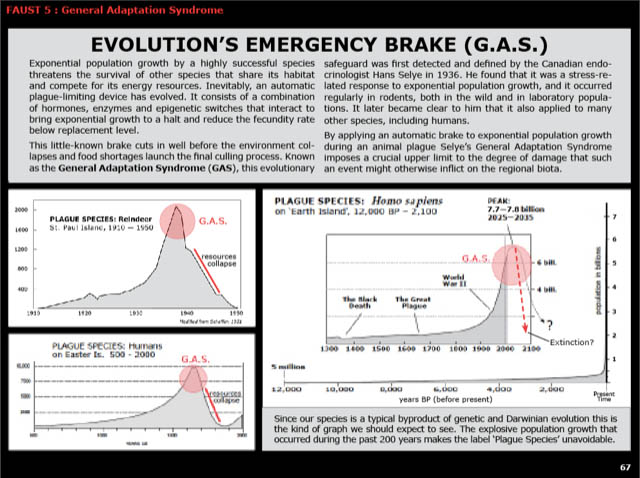
There is a limit to the number of rats in a viable colony, and a limit to the density of colonies, beyond which the colonies become too close together resulting in increasing stress just as beyond 12 rats/colony, more rats in a colony increases stress to a non-viable level. Stress is the limiter in populations of normal functional rats and mice, beyond which conflict-based and disease-based mortality, and decreased fertility limit population (not the education and political empowering of female rats). 'Choosing' to not have children or marrying a hologram is not normal human behavior as viewed by our ancestors of the past 500 thousand years (or earlier).
Our problem is that we are not normal humans living on the veldt. Clever ape humans of NIMH we are and our technology and ability to concentrate energy flows (e.g. agriculture, use of horses, canoes) and living in overdensity populations (for a time) has grown in recent millennia. We who are pathogens living the pathogenic life cannot naturally limit what is already long into overshoot (a majority of humans were living unsustainably within an empire, from chiefdom to state level, when our global population exceeded about 35 million 3k-4k years ago).
We humans of NIMH are so denormalized as to be unable to even imagine living like normal animals of the K-strategist type (we will never be r-strategists, but renormalizing as K-strategists may be possilbe, extinction also being possible).

